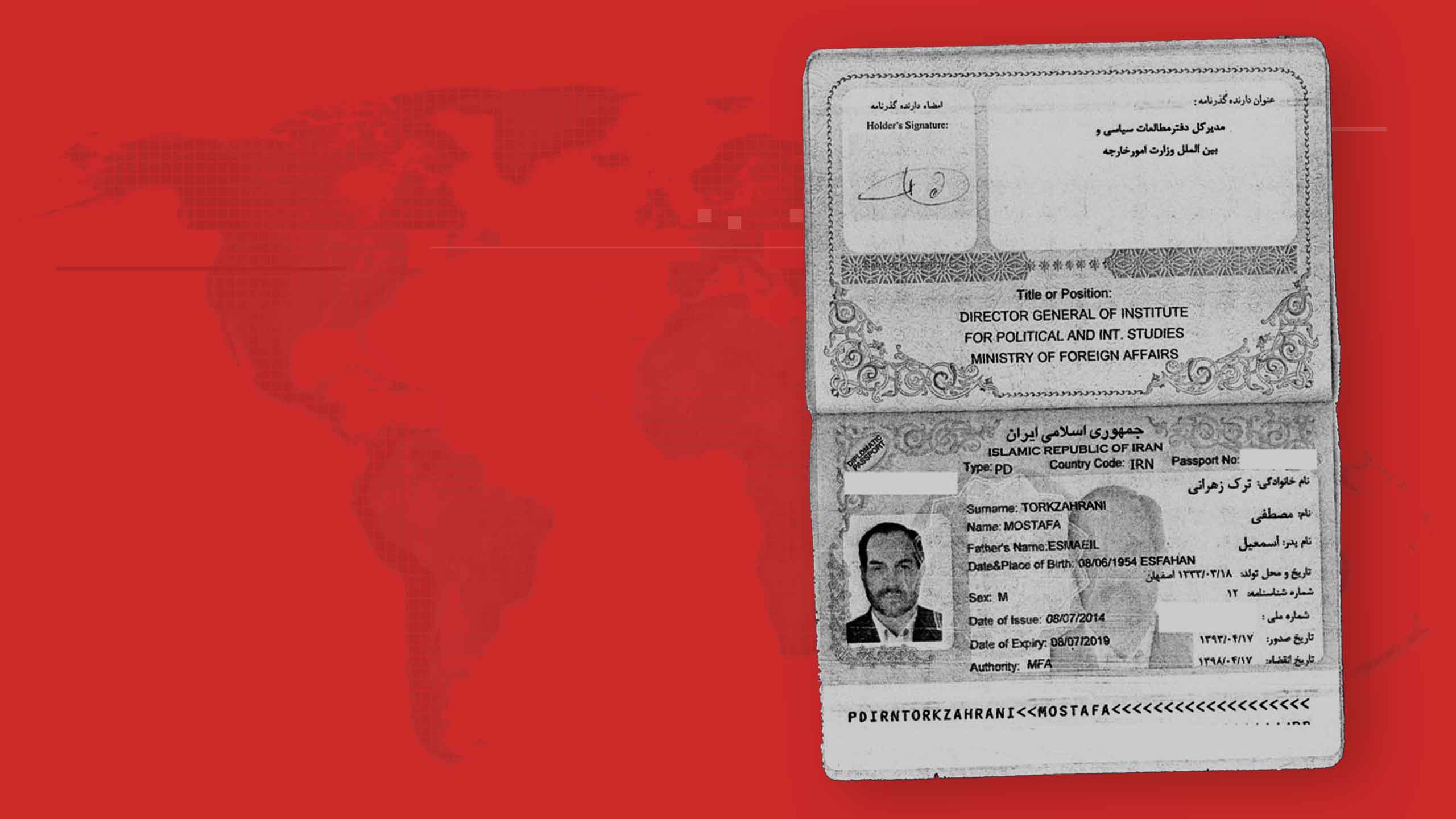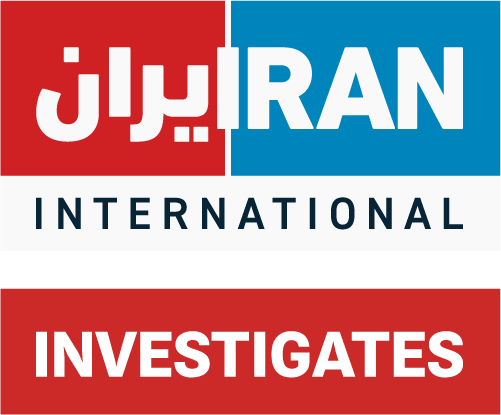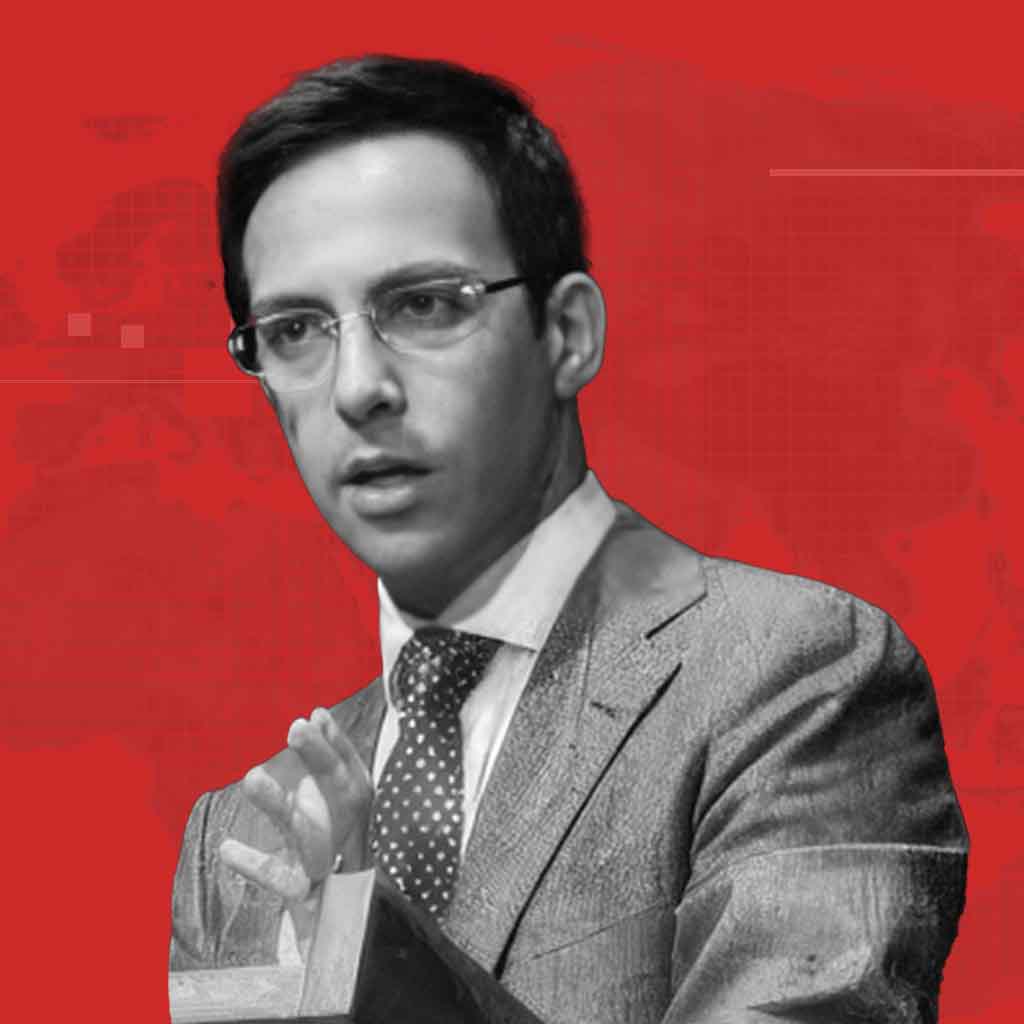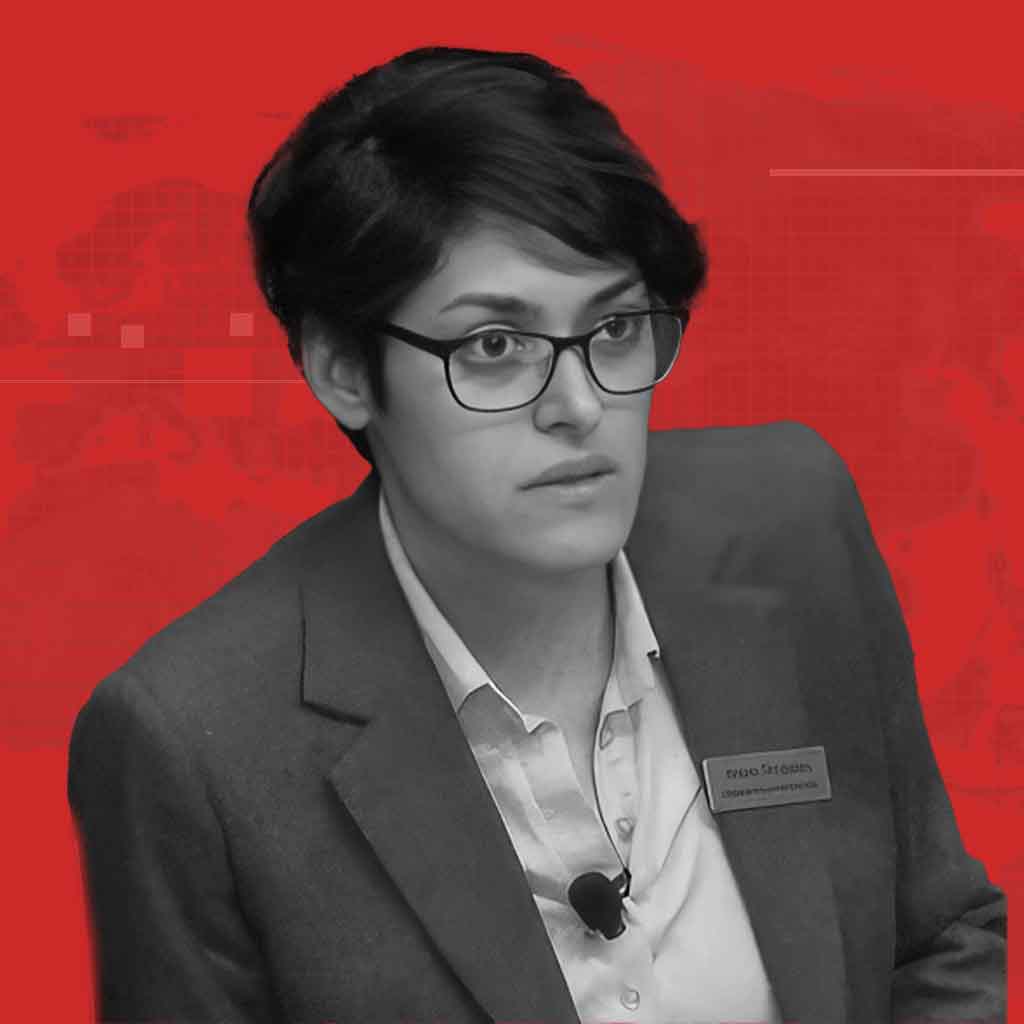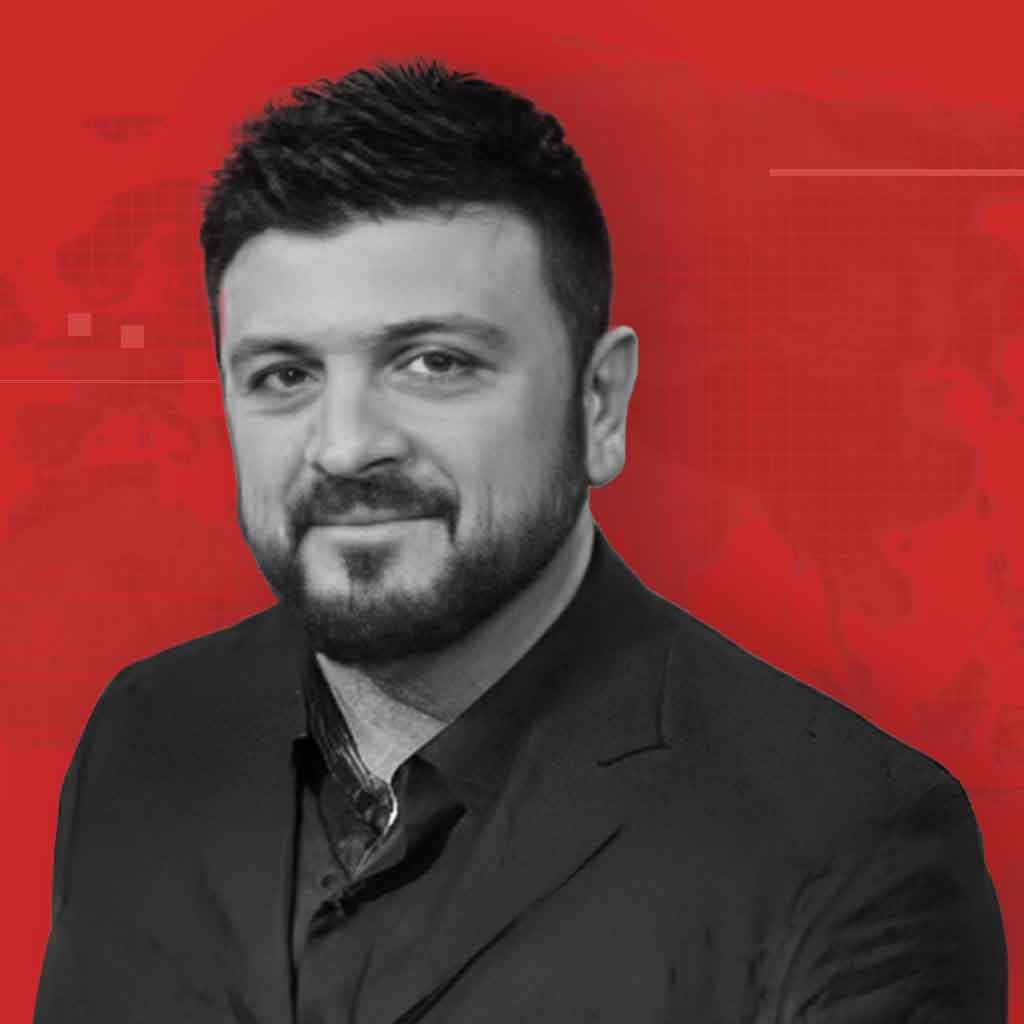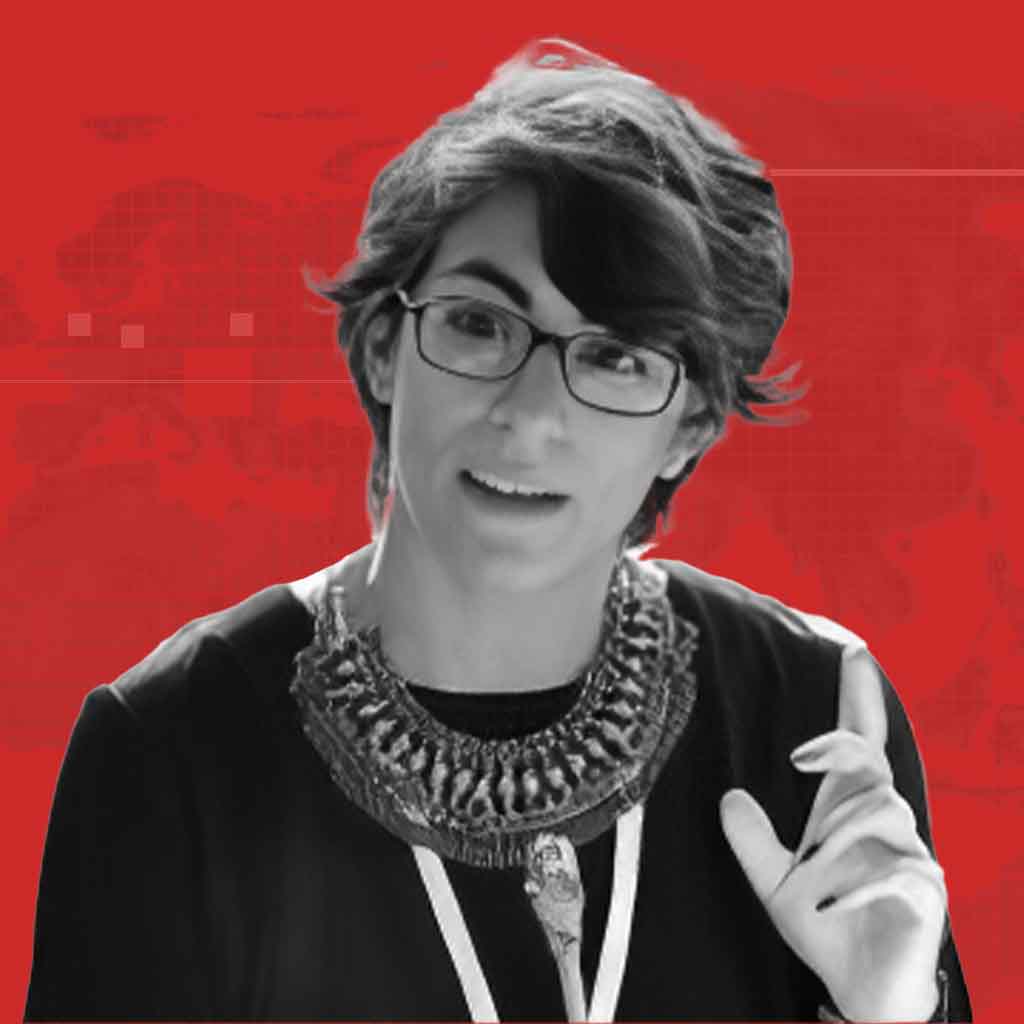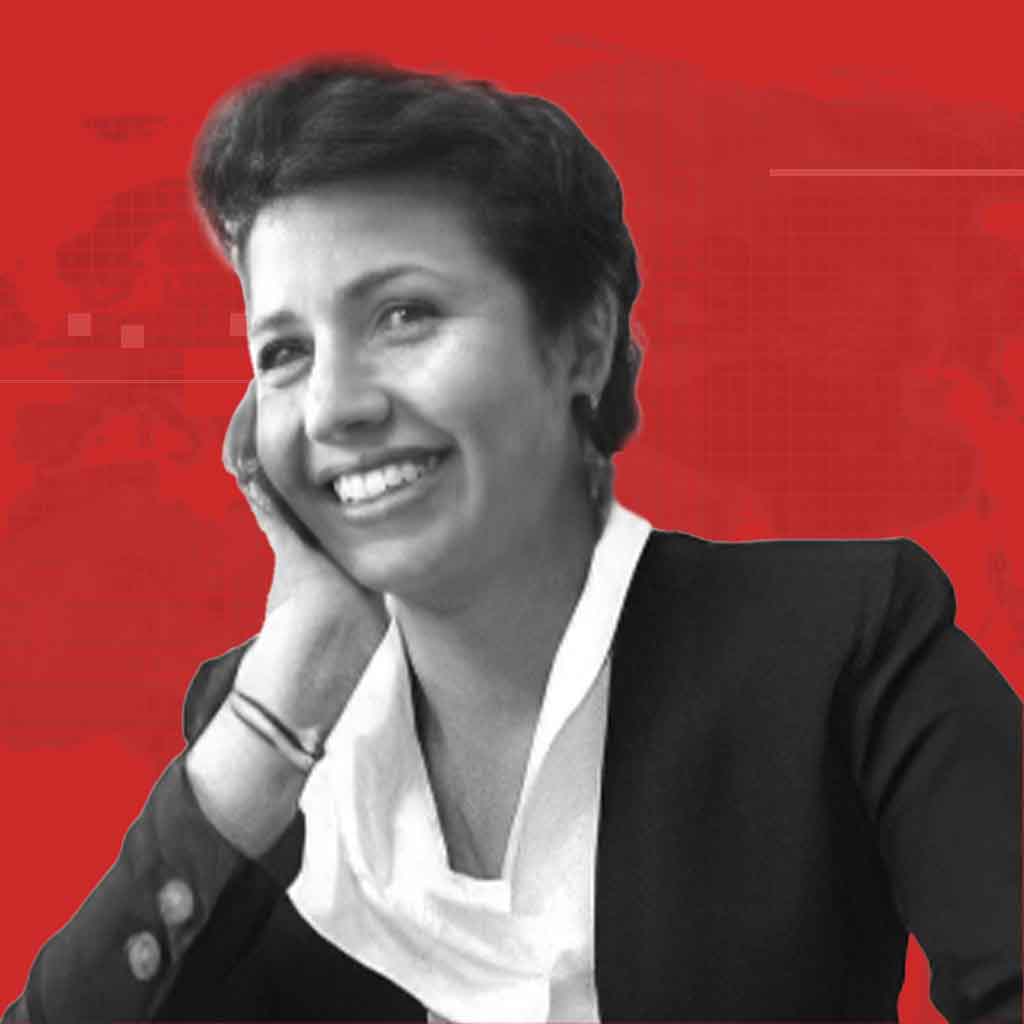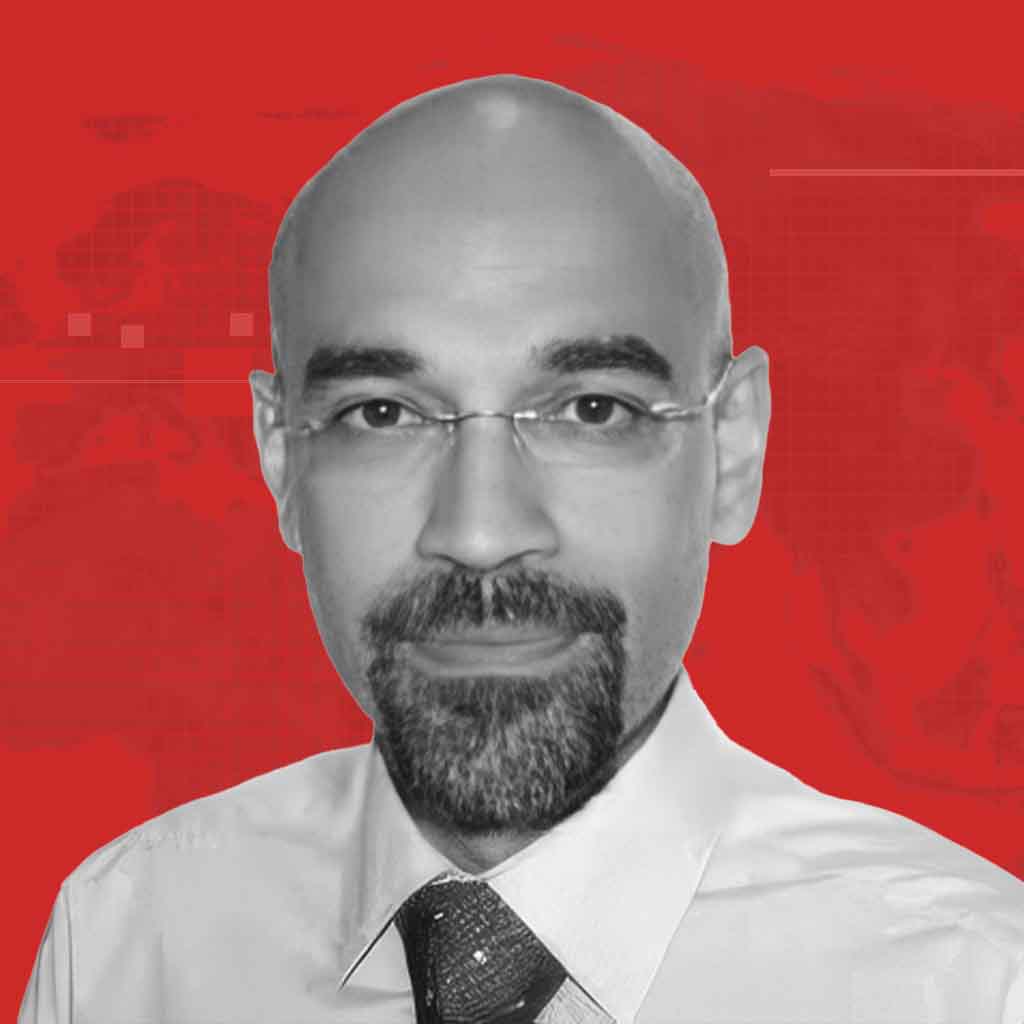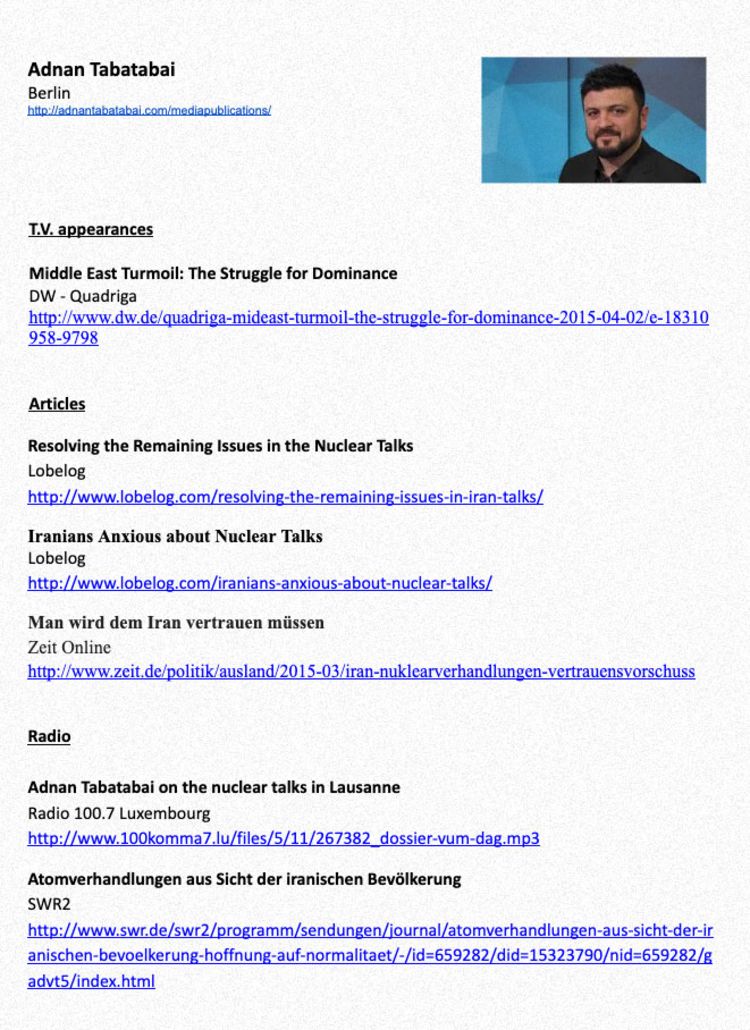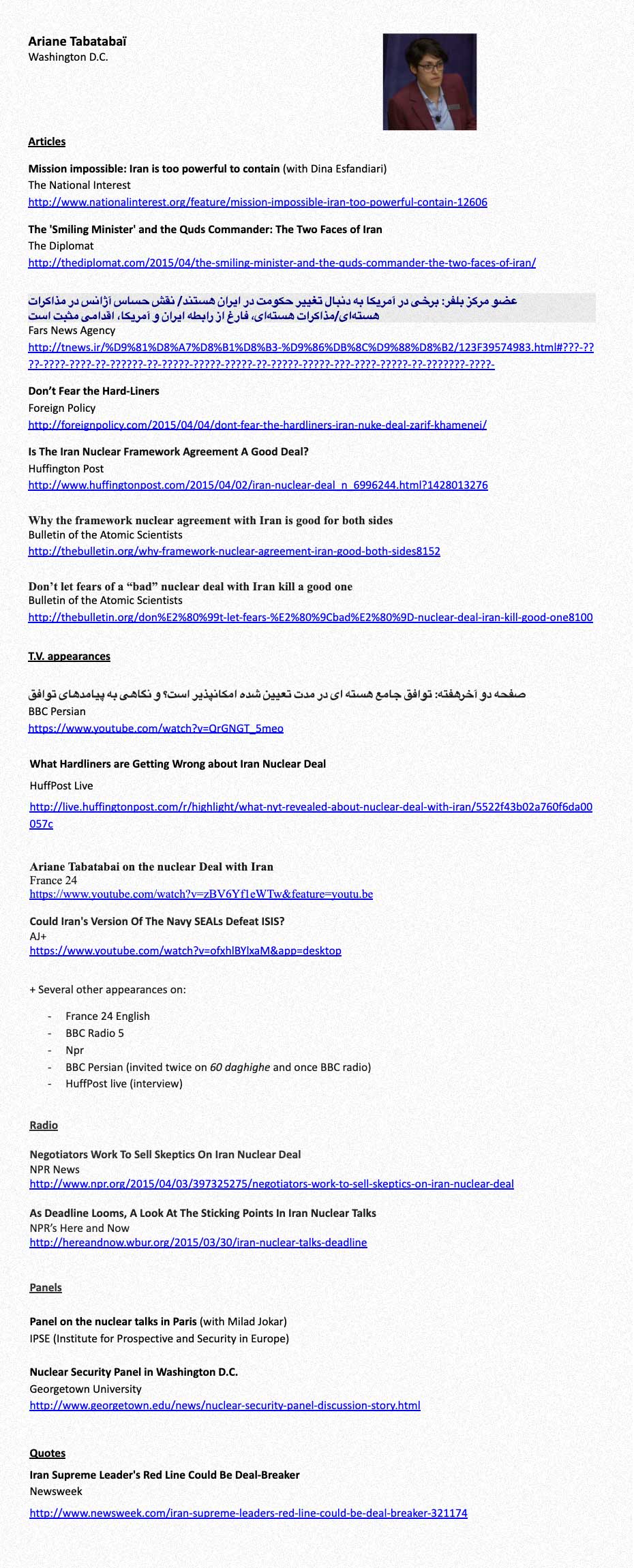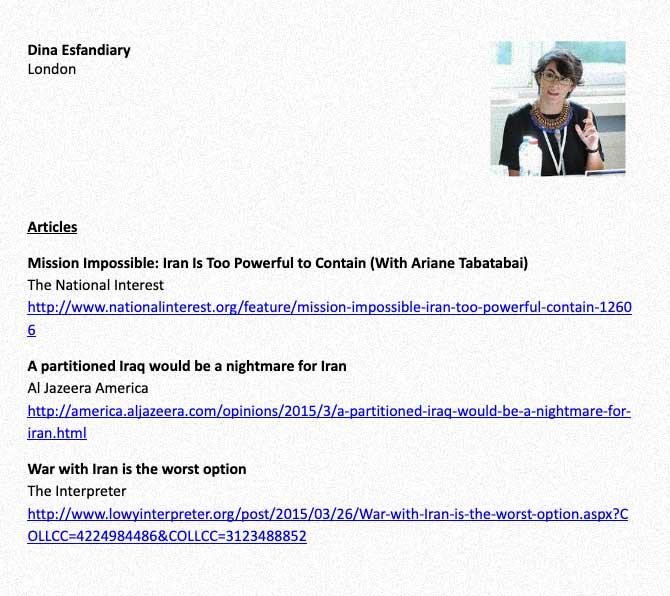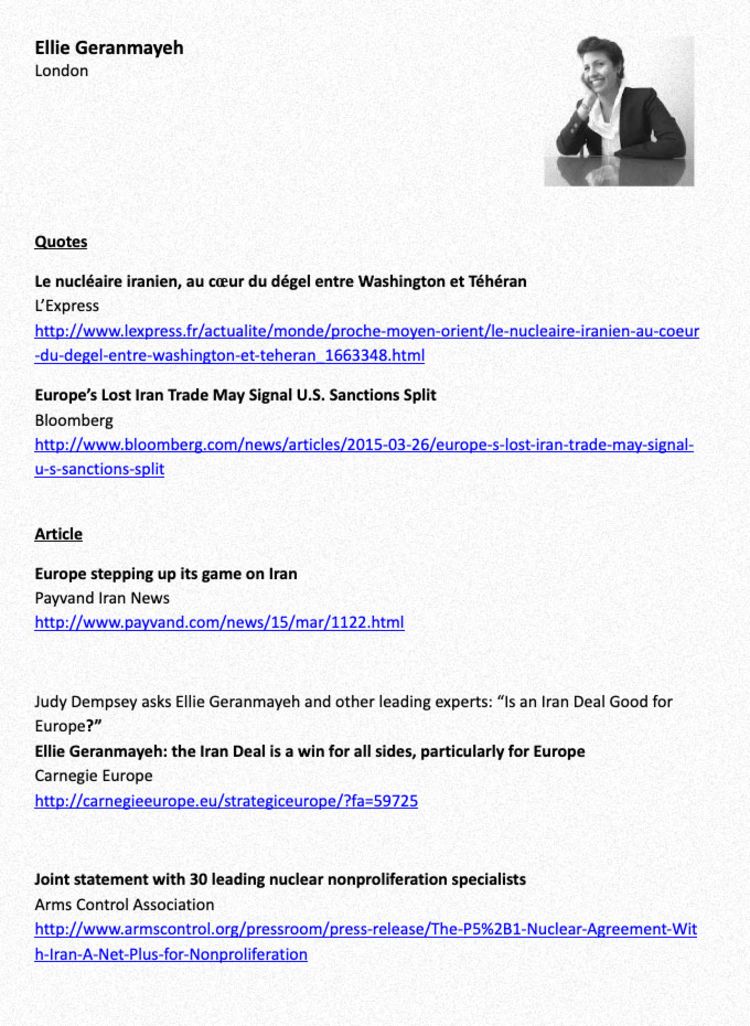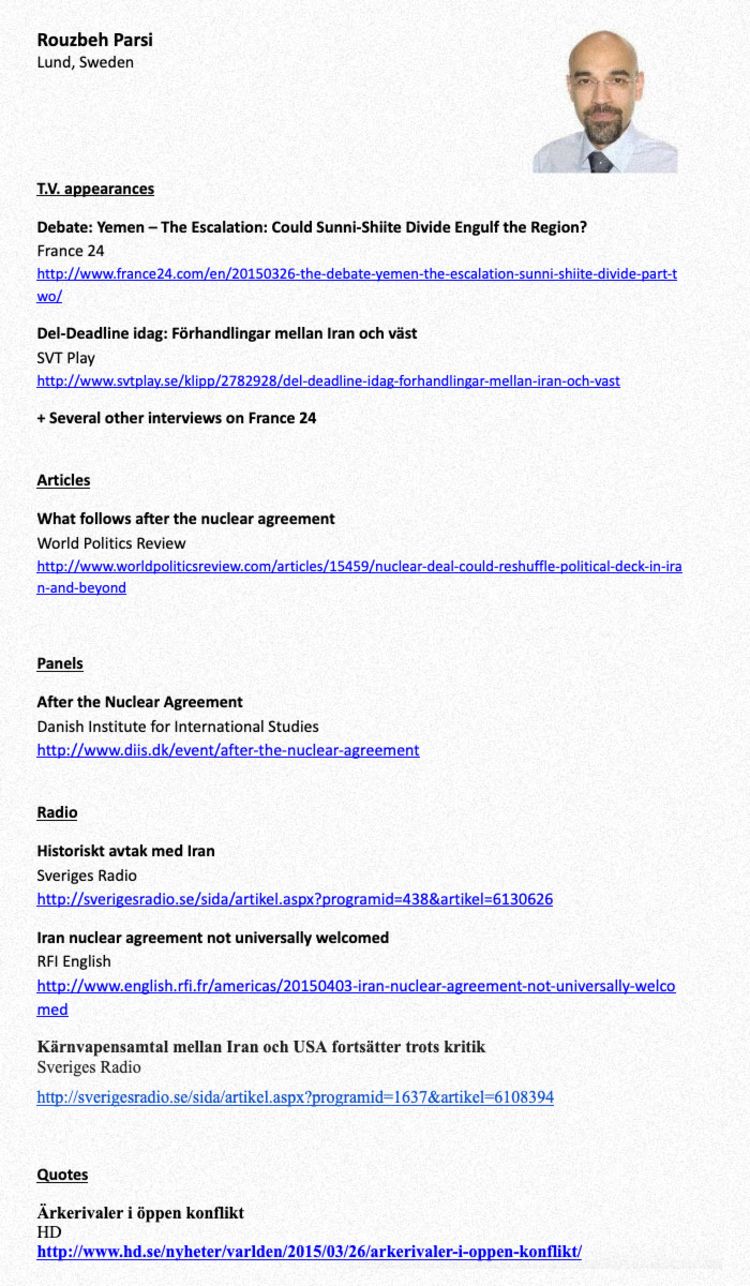Inside Tehran’s Soft War
How Iran Gained Influence In US Policy Centers
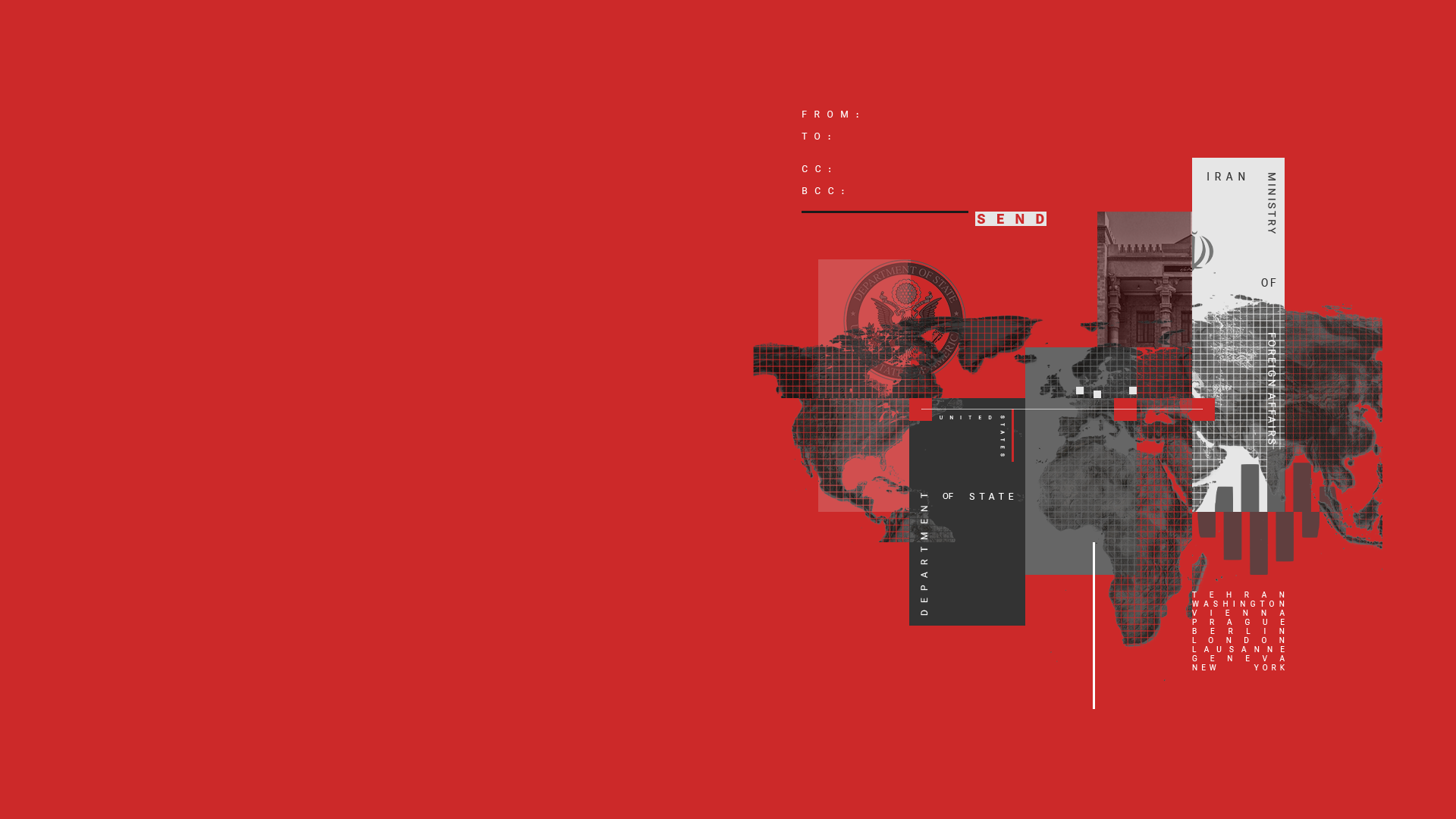
● Three aides of Robert Malley, Biden's special envoy for Iran, were part of an Iranian government network
● The Iran Experts Initiative (IEI) was established by the Iranian foreign ministry in 2014 to extend Tehran's soft power
● The IEI members simultaneously worked for top Western think tanks and gave advice to US and Europe
● The joint reporting project with Semafor is based on thousands of emails from Iranian diplomats
Three Iran experts who have worked closely with Robert Malley, the Biden administration’s special envoy on Iran, were members of an influence network formed and guided by Tehran, an investigation by Iran International shows.
The investigation was based on thousands of emails between Iranian diplomats and analysts obtained by Iran International, which shared them with Semafor. The two organizations jointly reported parts of this story together, and wrote and published their stories independently.
Malley has spent the past decade in and out of government, at times occupying crucial diplomatic posts. In between those stints, he has held a perch at the International Crisis Group, a major think tank. Of the three Iran experts, one of them worked for him at the State Department, one worked for him at the ICG and was an unofficial adviser when Malley was in government, and one worked for him only at the ICG.
Malley was put on leave in June, following the suspension of his security clearance amid an ongoing investigation. The exact cause of his suspension remains unclear.
This investigation offers new insights into internal operations of Iran's foreign ministry, especially during 2015 nuclear negotiations with world powers, and highlights the extent of Tehran’s campaign to gain influence in Washington and other Western capitals.
Documents reviewed by Iran International show the Iranian foreign ministry in 2014 initiated a network of overseas academics and researchers - called the Iran Experts Initiative (IEI) - to increase its influence on the global stage.
This is the first time the role of the IEI - which is also referred to as "the youth network" by Iranian diplomats - has been revealed.
President Bident named Malley to be his special envoy for Iran in 2021. Malley had previously served as a top diplomat in the President Obama administration. He helped to negotiate a 2015 landmark nuclear deal with Iran, the Joint Comprehensive Plan of Action, or JCPOA. The accord, which aimed to curb Iran's nuclear activities, was abandoned by President Trump, who branded it as the worst deal ever and reinstated crippling sanctions on the Islamic Republic.
In February 2021, less than a month after his appointment as the Iran special envoy, Malley recruited Ariane Tabatabai, then the Middle East fellow at the German Marshall Fund of the United States, for his State Department team to assist in negotiations with Iran. She served in that position for almost 15 months.
Malley also sought to appoint Ali Vaez, the Iran Project Director at the Crisis Group, to the government, but Vaez encountered an obstacle. According to two sources familiar with the situation and a former colleague - all of whom requested anonymity - Vaez could not obtain the necessary security clearance, leading to the cancellation of his expected appointment.
Despite this, Malley was undeterred, maintaining Vaez as a confidant. Until recently, according to two people familiar with the situation, Vaez drafted Malley’s tweets.
Although Malley viewed Tabatabai and Vaez as his trusted advisers, the investigation shows that the two analysts had undisclosed affiliations with the IEI.
Another Iran analyst, Dina Esfandiary, who was hired by Malley at the ICG in early 2021, was also a part of the IEI, according to the documents.
US State Department spokesman Matt Miller told Iran International that the Biden administration appointed Ariane Tabatabai to serve various roles in the United States government “because of her expertise on nuclear and other foreign policy issues”, and they were “honored to have her serve.”
Miller also said that they will not comment on “purported leaked Iranian government documents.”
Vaez’s and Esfandiary’s current employer, the ICG, said the Iranian government did not direct the research of their staff.
Malley did not respond to the request for comment. Another State Department spokesperson said “Rob Malley remains on leave. We have nothing further to share at this time due to privacy considerations.”
The emails, spanning from 2003 to 2021, were part of a trove of thousands belonging to Mostafa Zahrani, former director general of strategic affairs in the foreign ministry and advisor to former Iranian Foreign Minister Mohammad Javad Zarif.
The emails included passport copies, resumes, invitations to conferences, airplane tickets, visa applications, payment receipts, academic articles, and extensive correspondence with foreign ministry officials, university staff, and students, all of which helped in verifying their authenticity.
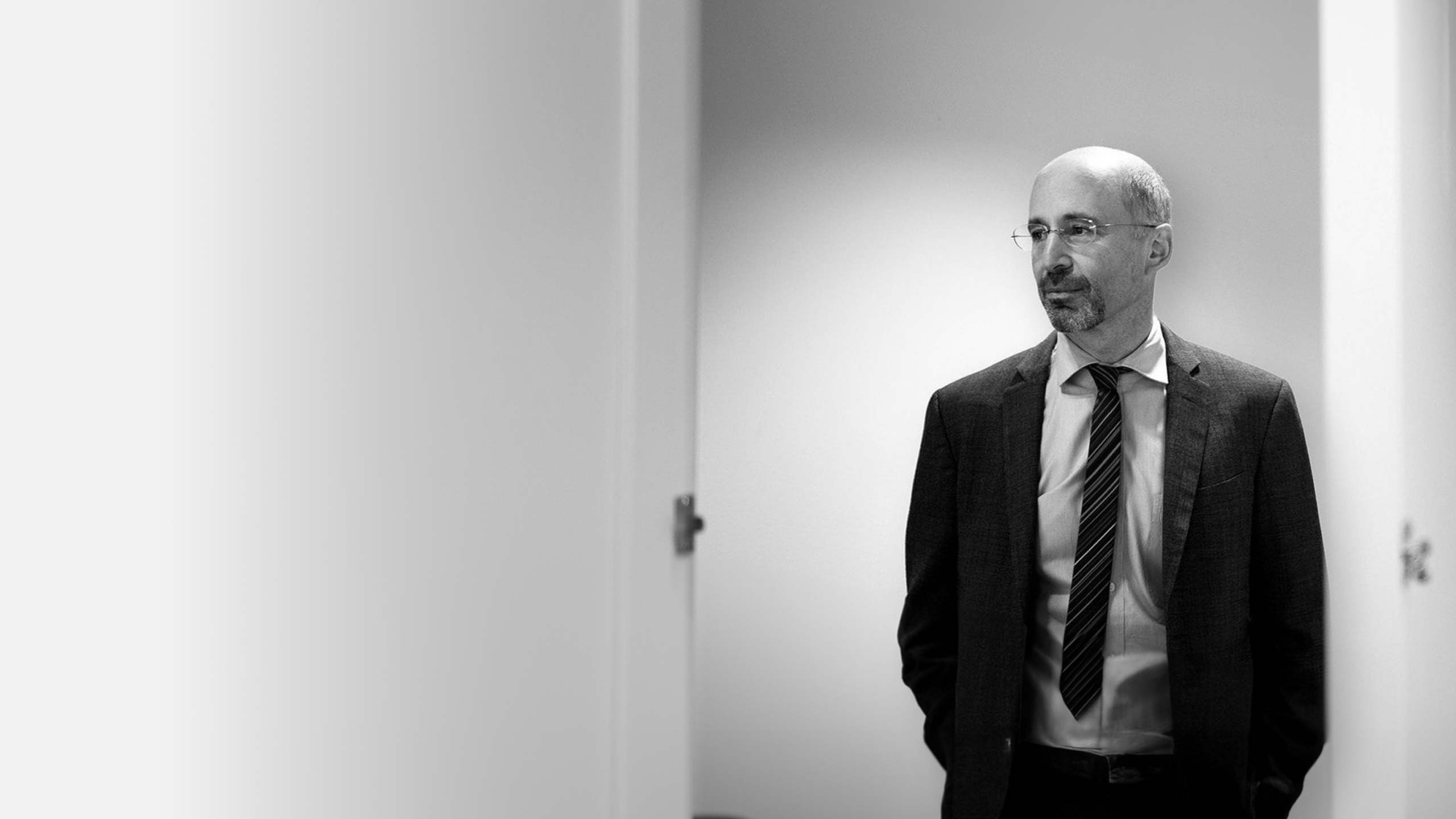
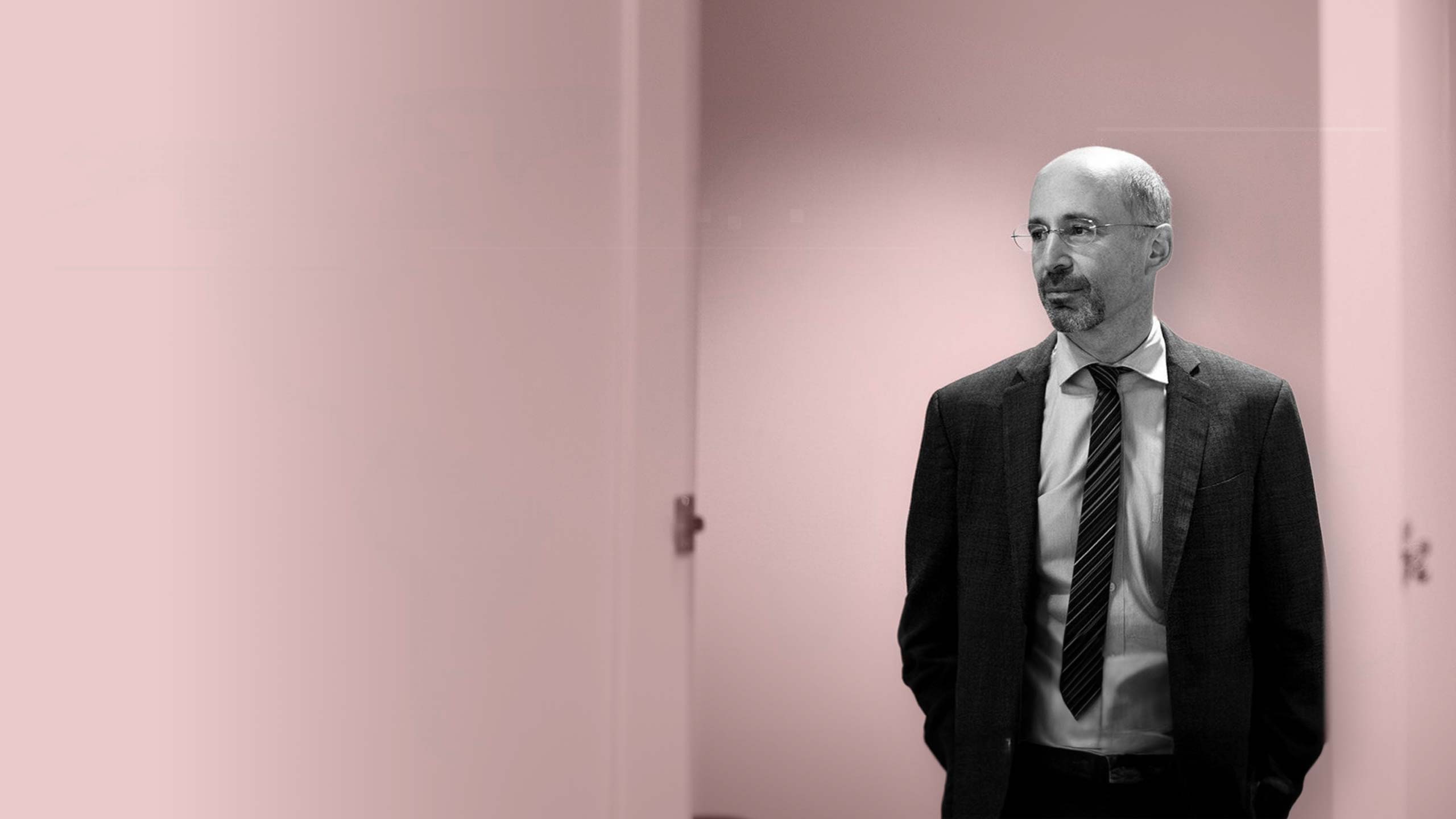
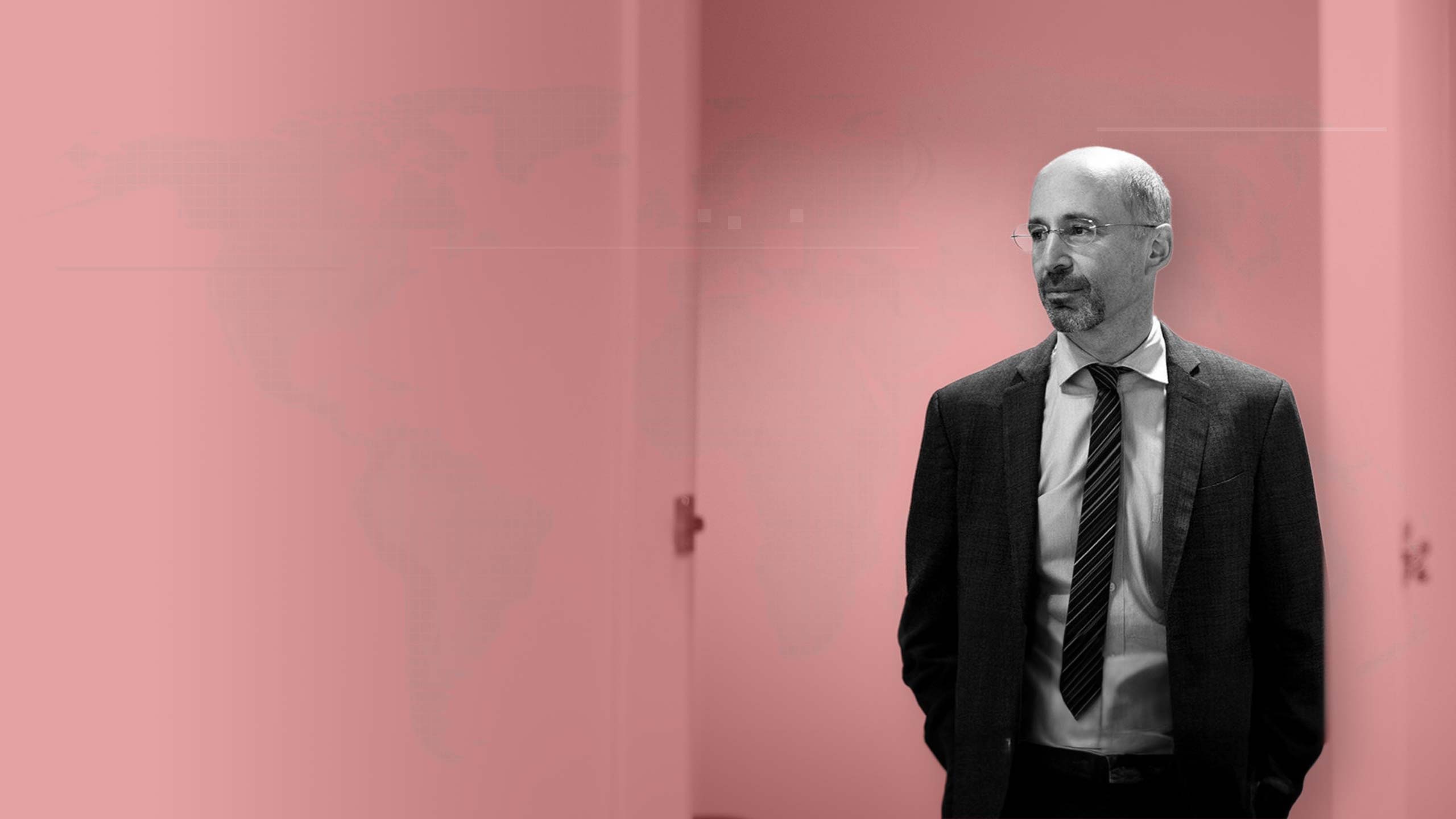
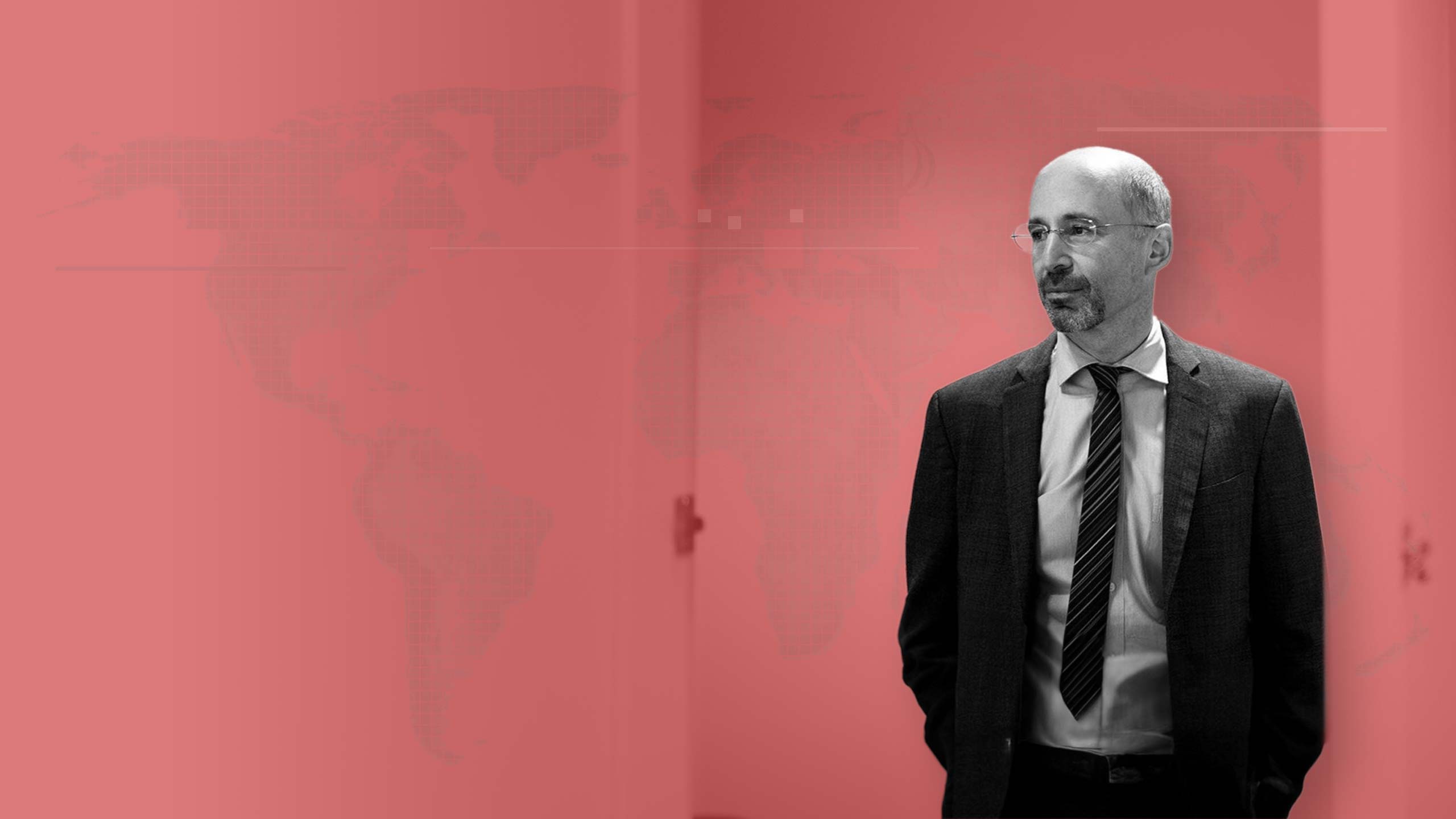
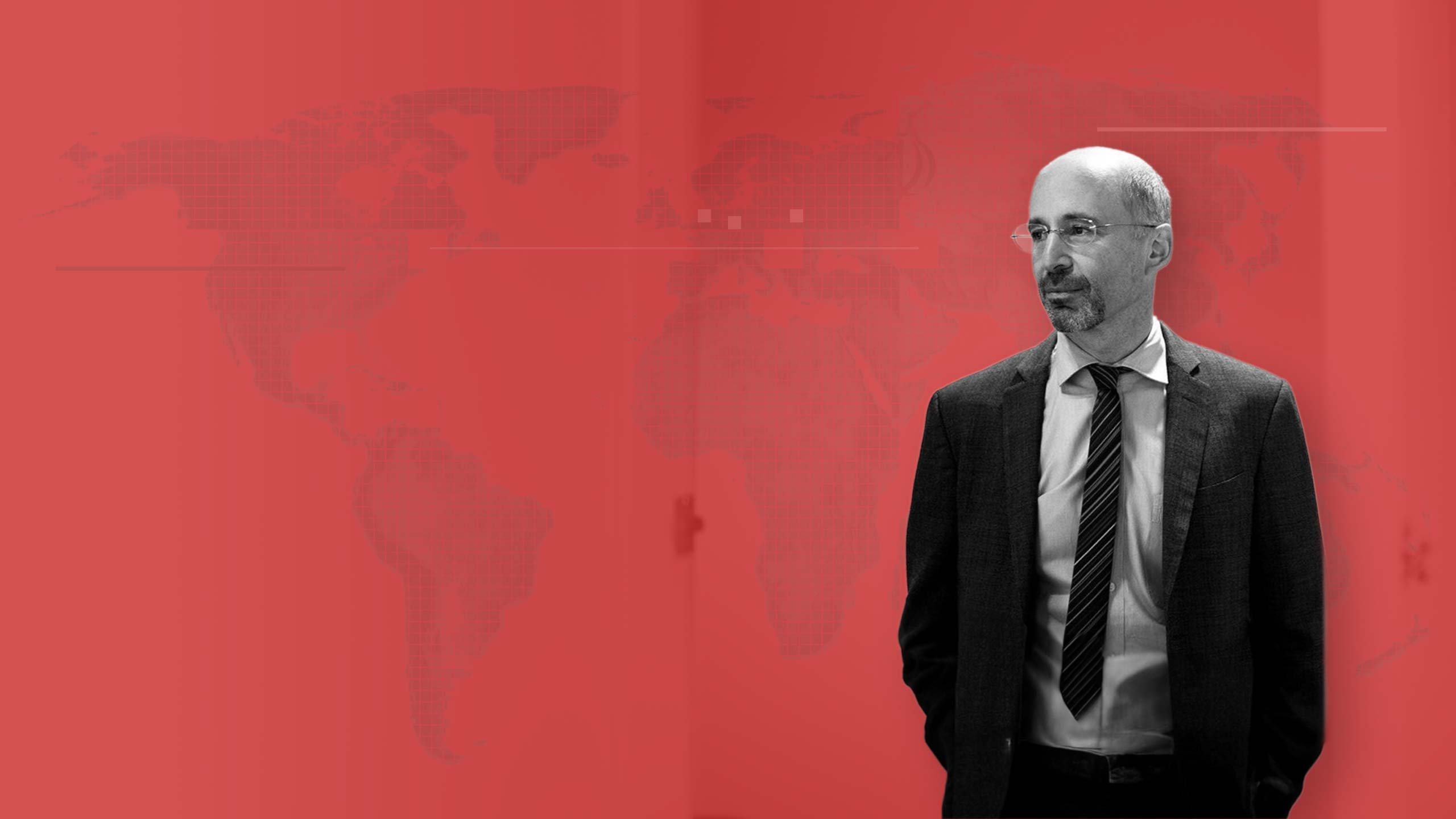
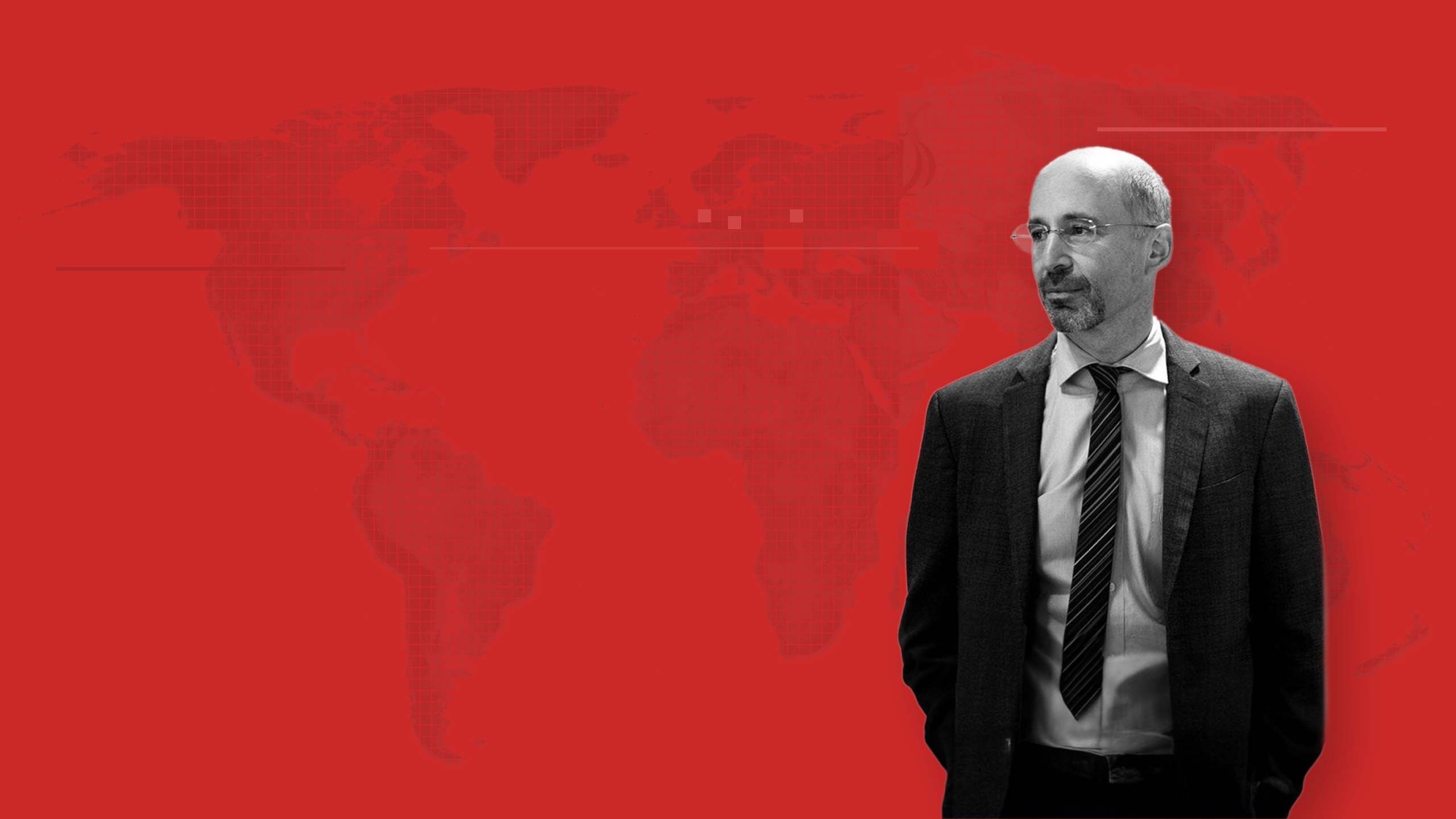
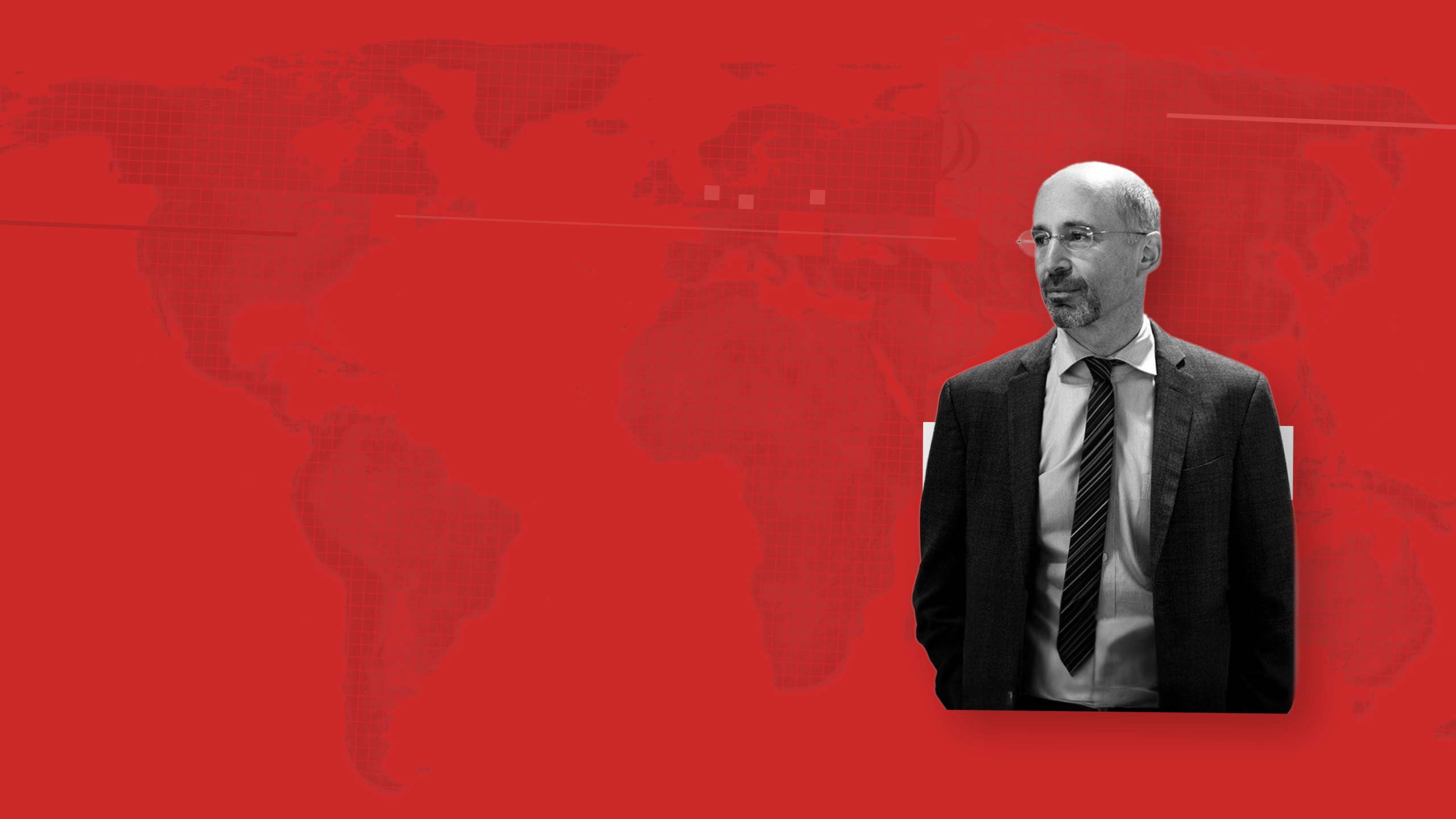
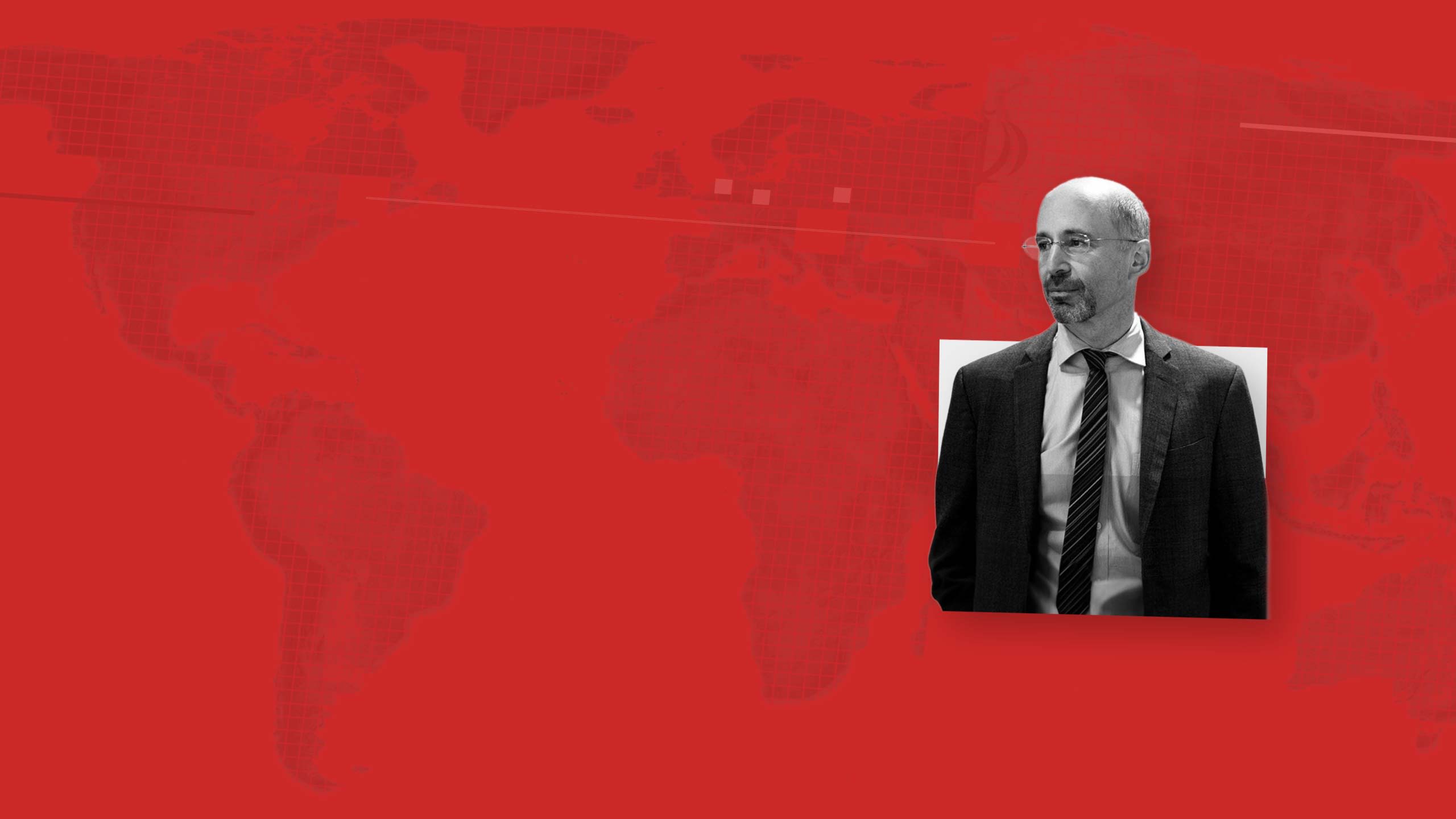
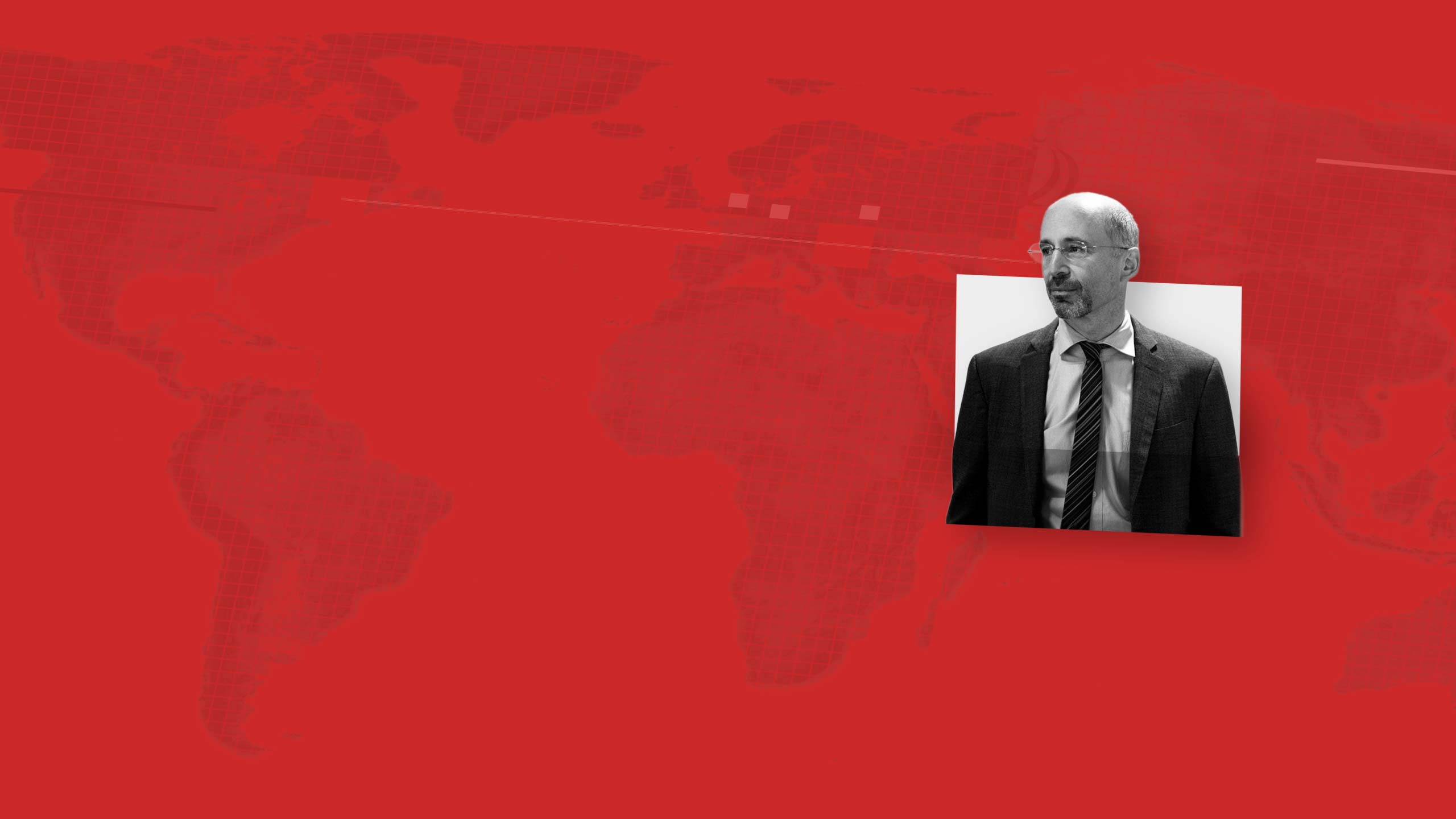
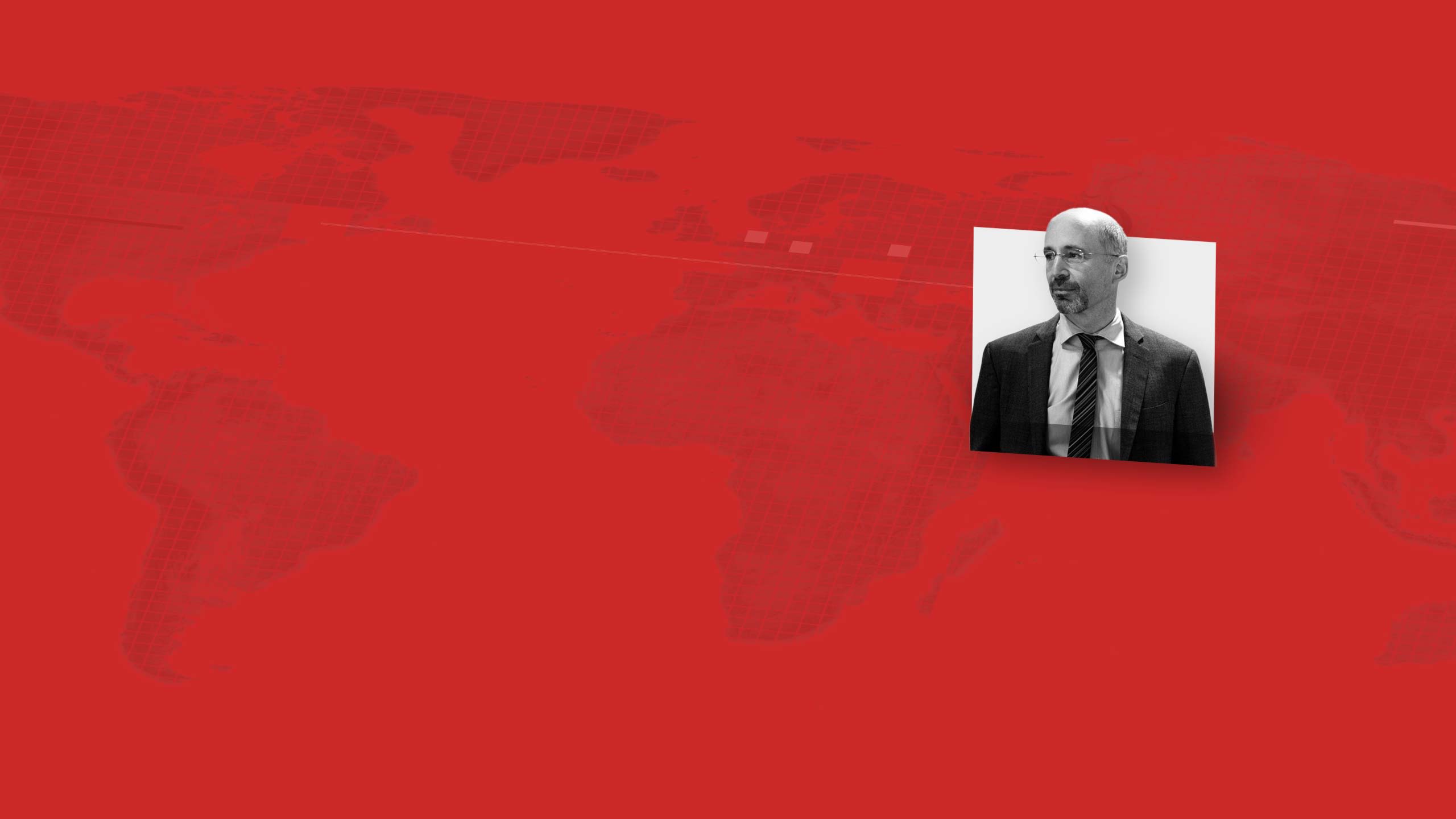
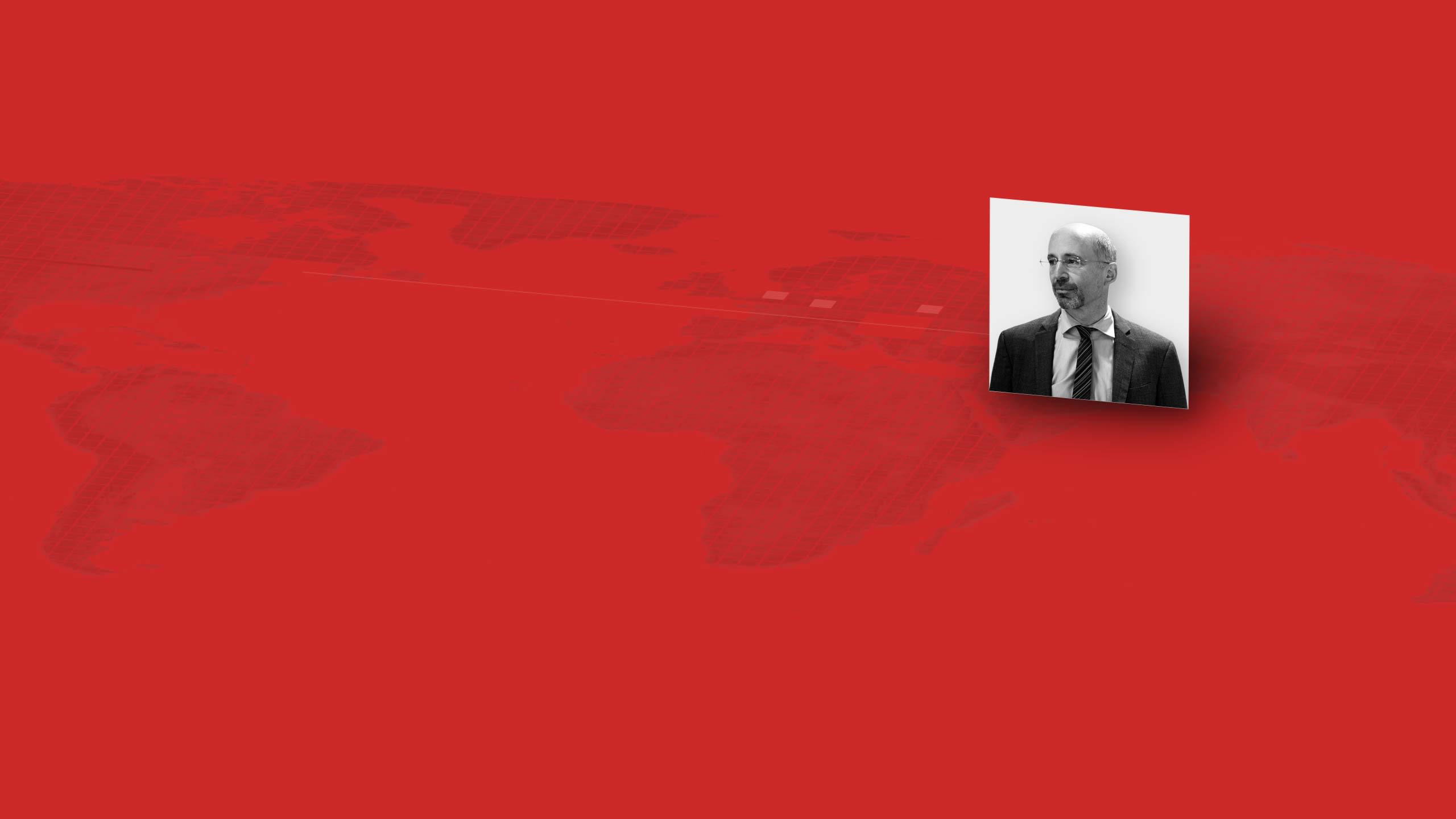
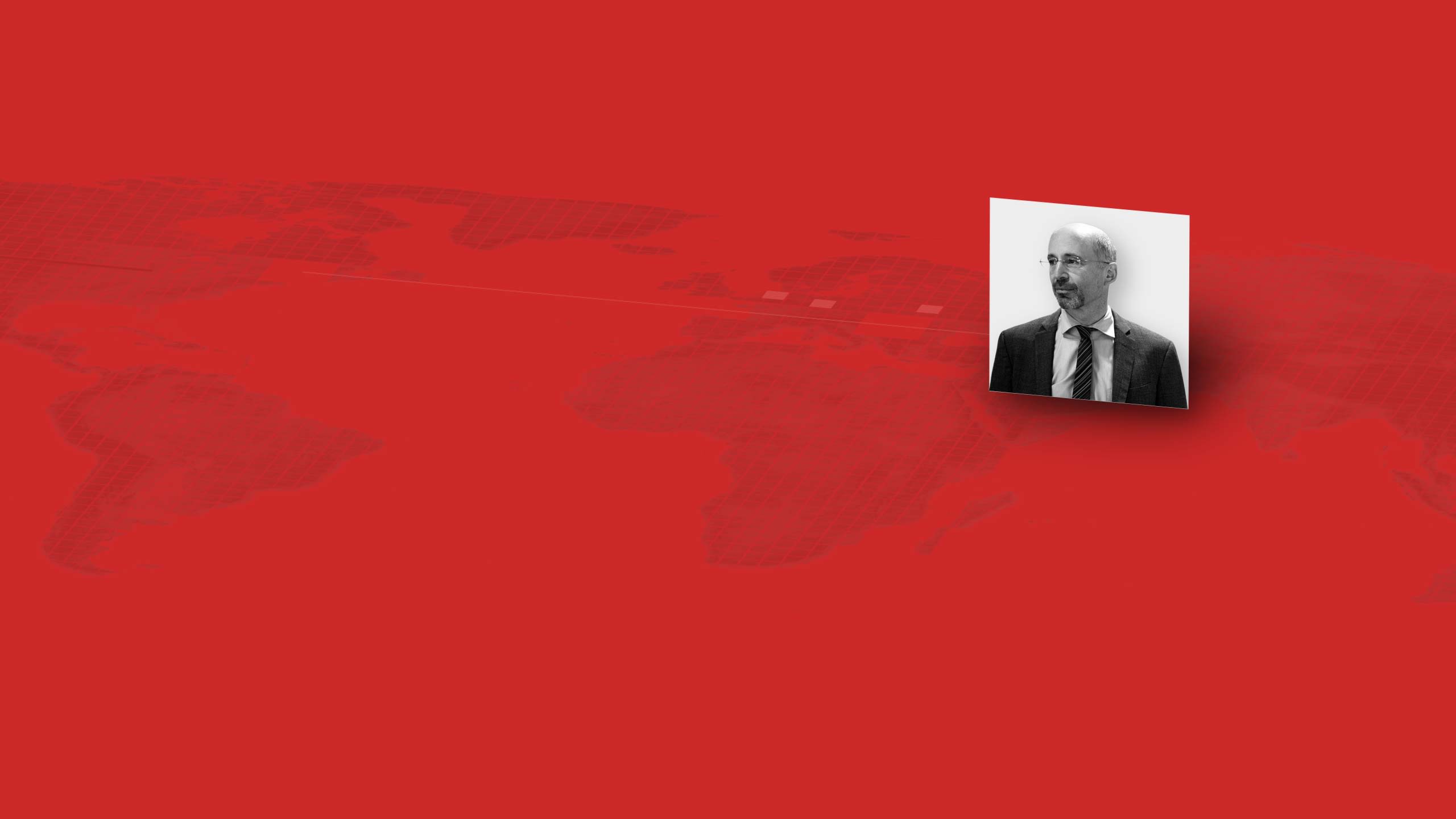
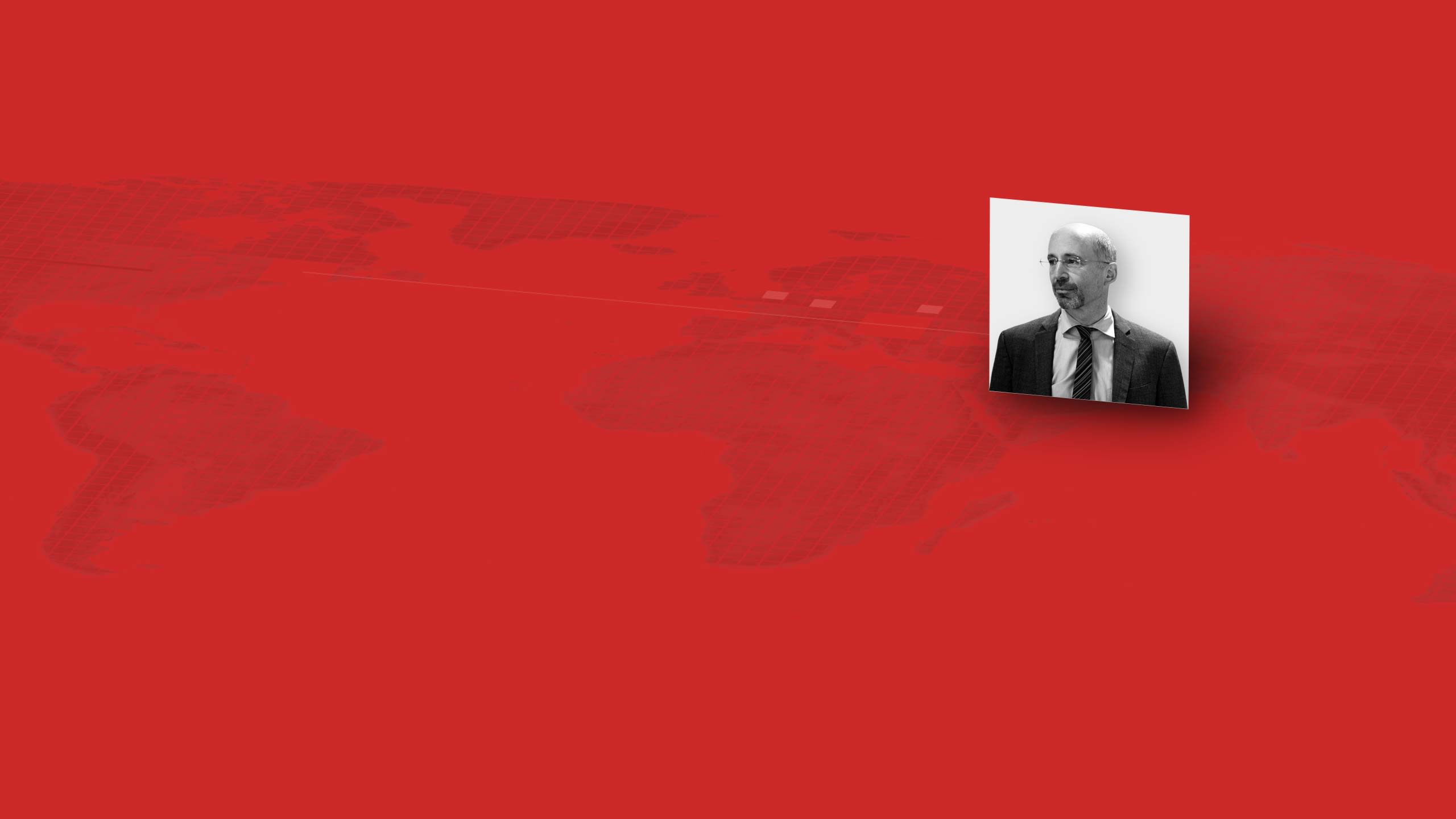
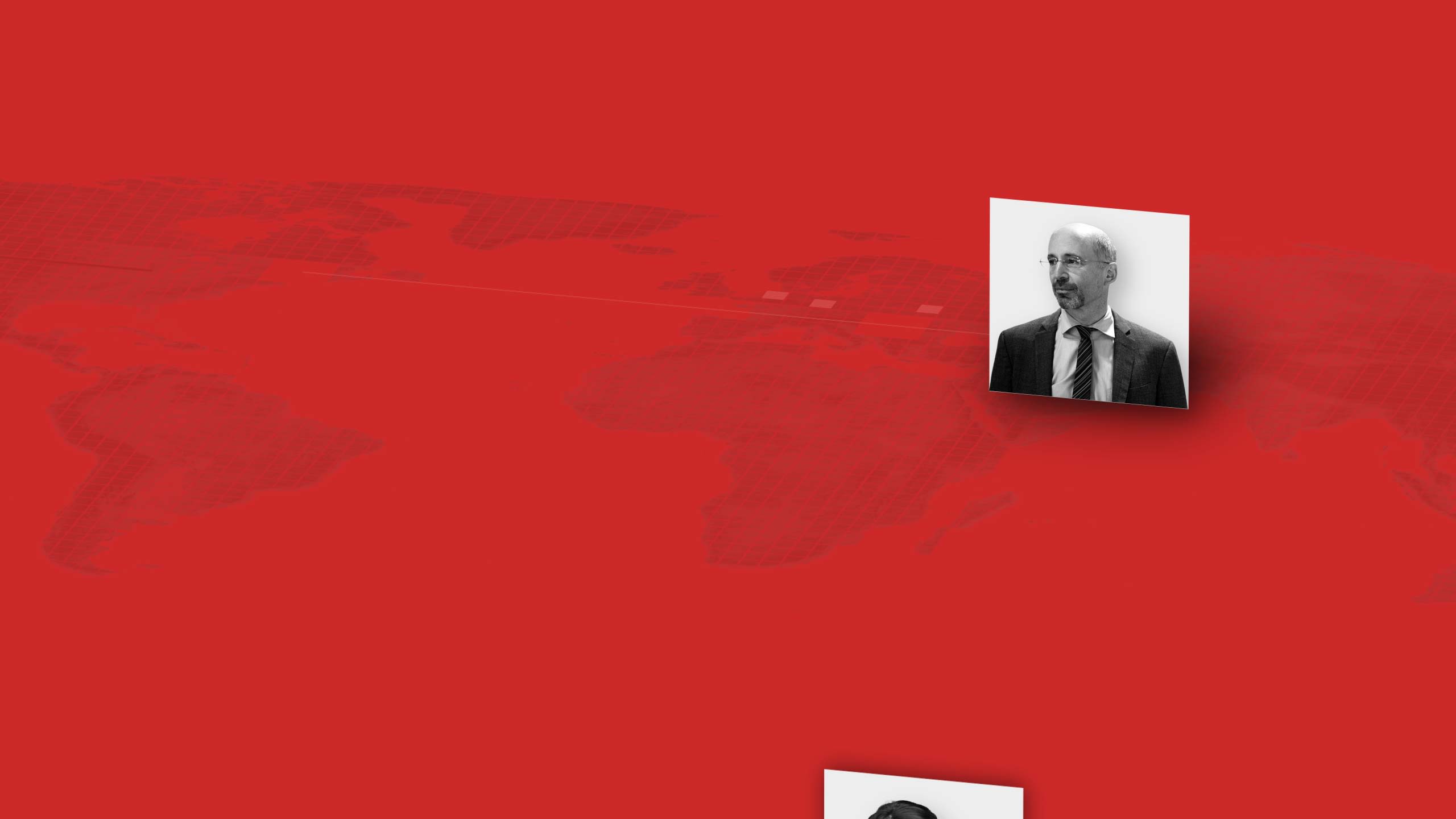
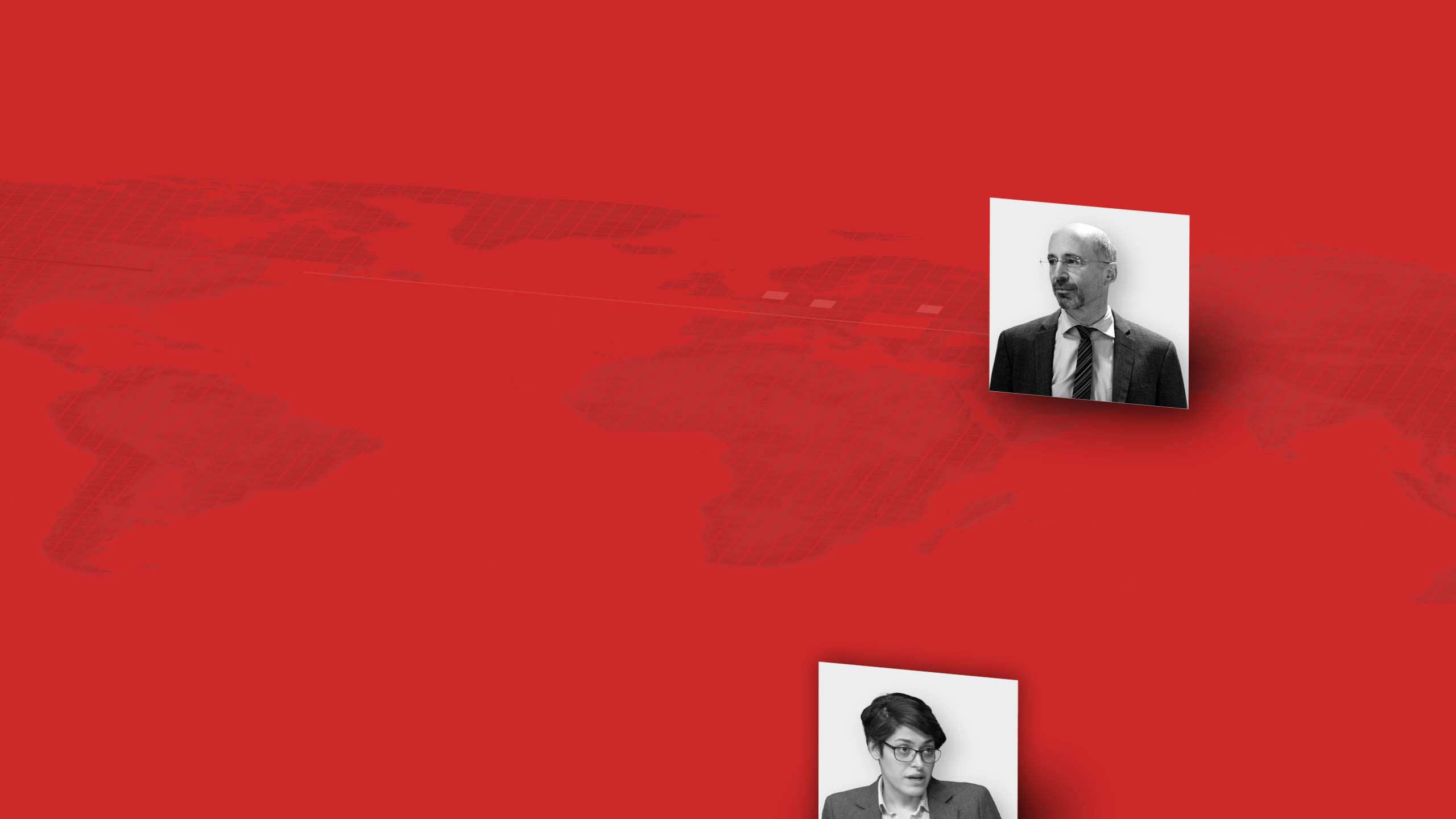
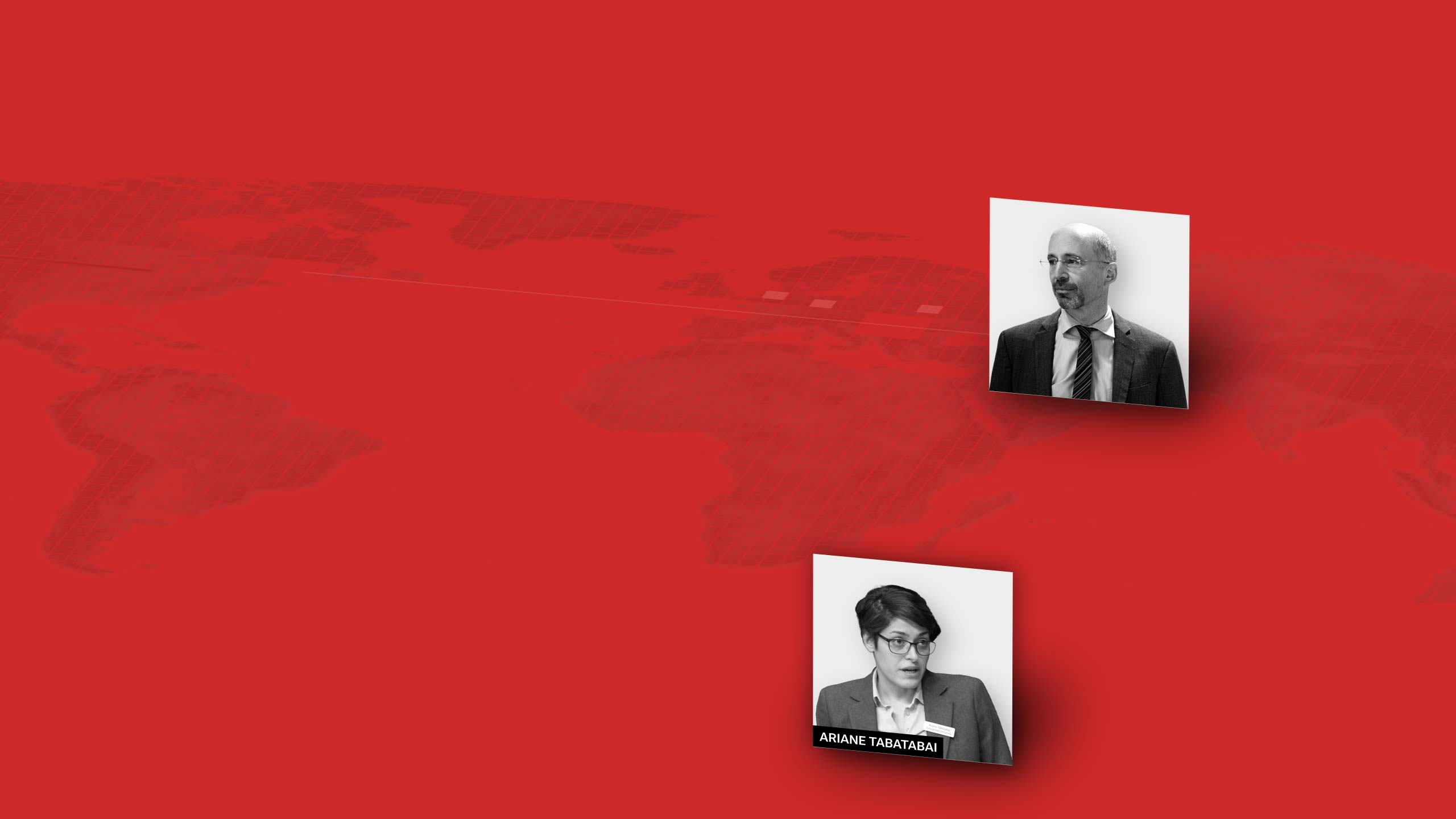
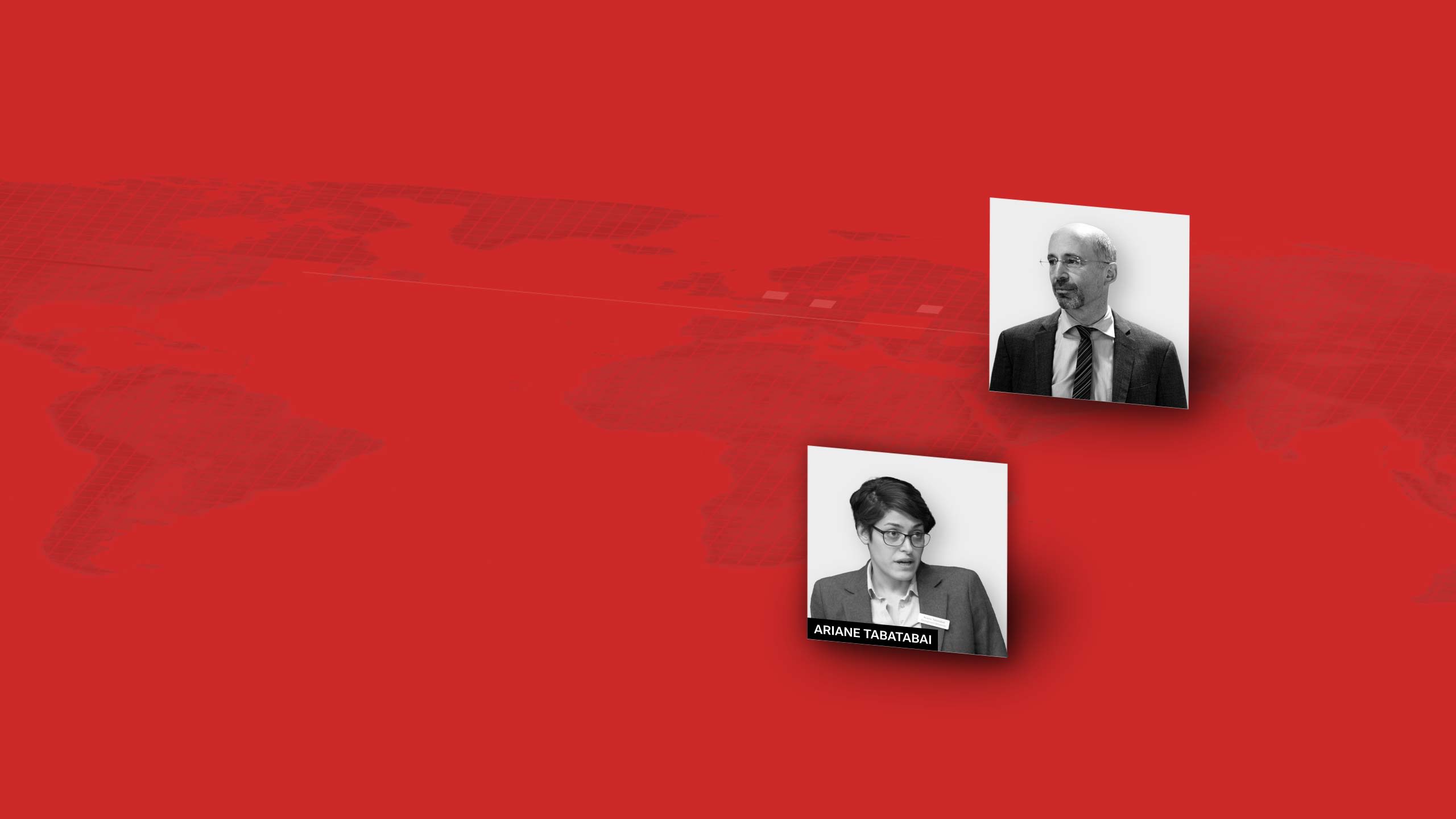
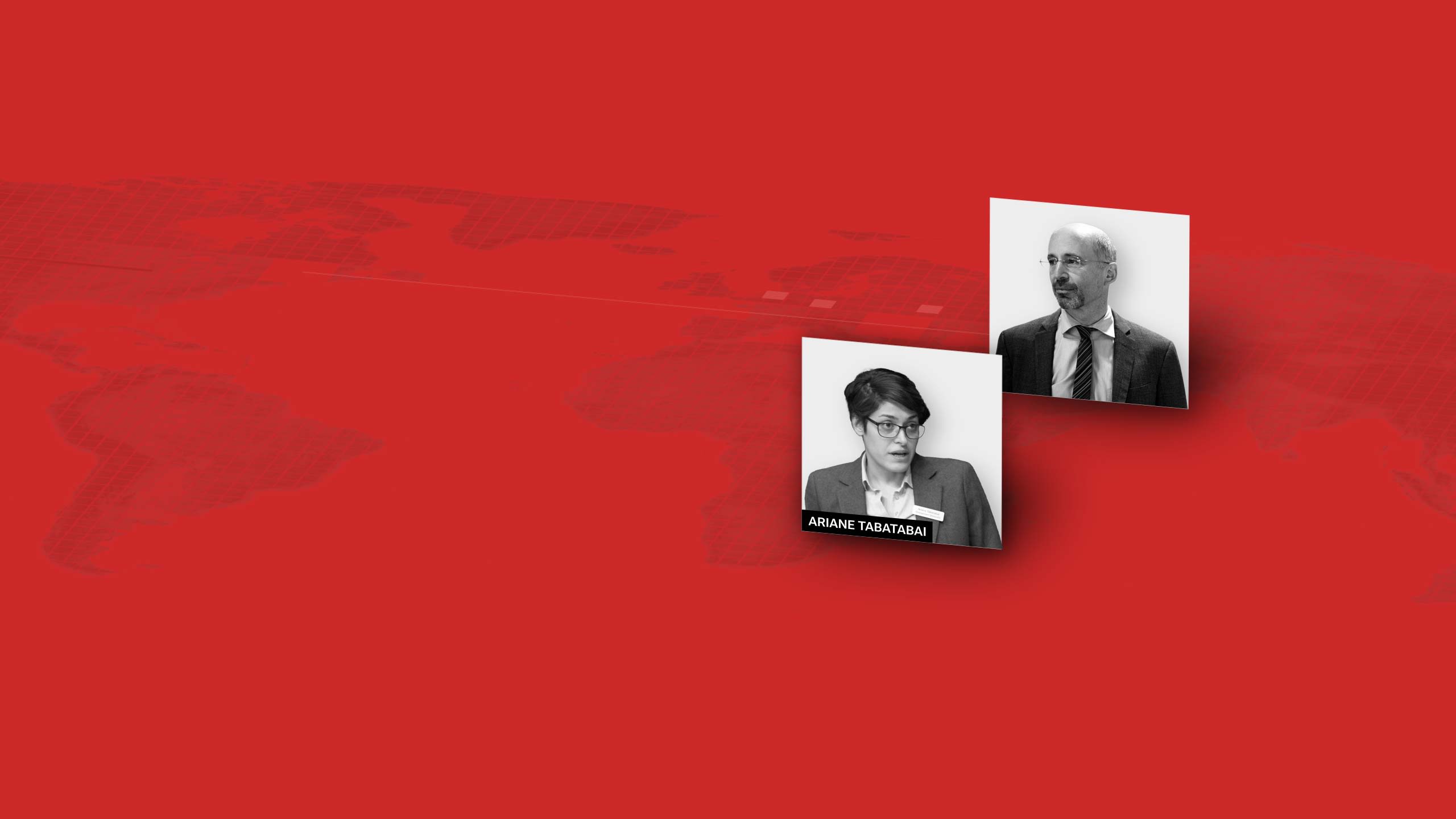
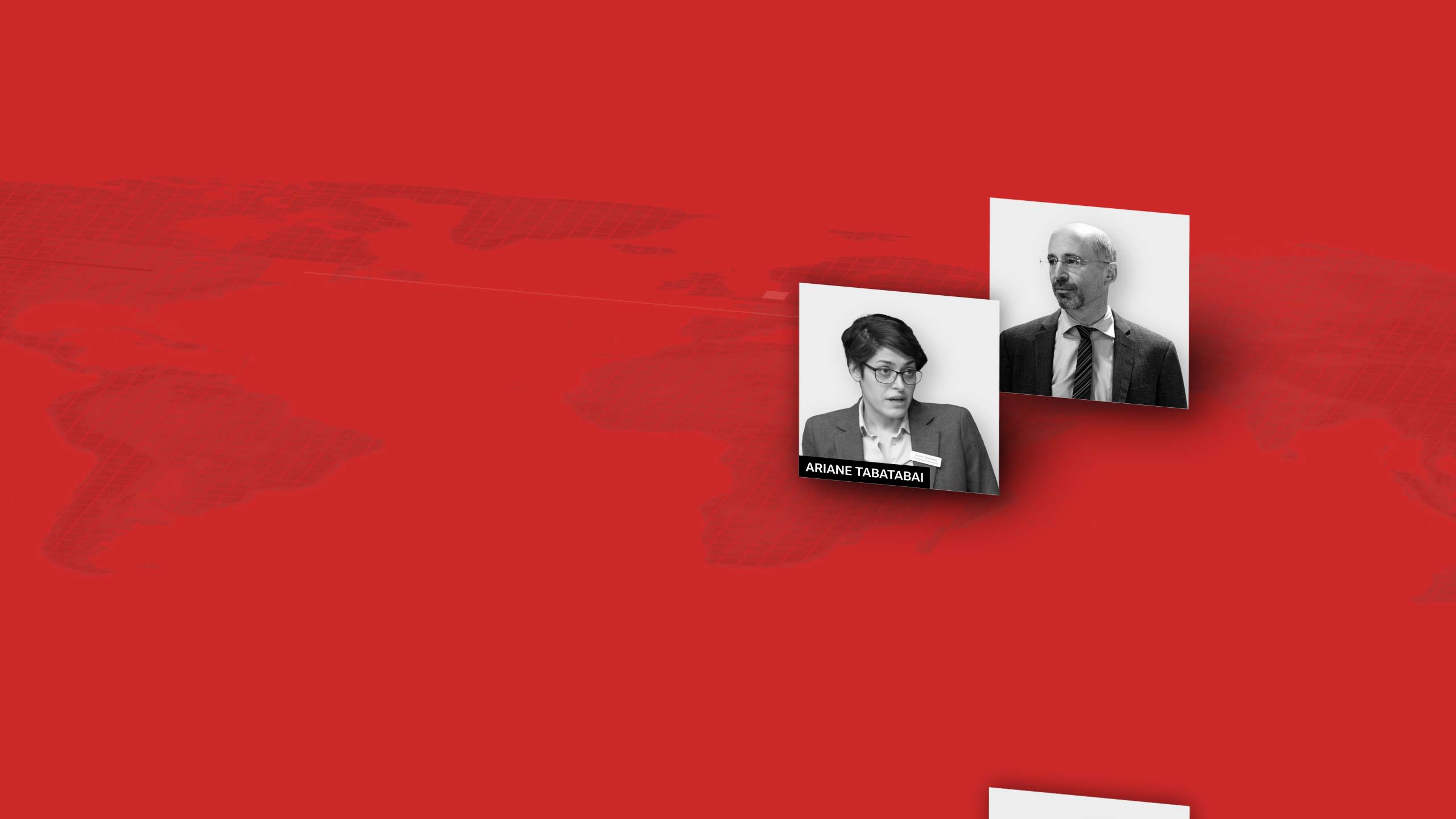
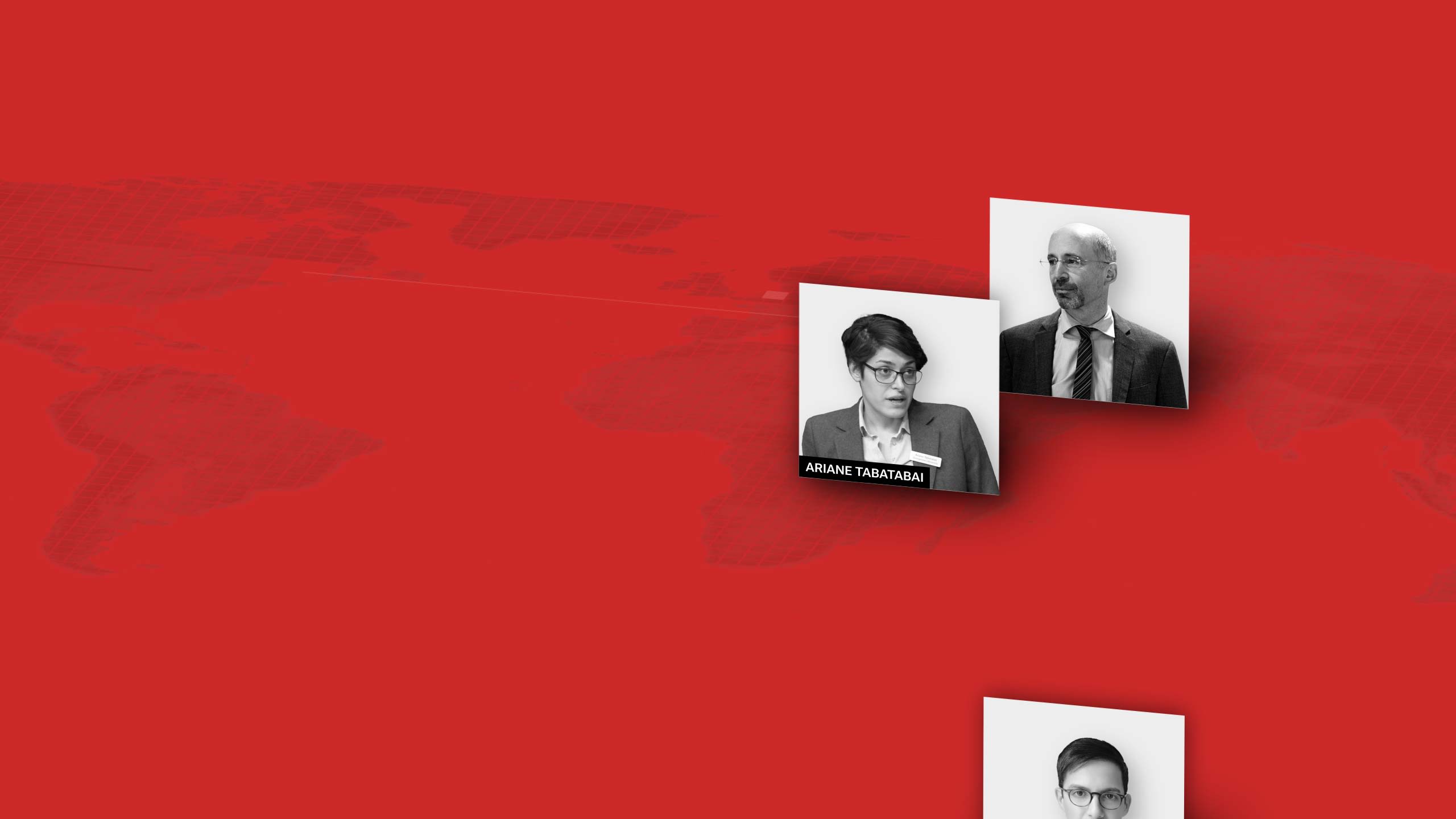
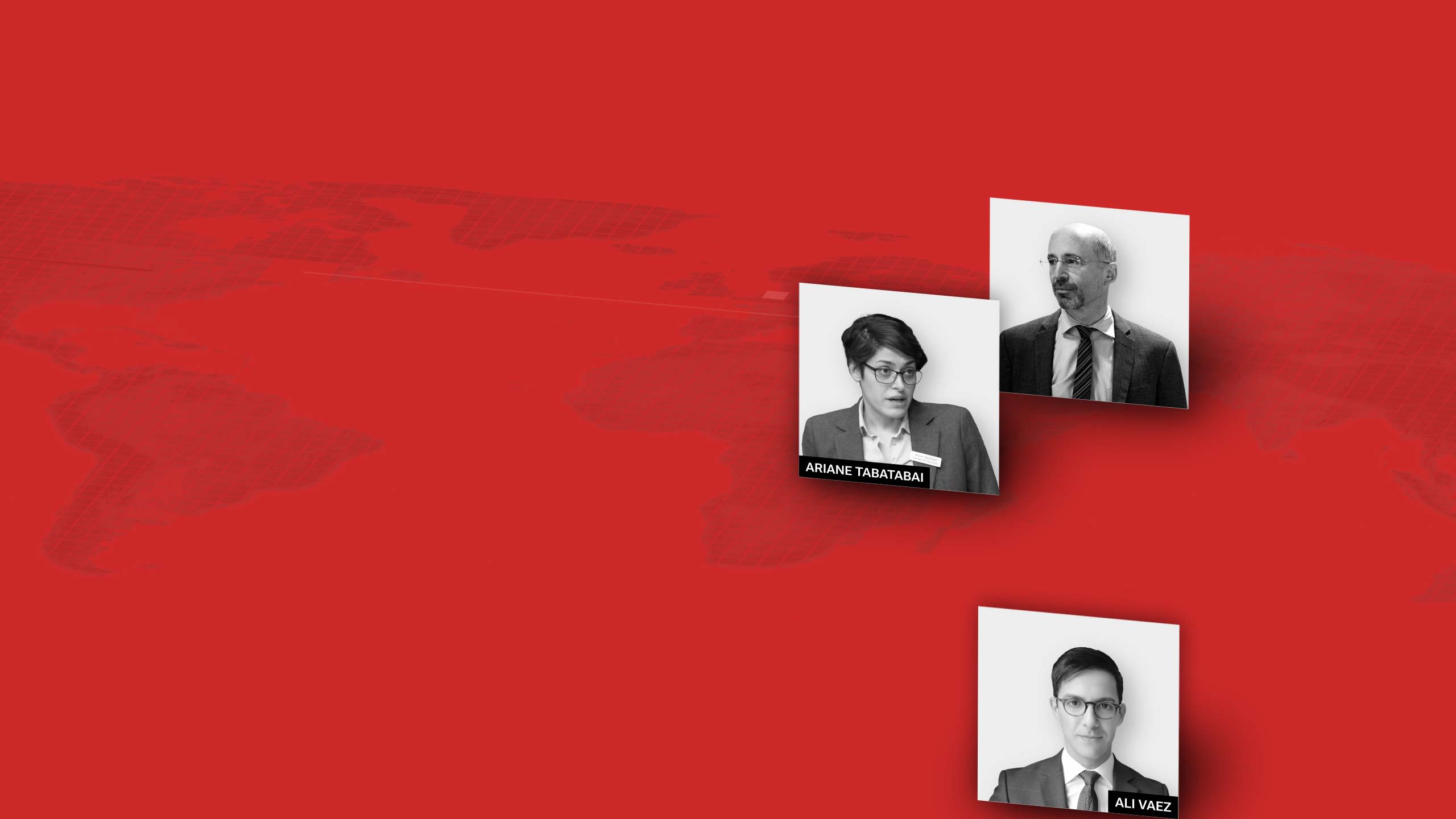
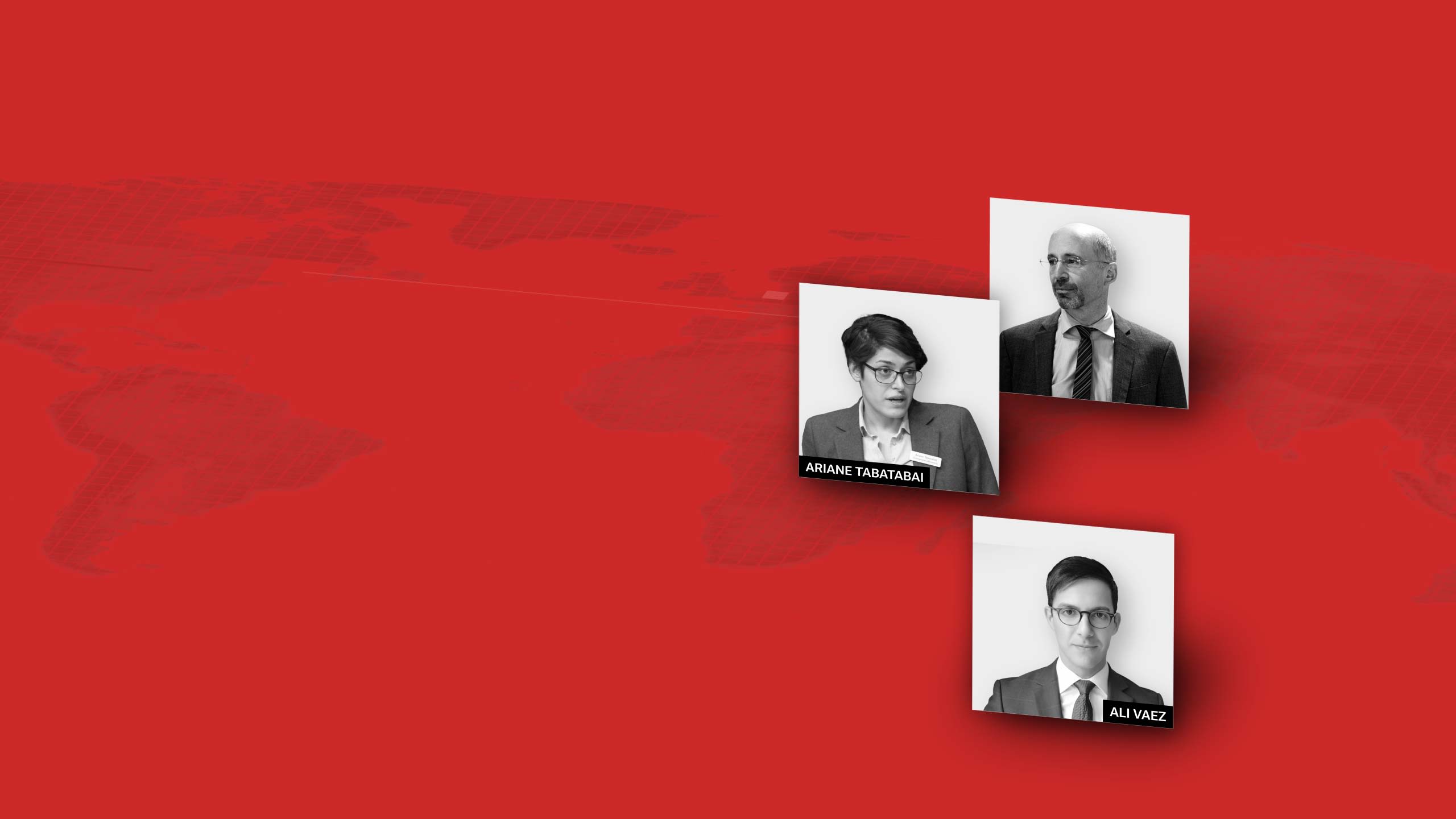
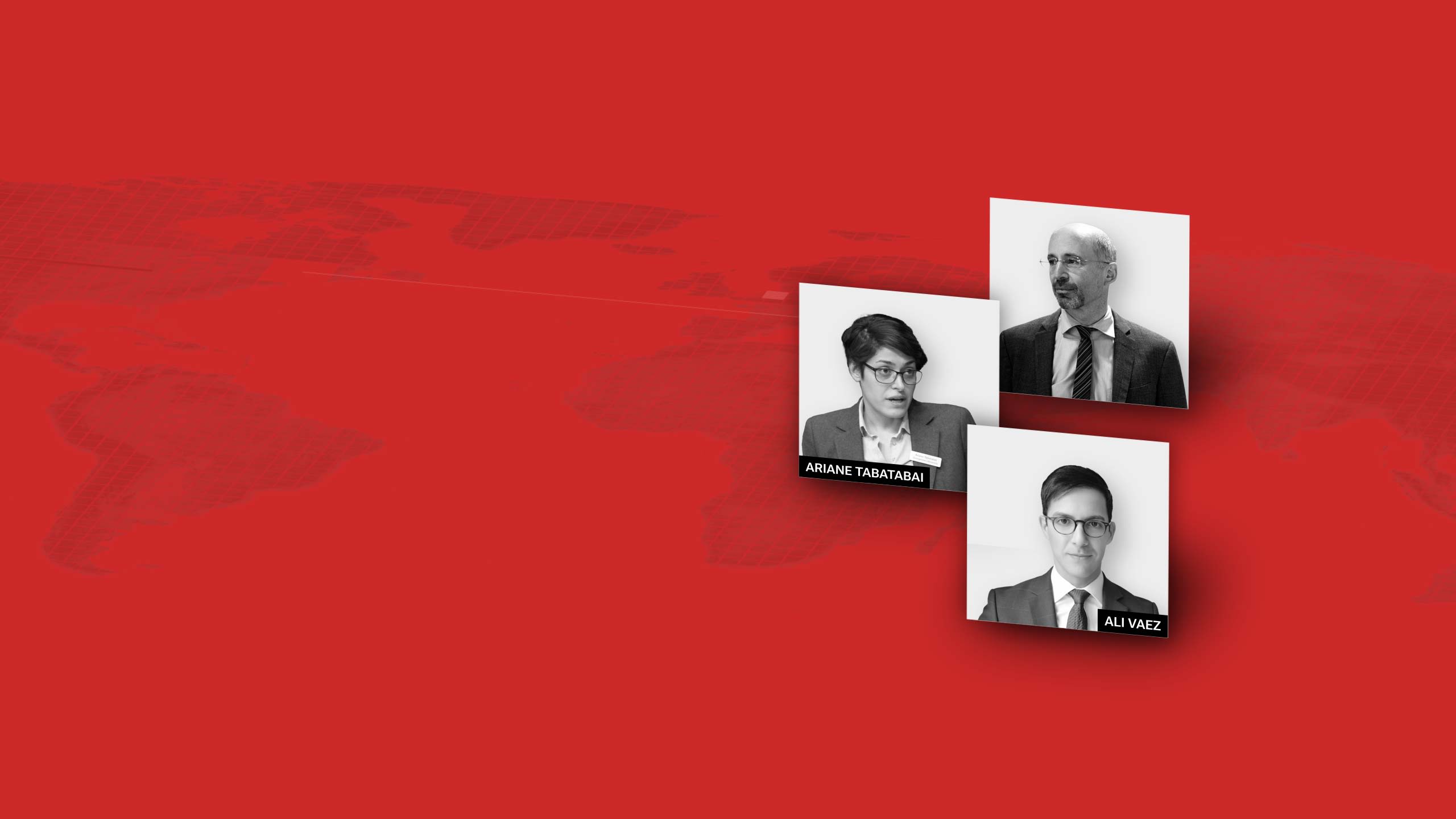
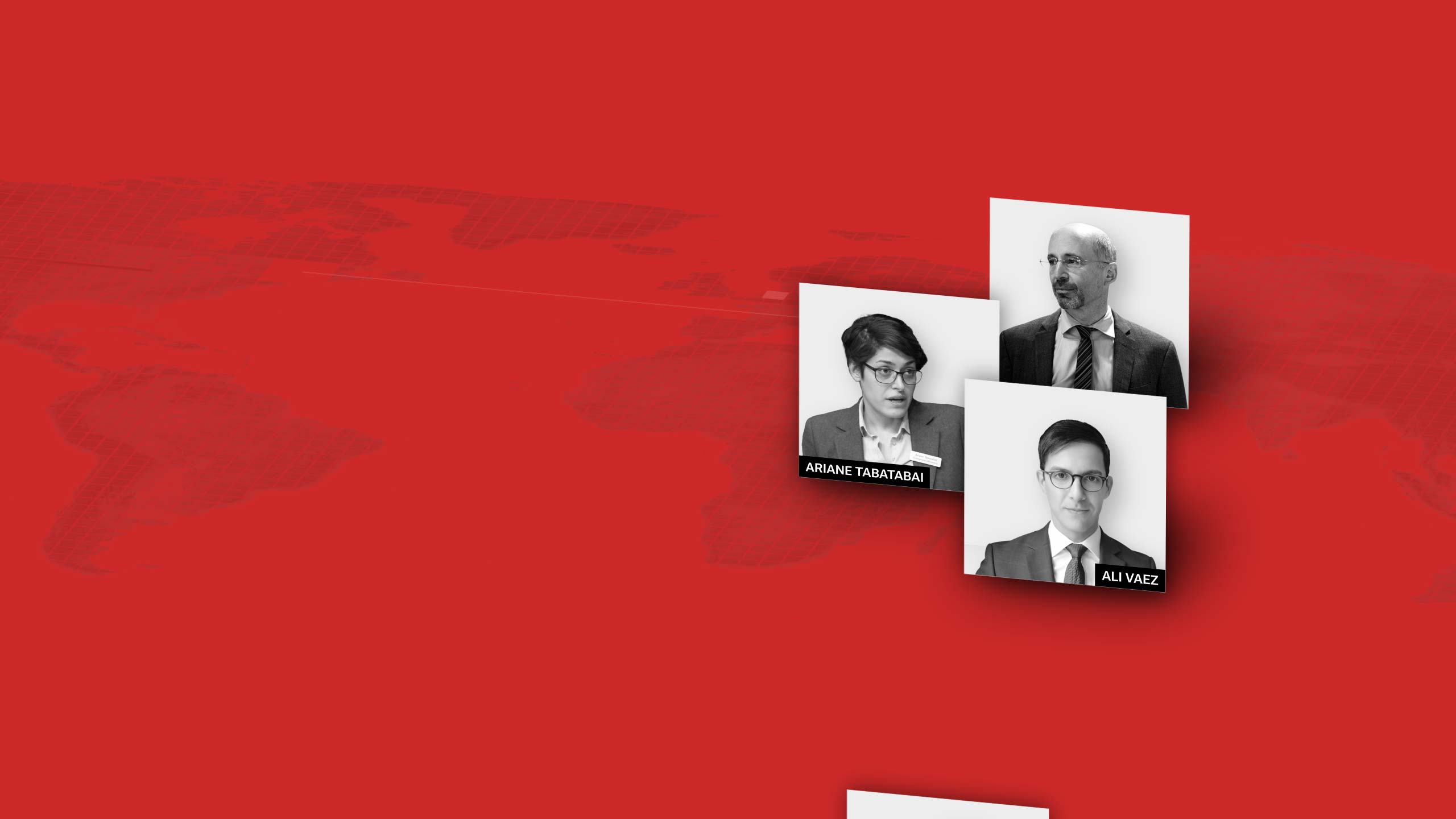
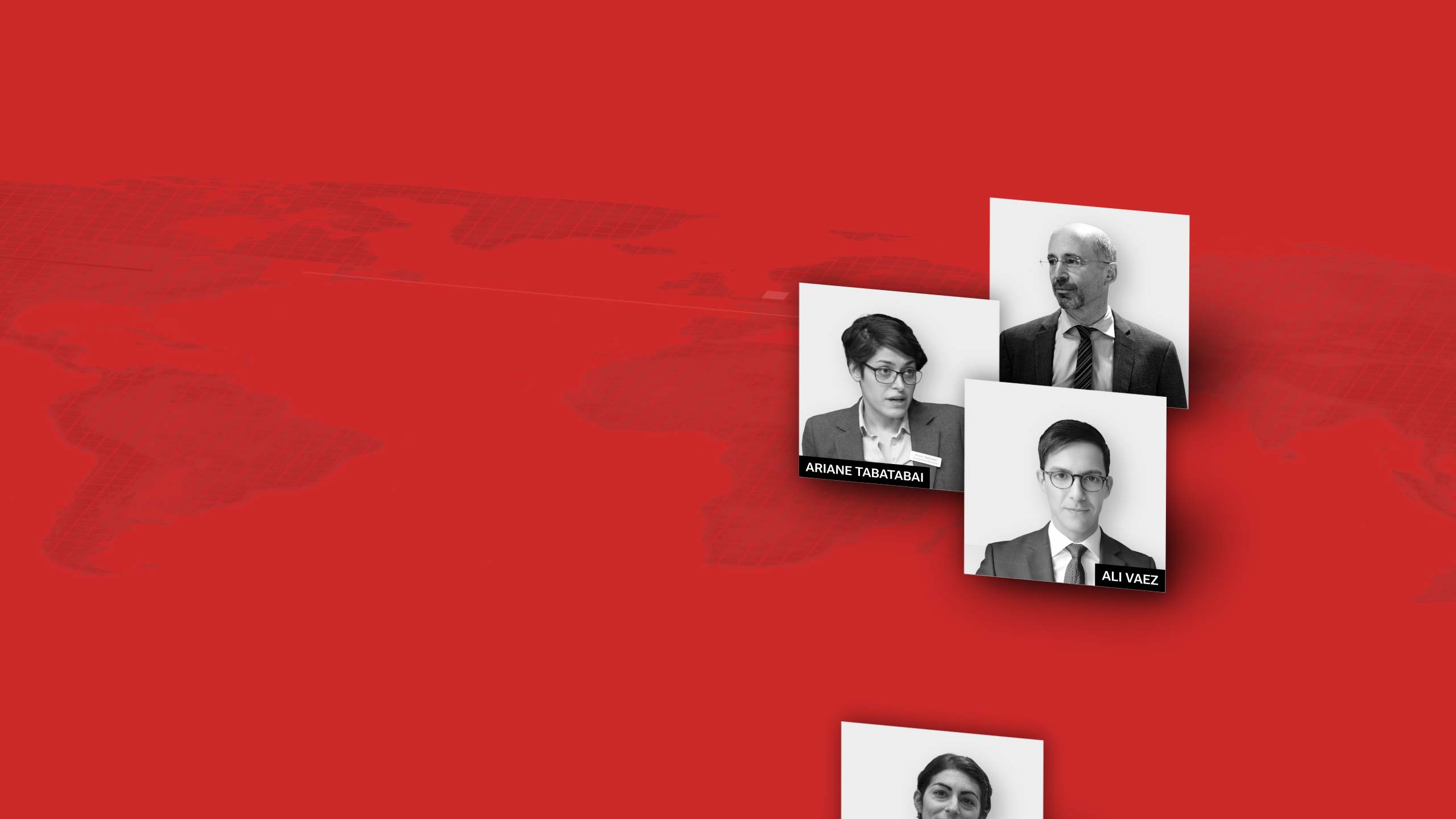
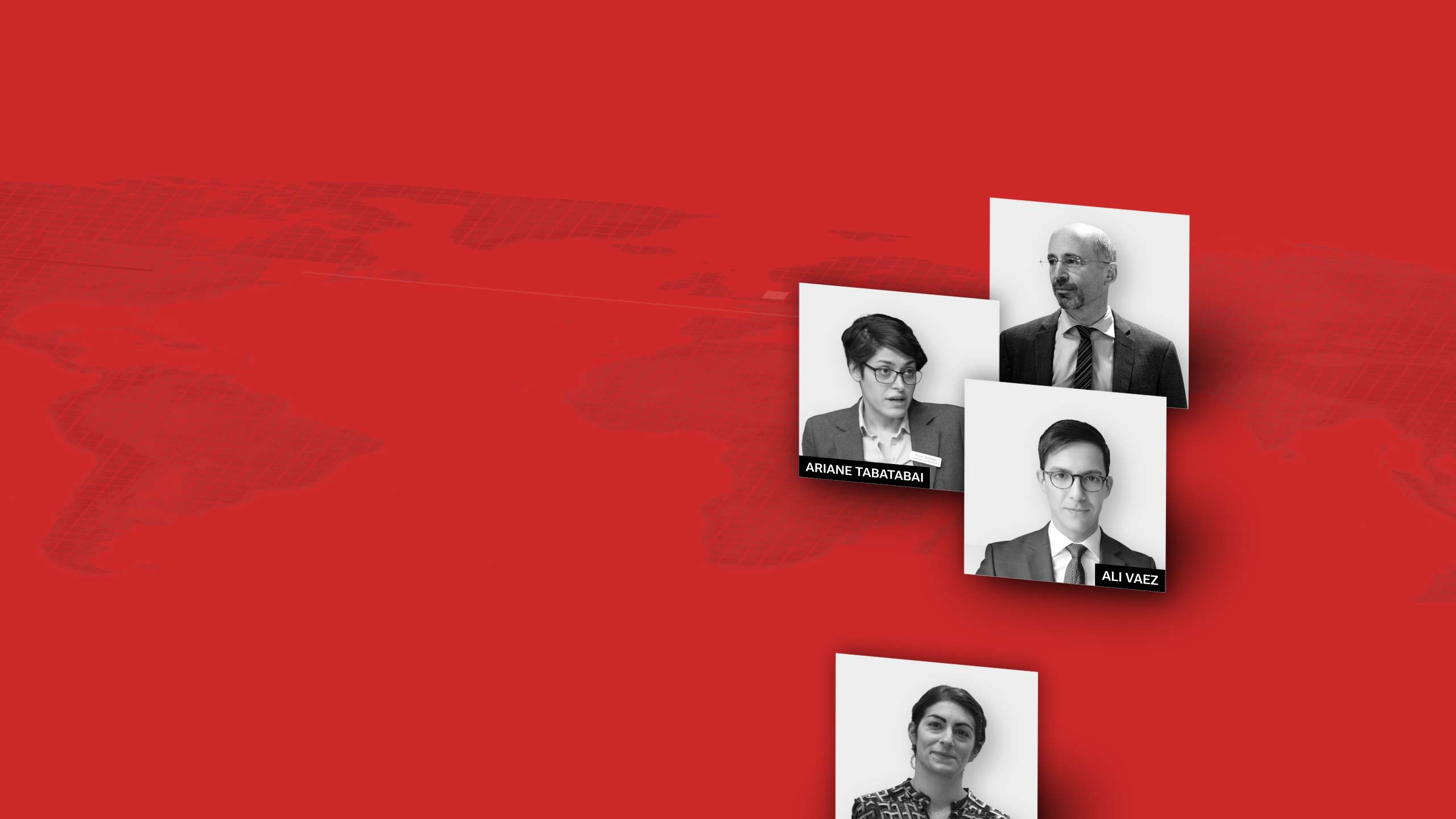
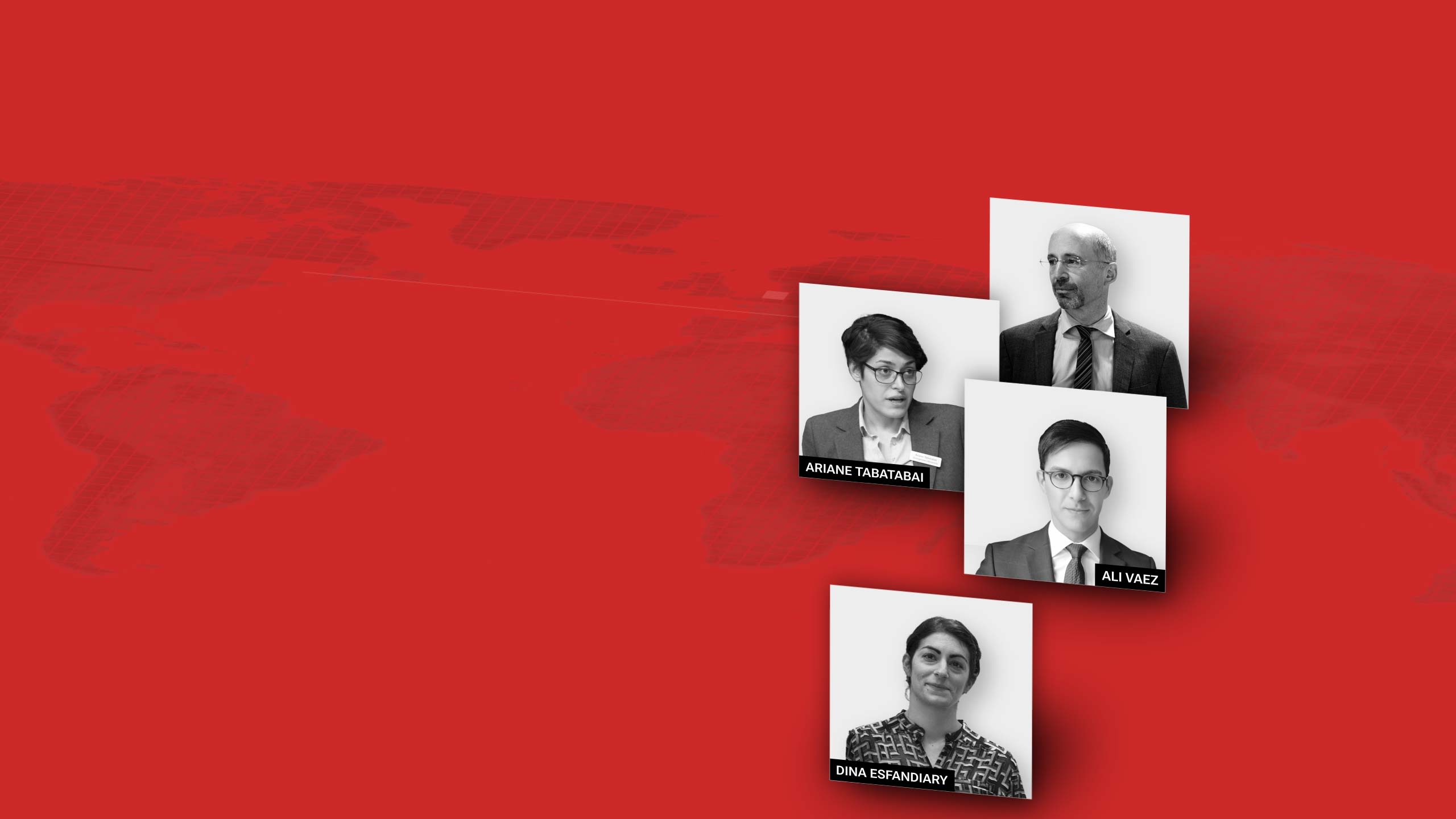
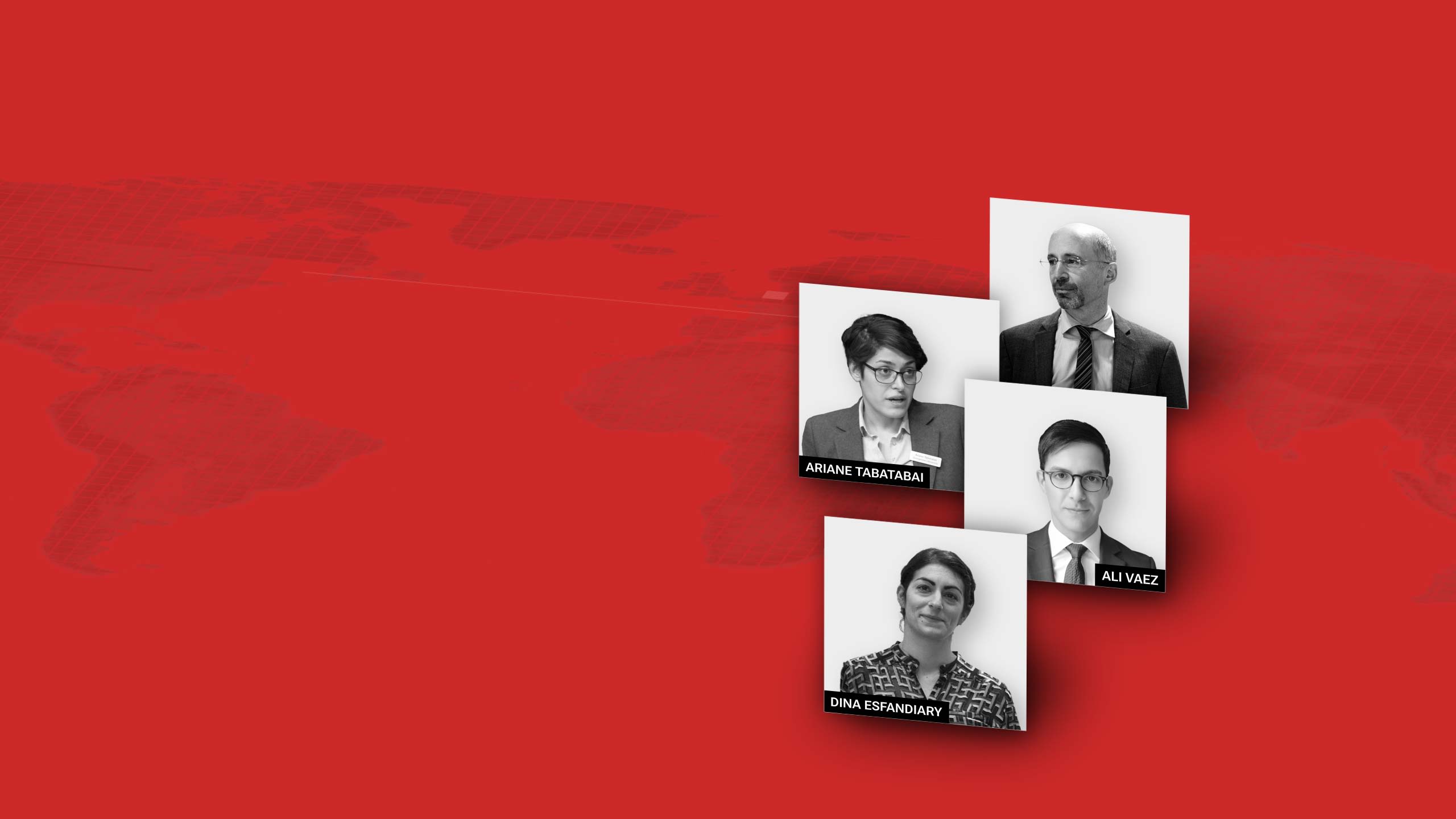
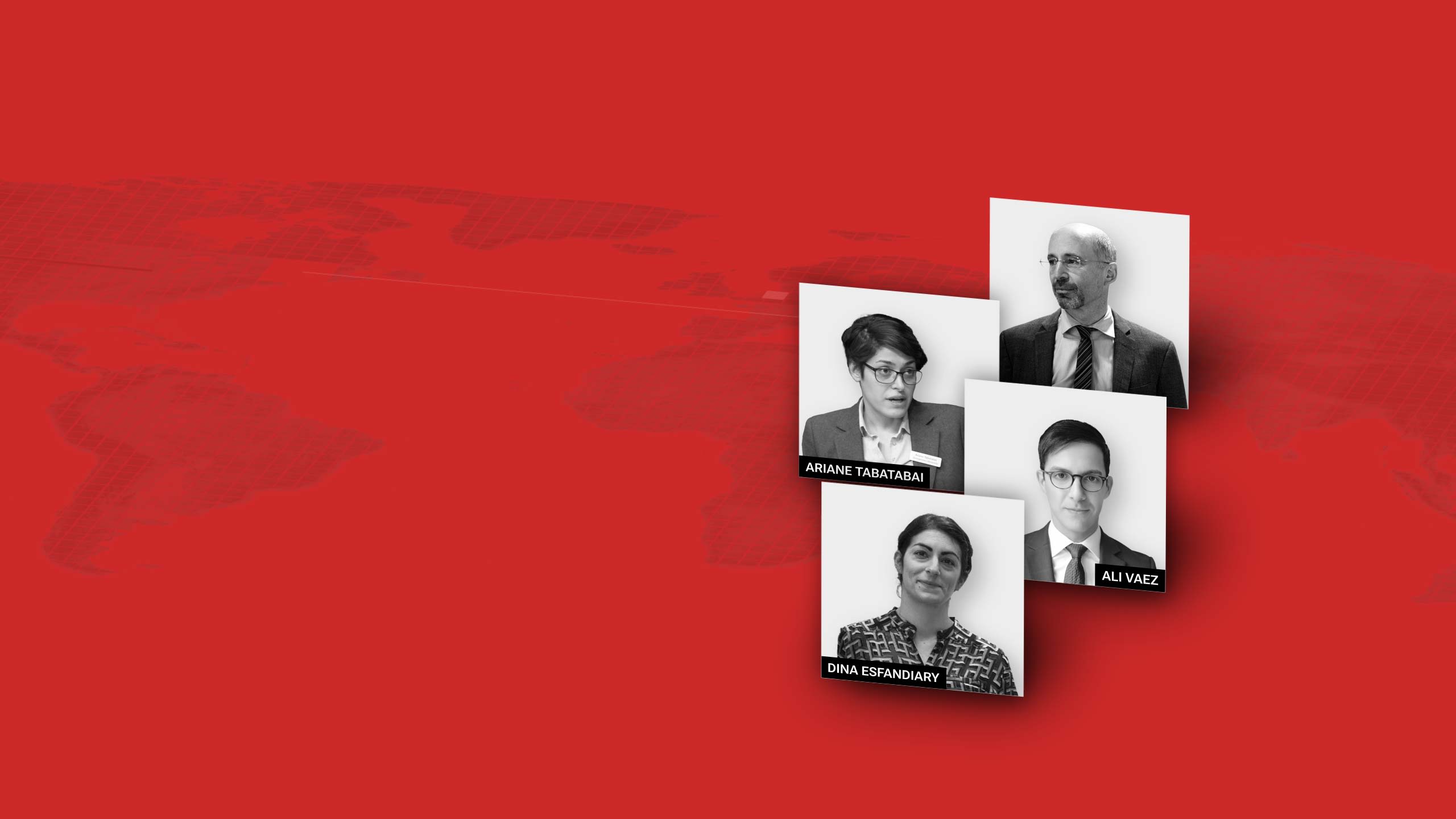
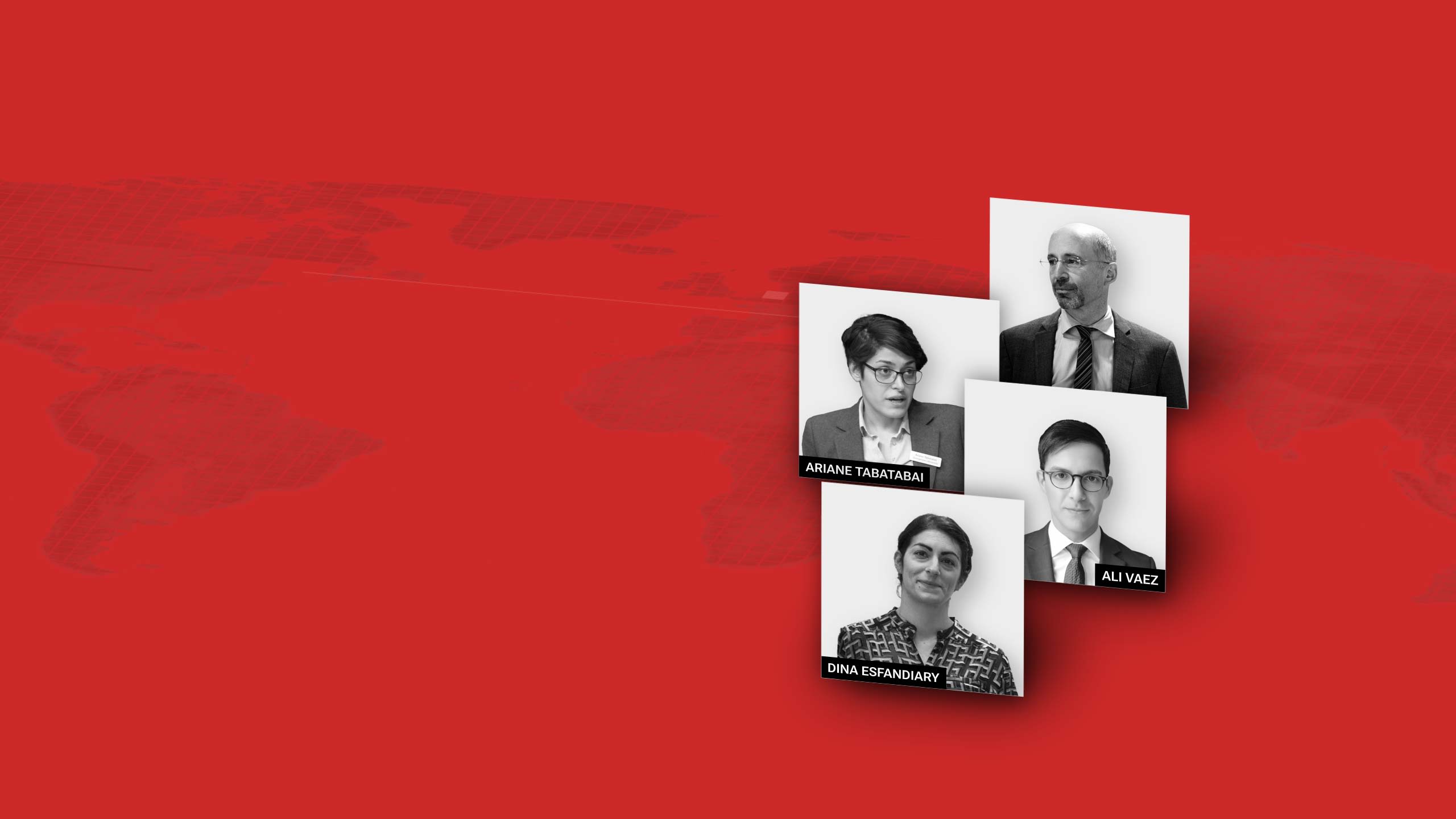
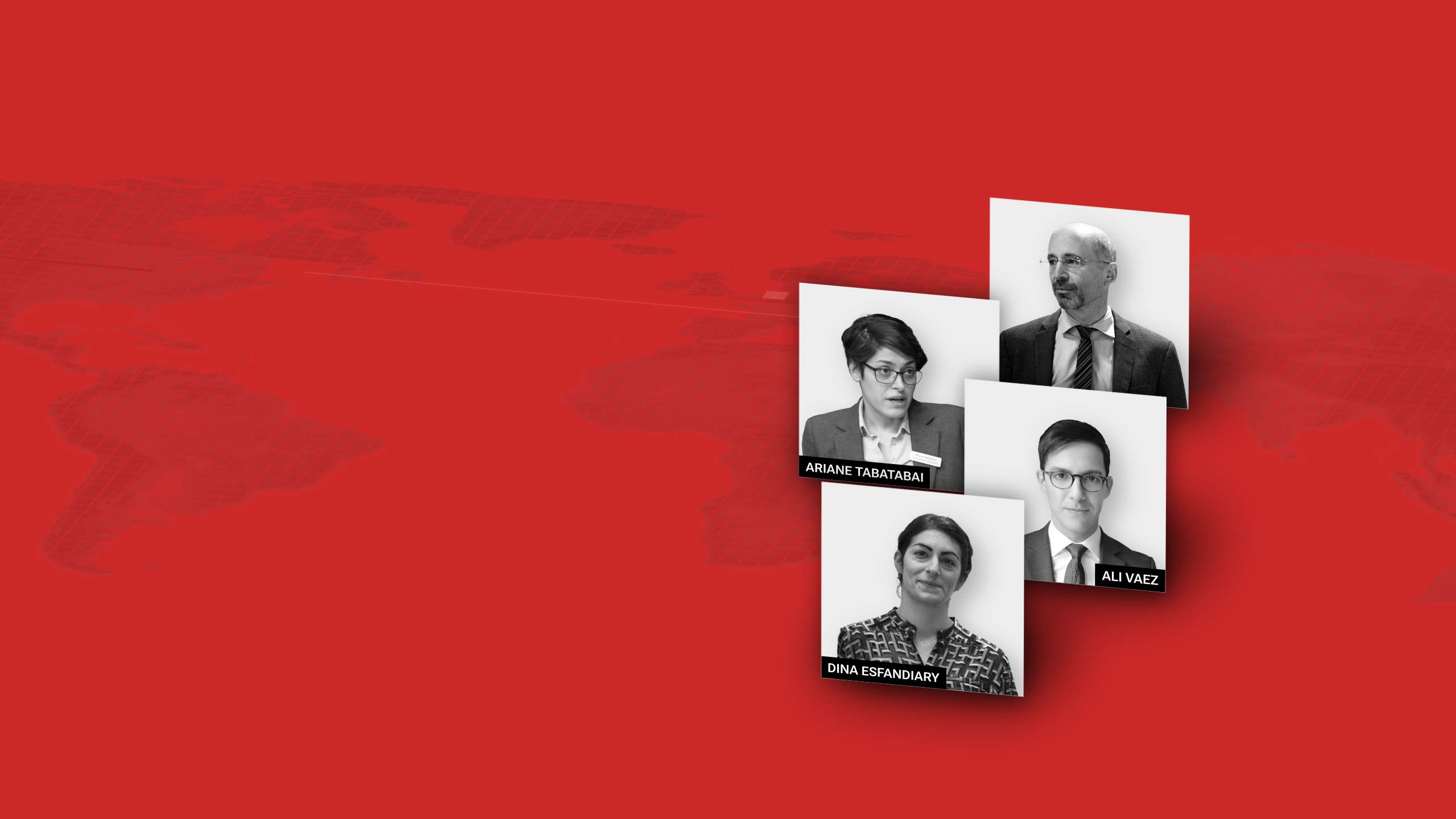
Formation of Network
The formation of the Iran Experts Initiative was first proposed in 2014 by a Berlin-based Iranian diplomat, Saeed Khatibzadeh, a member of the in-house think tank of Iran’s foreign ministry - the Institute for Political and International Studies (IPIS).
He suggested to his superiors that by forming a network of Iranian analysts in “American and European think tanks”, and offering them “political support”, the Islamic Republic could promote its standpoint in the world.
The election of President Hassan Rouhani in 2013 and his détente policy with the West had created momentum to resolve the nuclear issue, and the initiative could help Tehran counter its image as a “pariah state”.
Khatibzadeh wrote in an email on March 5, 2014 to Majid Takht-Ravanchi, one of the leading Iranian nuclear negotiators, and Mostafa Zahrani, the head of the IPIS in Tehran: “This initiative which we call ‘Iran Experts Initiative (IEI)’ is consisted of a core group of 6-10 distinguished second-generation Iranians who have established affiliation with the leading international think-tanks and academic institutions, mainly in Europe and the US.”
Zahrani - a Revolutionary Guards member and a veteran diplomat - was instrumental in supporting the network and securing its funding, while acting as the main point of contact between the IEI members and Zarif.
Zahrani’s communications with almost a dozen Iranian analysts in Western think tanks between 2014 and 2021 showed how some of the analysts looked to Tehran for counsel. Tabatabai, for instance, sought Tehran’s advice on matters like visiting Israel or participating in conferences, while Vaez sent an article to the Iranian authorities for a pre-publication review.
Iranian foreign ministry, the IPIS, Zarif, Zahrani and Khatibzadeh did not respond to requests for comment.
The IPIS, which operates directly under the supervision of the Iranian foreign ministry, hosted a two-day conference in 2006 titled 'Review of the Holocaust: Global Vision' in Tehran. The conference drew criticism as it provided a platform for numerous Holocaust deniers and skeptics from around the world. Around 40 European and American research institutes severed ties with the IPIS because it hosted the conference.
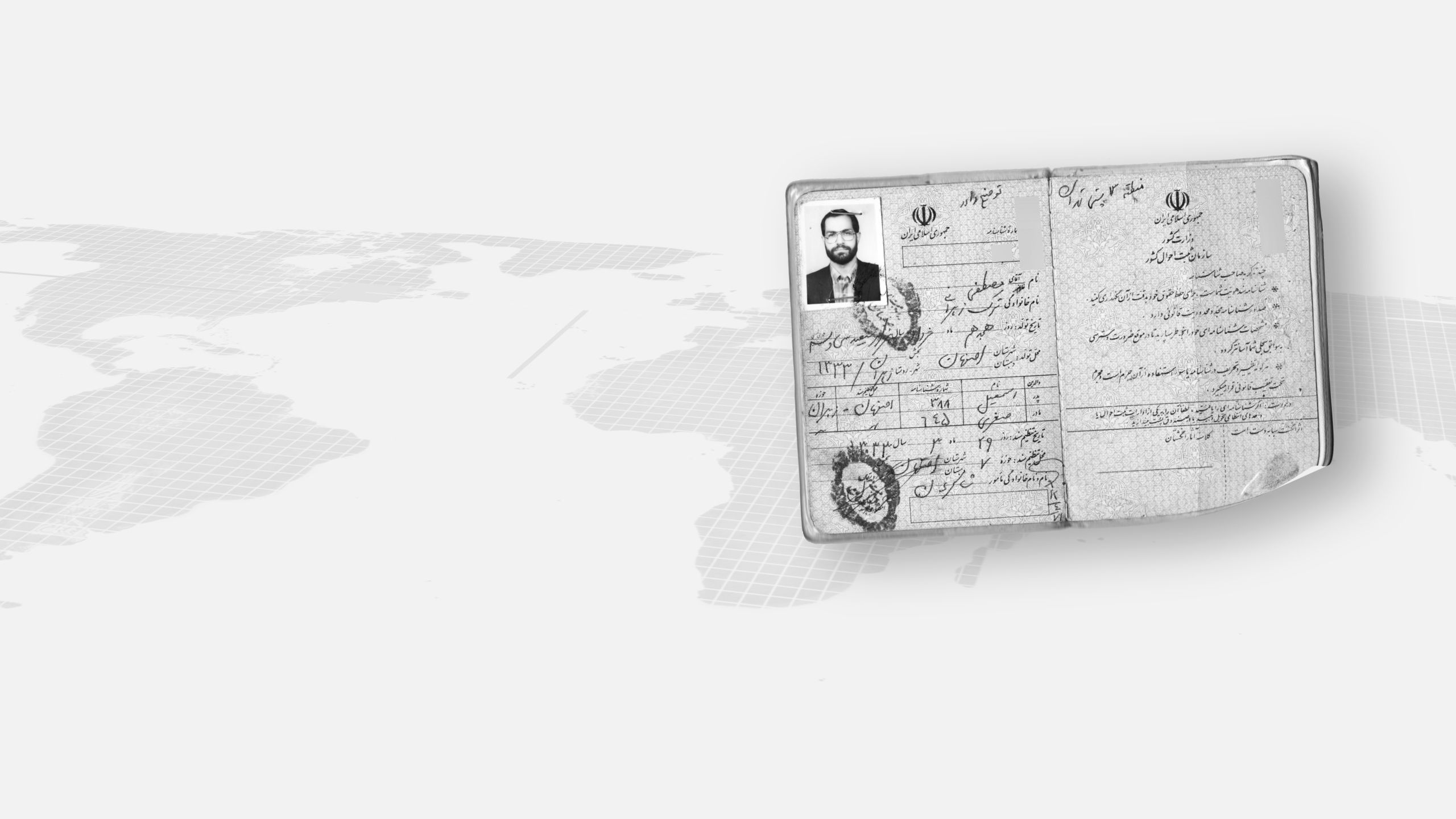
Core Members
In an attachment to an email, Khatibzadeh first proposed a list of 21 Iranian analysts living abroad who he thought should join the IEI. Subsequent exchanges show the number of vetted individuals or those willing to cooperate was reduced to around 10.
Among the IEI top members was Ariane Tabatabai, currently chief of staff for Assistant Secretary of Defense for Special Operations at US Department of Defense, and an official advisor to Robert Malley between 2021-2022, the documents show. She attended the nuclear negotiations in Vienna alongside Malley in 2021, according to a photo published by the Russian delegation.
In another email sent on March 11, 2014, Khatibzadeh told Zahrani: “This very idea of Iran Experts Initiative (IEI) was discussed between me and two of the young experts, we (you and me) met in the prague (sic) conference, i.e. Ariane Tabatabei (sic) and Dina Esfandiari (sic). We three agreed to be the core group of the IEI.”
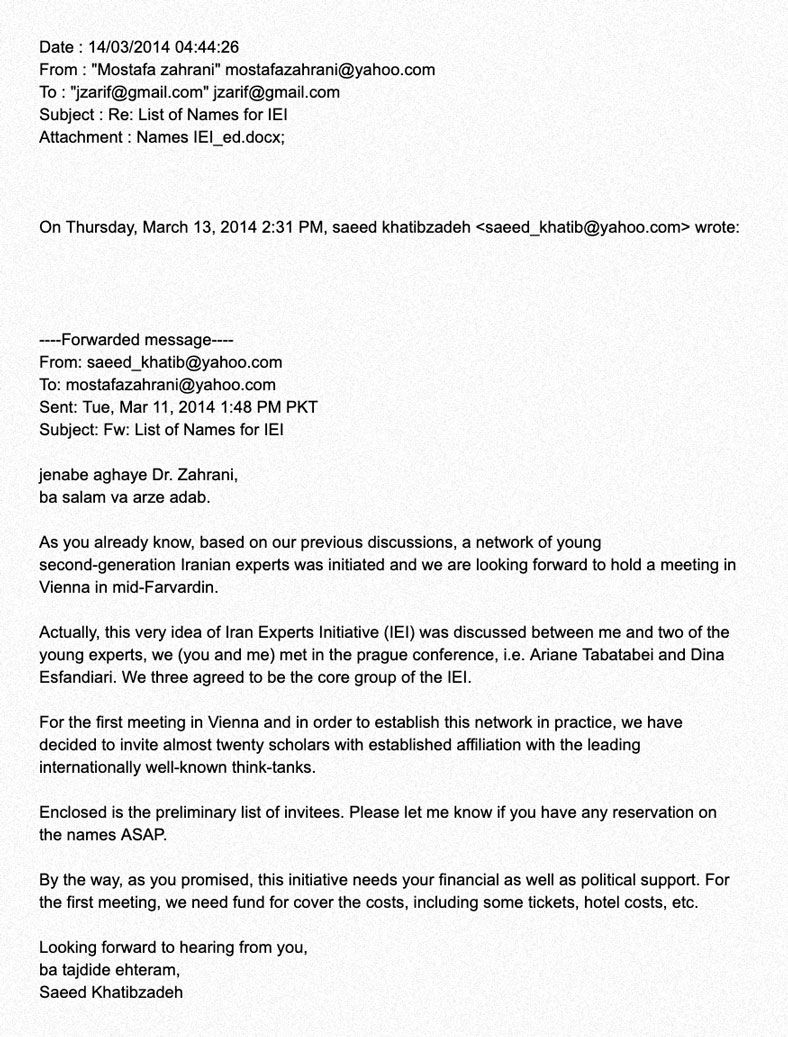
The members of the network wrote articles to explain and defend Iran's foreign policy and its nuclear and military activities. They also gave interviews to major media outlets, attended panels, and provided advice to Western governments on Iran. In all cases, they introduced themselves as independent analysts.
Another core member was Ali Vaez. He was recruited by Malley to the Crisis Group in 2012.
The Crisis Group said in an article published on its website in 2015 about Vaez and his role in the nuclear agreement that he was “empowered by the trust the parties had in his impartiality” and that “the US, Russia, China, Germany, the UK and France began to invite Vaez to exchange views by telephone, by email and at the negotiations venue.”
Malley founded and directed the ICG’s Middle East and North Africa Program in 2002. After being appointed in February 2014 to the National Security Council staff in Obama’s administration, he left the ICG, but he maintained his close connections to the institution, continuing to use Vaez as his point of contact with Zarif, and sent him as his envoy to Vienna to meet with Iranian officials, the emails show.
Vaez traveled to Tehran in March 2014, accompanied by three top members of the ICG. They met former Iranian president Akbar Hashemi Rafsanjani who was also chairman of the Expediency Council, a powerful unelected body. Malley had planned to join the trip, but canceled those plans after he was appointed to the Obama administration, according to an email from Vaez to Zahrani.
A month after the visit, Vaez asked Zahrani for another meeting in Vienna, according to the documents.
“Following the order of his previous boss Malley, Ali Vaez will come to Vienna. Who from our group do you instruct to have a meeting with him,” Zahrani asked Zarif in an email dated April 3, 2014.

The email indicates that Malley knew about the close relationship of some of his aides and advisors with Iranian officials.
Asked about the email, Elissa Jobson, Crisis Group’s chief advocacy officer, said the framing of the Iranian government was either mistaken or disinformation. “All of our work is independent. We’re not intermediaries for anyone.”
The IEI simultaneously expanded its reach to European think tanks and established ties with some of their Iran analysts, including Ellie Geranmayeh, deputy head of the Middle East and North Africa program at the European Council on Foreign Relations (ECFR), Rouzbeh Parsi, head of the Middle East and North Africa program at the Swedish Institute of International Affairs (Ui), and Adnan Tabatabai, co-founder and CEO of the Center for Applied Research in Partnership with the Orient (CARPO), according to the emails.
The European Council on Foreign Relations and the Crisis Group, in separate comments, confirmed the existence of the IEI network, but questioned its affiliation with Tehran.
An ECFR spokesman told Iran International that “during the 2013-2015 nuclear talks, ECFR staff met with officials from Europe, the U.S. and Iran to discuss developments in the ongoing negotiations.”
“To our understanding, the Iran Expert Initiative was a European-government backed initiative that ECFR staff sometimes took part in but did not lead on," the spokesman said. The spokesperson declined to name the European-government.
ECFR said its staff remained independent and in no way acted on behalf of any government or institutions.
Crisis Group’s Jobson, replying on behalf of Vaez and Esfandiary, said the IEI was an “informal platform” for researchers from different organizations to meet with the IPIS and Iranian officials.
“To spell it out a bit more, it was a means to facilitate research discussions and not a more formal entity where participants could be directed by anyone… At the time, Crisis Group had just one staff member who was invited to these meetings but did not otherwise have any involvement with IEI. Another researcher more involved with IEI later joined our staff,” Jobson said.
She said that the IEI was supported financially by European institutions and one European government. She declined to name them.
The documents show that the concept of the IEI originated with Iranian officials and that they orchestrated the inaugural and subsequent meetings of the group. The documents also reveal that Iranian officials determined the makeup of the initial group as well as the date and location of the meetings, with invitations dispatched by the IPIS. They also indicate that the Iranian foreign ministry covered the costs for the event venues.
Adnan Tabatabai from CARPO declined to comment, saying the investigation was “based on falsehoods and factually wrong assumptions.” He did not elaborate. He also called the emails fake.
A forensic study of email headers commissioned by Iran International indicated that the communications were genuine. None of the other analysts questioned the authenticity of the emails.
Rouzbeh Parsi from Ui said “It is perfectly normal for analysts and academics to engage officials and experts from various sides in a negotiation/conflict in order to enrich their own analysis.”
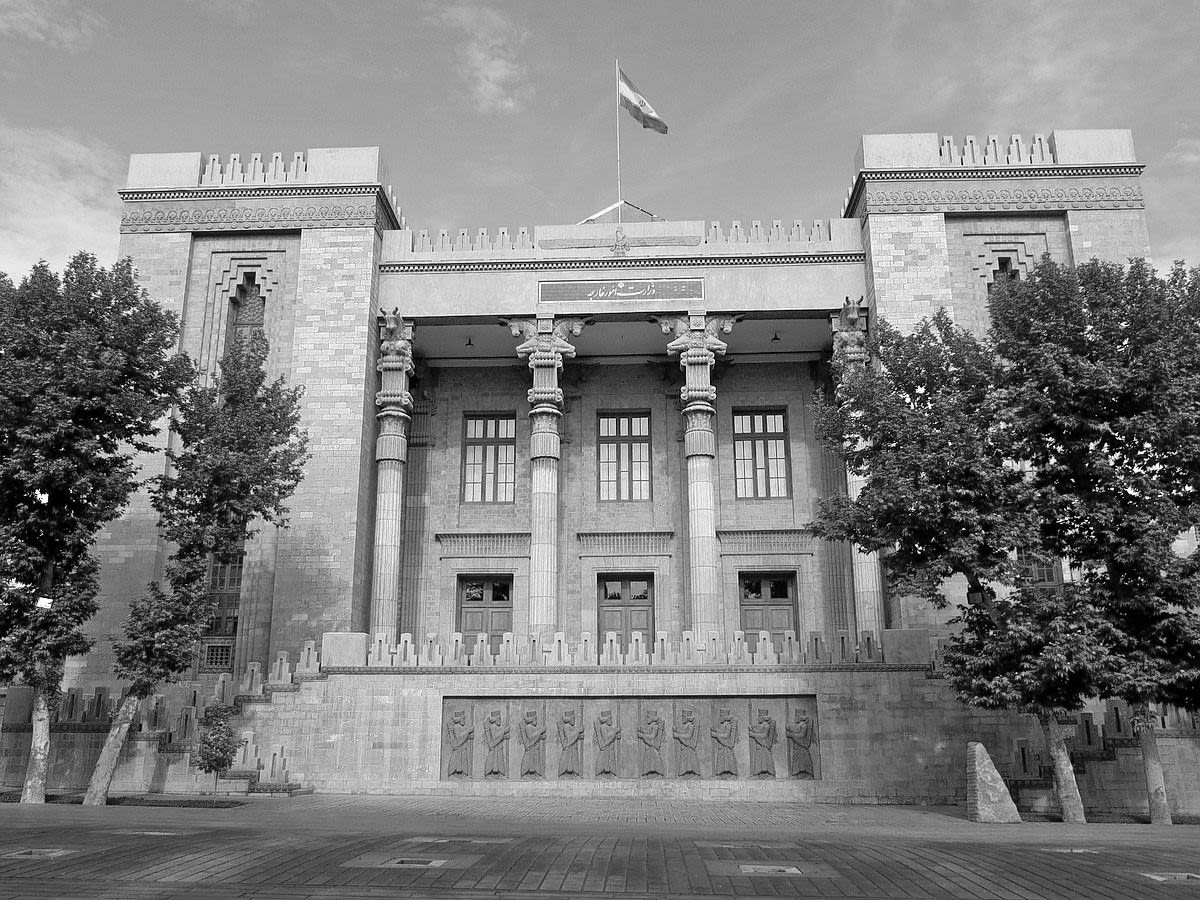
First Meeting in Vienna
On May 14, 2014, the IEI group gathered in a room at Palais Coburg hotel in Vienna for their first meeting, the documents show. Khatibzadeh’s efforts to hold the meeting in Tehran had failed after Takht-Ravanchi advised against it. “While the initial thought that Dr. Zahrani and I shared was to organize a workshop in Iran with the core group of this initiative, but because of your suggestion, logistical considerations and also complications of bringing all of them to Tehran in such a short notice, we agreed to find a venue in Europe,” Khatibzadeh told Takht-Ravanchi in the email on March 5, 2014.
Palais Coburg was the same venue where Iran and the JCPOA participant states held nuclear negotiations in 2014.
Zarif was in Vienna at that time for the nuclear negotiations with world powers, known as the P5+1. He attended the IEI meetings and talked to the network, according to an email sent by one of the attendees.
Eight Iranian analysts working at Western think tanks attended the meeting, the documents show, while some experts and diplomats from Tehran were also present.
Despite initial doubts, Zarif embraced the formation of the IEI and set out to transform the network into a distinctive entity to advance his foreign policy goals. In the first IEI meeting, he offered a roadmap and a philosophy for the network. Zarif said what Iran lacked in its nuclear negotiations was a skilled individual capable of crafting a compelling narrative to represent the nation's “interests.”
Adnan Tabatabai said in an email sent to Zarif five days after the meeting: “You were very right by saying that it is a shame that Iran has not its very own Bob Einhorn - someone who can foster attention on Iran's case the way Einhorn does for the US or the P5+1 for that matter.”
Robert Einhorn served as the US Department of State special advisor for non-proliferation and arms control and played a leading role in the formulation and execution of US policy toward Iran’s nuclear program, both with respect to sanctions and negotiations between Iran and the P5+1 countries. In 2013, he joined the Brookings Institution.
Zarif’s speech left the analysts intrigued. As Iranian officials tapped into the nationalist sentiment of the predominantly second-generation analysts, gave them access to high-ranking officials and extended invitations to visit Tehran, they reciprocated with eagerness to cooperate and support Tehran's new diplomatic strategy to show its nuclear program as peaceful and transparent.
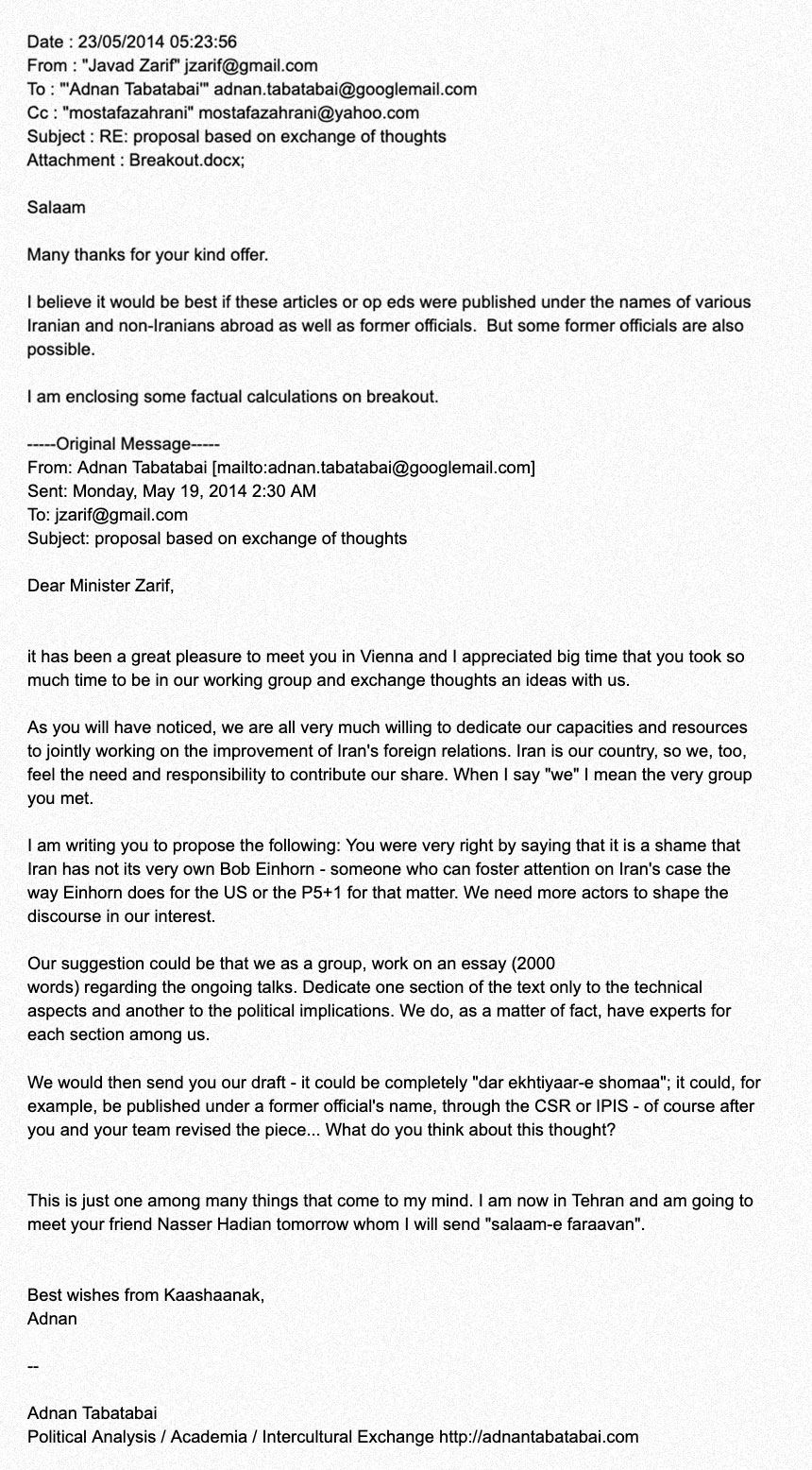
IEI’s Mission
After the Vienna meeting, the correspondence between the Iran analysts and the government picked up pace. The analysts shared their Iran-focused writings in Western outlets with Iranian foreign ministry officials.
Less than a month after the meeting in Vienna, Vaez sent one of his articles about solutions for the nuclear stand-off between Iran and the West to Zahrani to be reviewed before its publication. At that time, he was the ICG’s senior Iran analyst.
“I look forward to your comments and feedback,” he emailed Zahrani on June 4, 2014, and attached an article titled “The Conceptual Perils of Nuclear Diplomacy with Iran”.
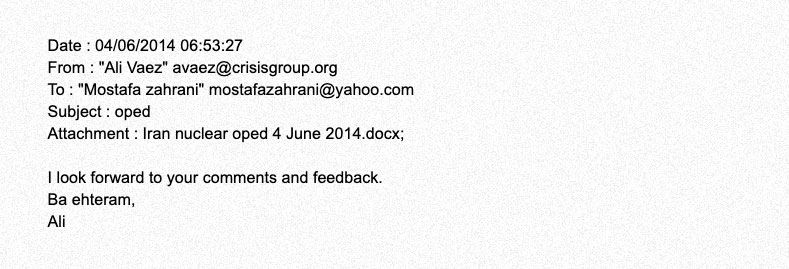
The email was forwarded by Zahrani to Zarif on the same day, and the article, which included some minor wording changes, was published 12 days later in the National Interest, under the headline “False Dilemmas in the Iran Talks.” It’s unclear if Zarif made any fixes as no reply email from him is in the chain.
Most think tanks have strict policies against sharing articles before publication with outside organizations.
The ICG’s Jobson said “Of course we do not preclear our work with any organization or government,” but added that they encourage staff to share relevant text with the policymakers to ensure accuracy and impartiality.
Less than a week after the IEI meeting, Adnan Tabatabai sent an email to Zarif and offered to prepare articles for Iran’s foreign ministry that he suggested could be published under the name of former Iranian officials.
“It has been a great pleasure to meet you in Vienna,” he told Zarif in an email on May 19, 2014.
“Our suggestion could be that we as a group, work on an essay (2000 words) regarding the ongoing talks… We would then send you our draft - it could be completely "dar ekhtiyaar-e shoma" [at your disposal]; it could, for example, be published under a former official's name, through the CSR or IPIS - of course after you and your team revise the piece.”
Zarif responded four days later, accepting the ghostwriting offer and suggesting that “these articles or Op-Eds” would be published under the names of various Iranian and non-Iranians abroad as well as former officials. Zahrani was copied in the reply.
Adnan Tabatabai worked as a consultant with the ICG after the JCPOA was signed in 2015, according to a person familiar with the situation, as he had access to top Iranian officials and conducted interviews with them for the think tank. Adnan Tabatabai is also consulted by European policymakers, according to the CARPO’s website. He is not related to Ariane Tabatabai.
Almost three weeks after the IEI meeting in Vienna, Ariane Tabatabai and Dina Esfandiary wrote an article for the Bulletin of the Atomic Scientists about Iran’s nuclear fuel supply needs. Tabatabai sent the link of the article to Zahrani and said, “As I mentioned last week, Dina and I wrote an article about the nuclear fuel of Bushehr [nuclear power plant] for the Bulletin which was published today. Our goal was to show what is said in the West - that Iran does not need more than 1500 centrifuges - is wrong, and that Iran should not be expected to reduce the number of its centrifuges." The email was forwarded by Zahrani to Zarif on the same day.
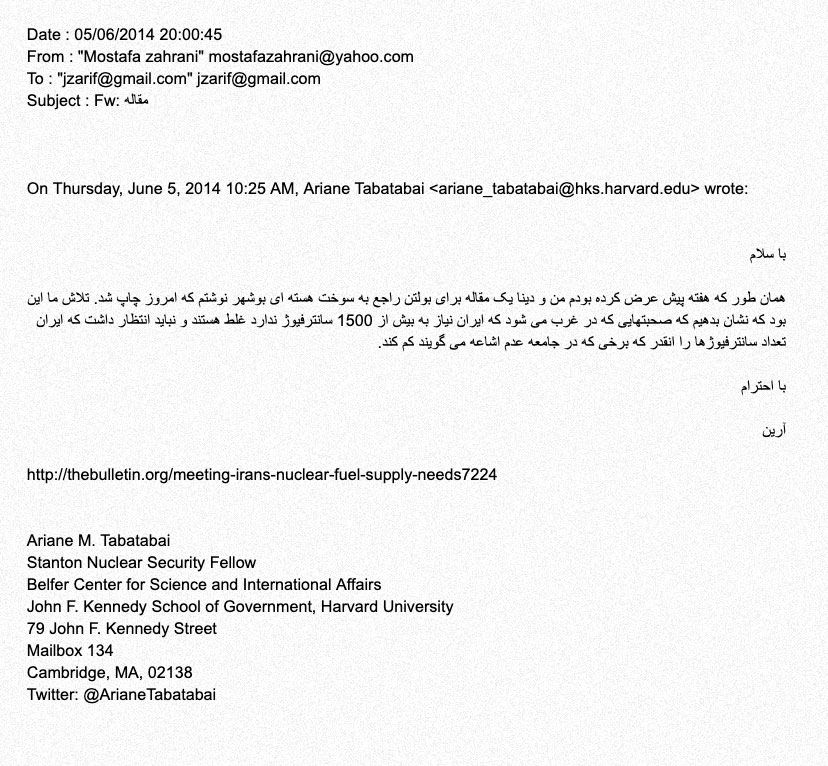
About a month later, on July 10, Ariane Tabatabai shared a link with Zahrani to her article in the Boston Globe addressing 'five myths about Iran's nuclear program'. The article aimed to explain and justify the fatwa issued by Iran’s Supreme Leader Ali Khamenei, forbidding the production or use of nuclear weapons. Skeptics question the fatwa’s sincerity due to general distrust in the Iranian government, and the inherent flexibility of religious interpretations.
The IEI group planned their second meeting in Tehran on October 8, 2014, on the sidelines of a conference co-hosted by ECFR and the IPIS.
In an email dated September 14, 2014, Khatibzadeh told Takht-Ravanchi that following the IEI’s meeting in Vienna, the group had been active, publishing articles and holding meetings. Khatibzadeh said that Zahrani was planning to facilitate a one-day workshop in Tehran “with the presence of eight core members of the network.”
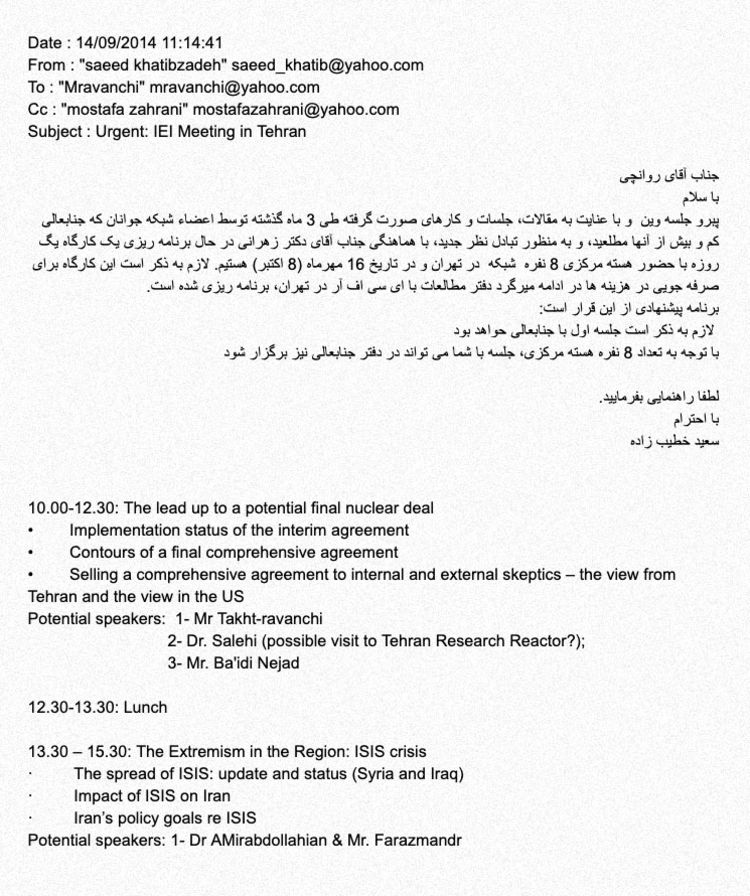
The agenda of the one-day workshop in Tehran was focused on “selling a comprehensive [nuclear] agreement to internal and external skeptics”, the documents show, with a possible visit to the Tehran Research Reactor, a nuclear facility.
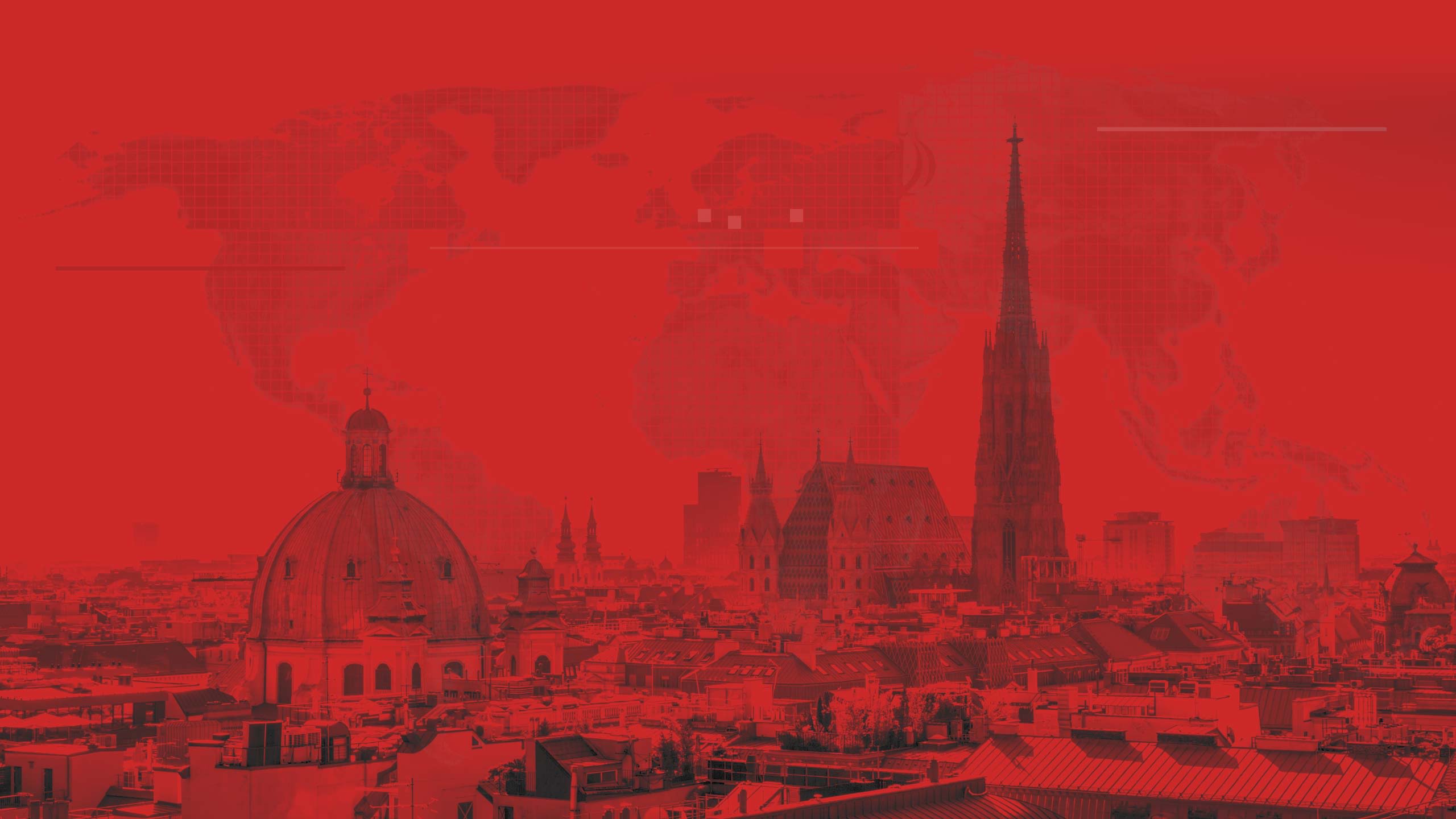
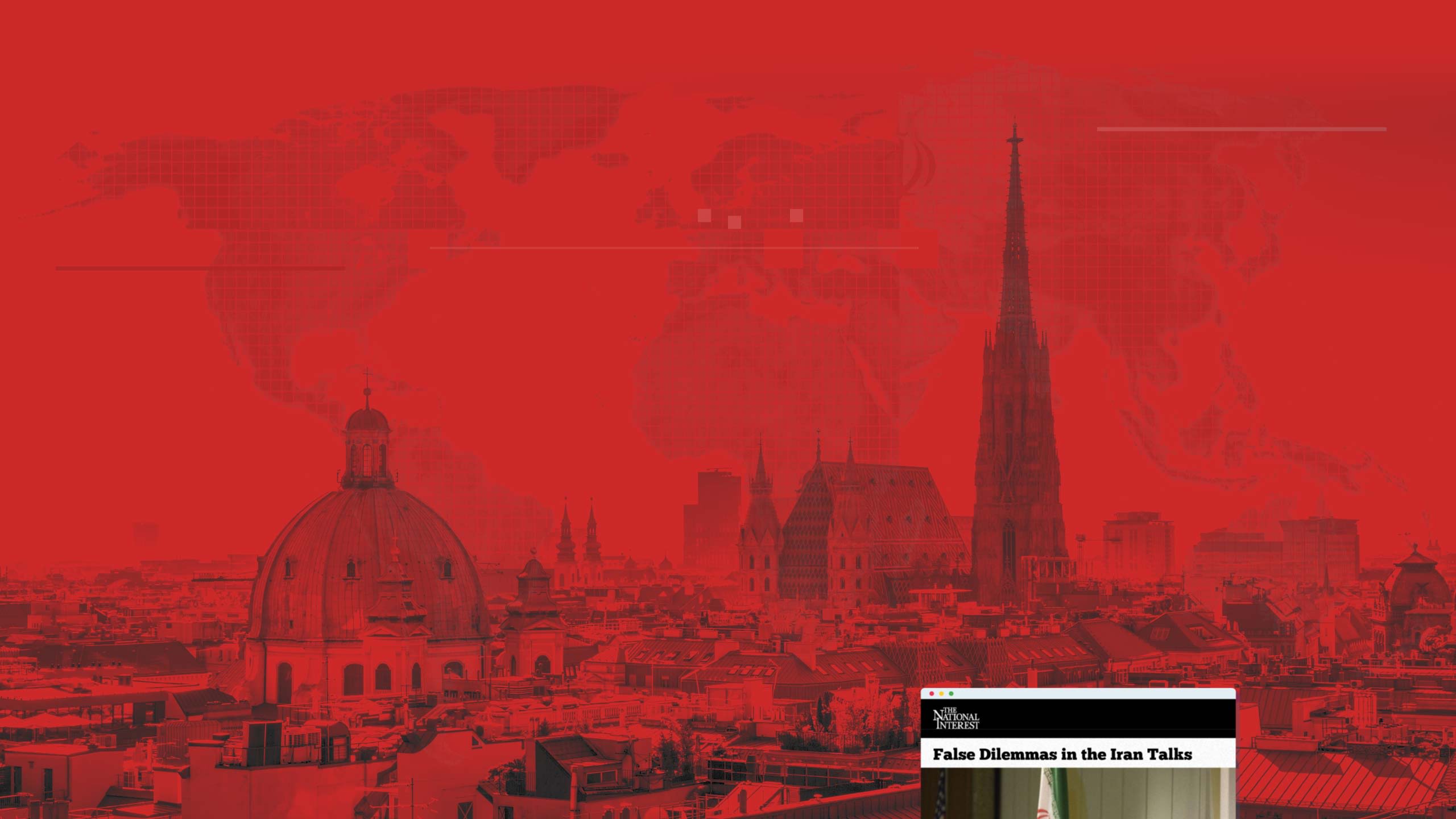
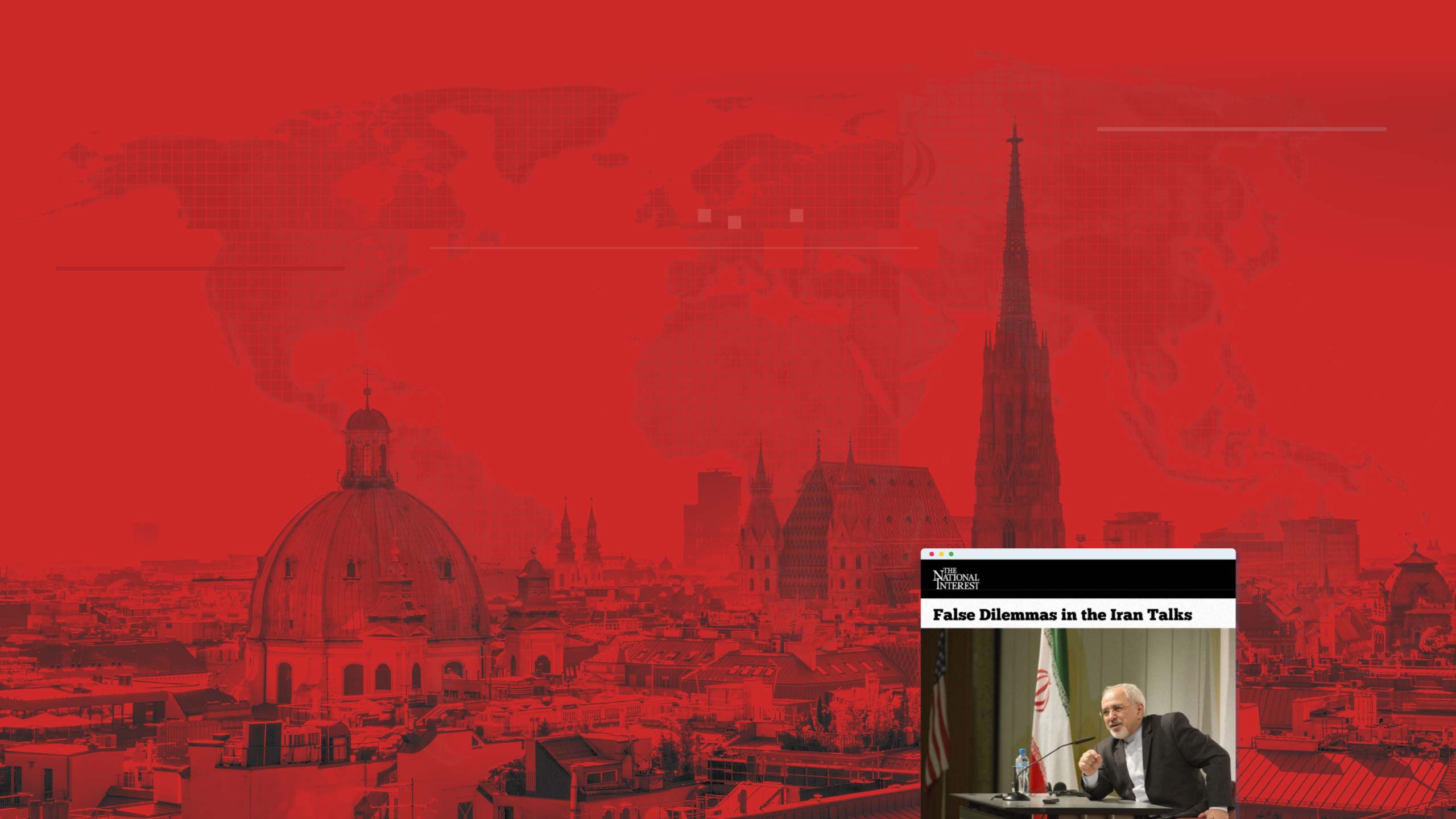
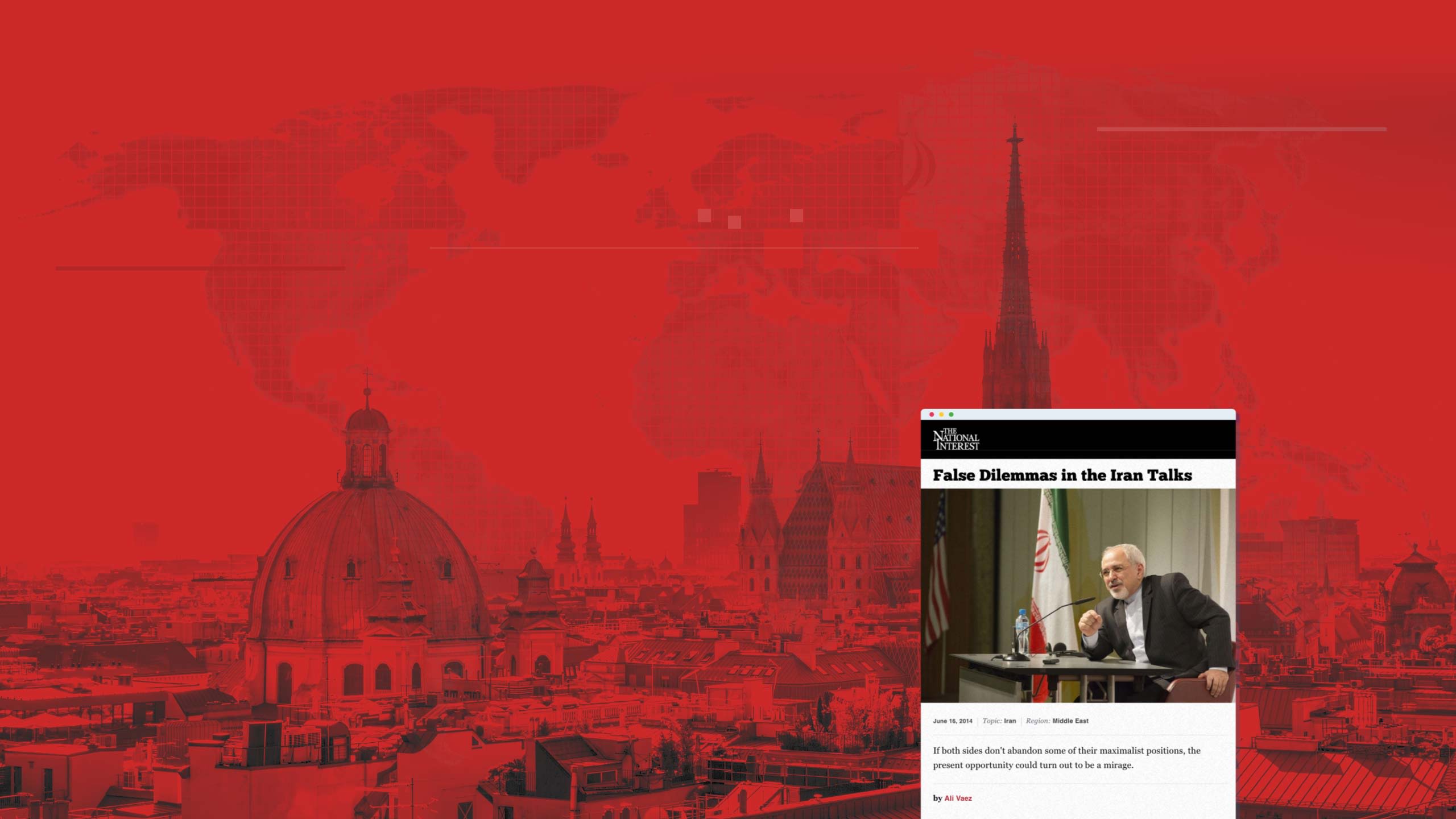
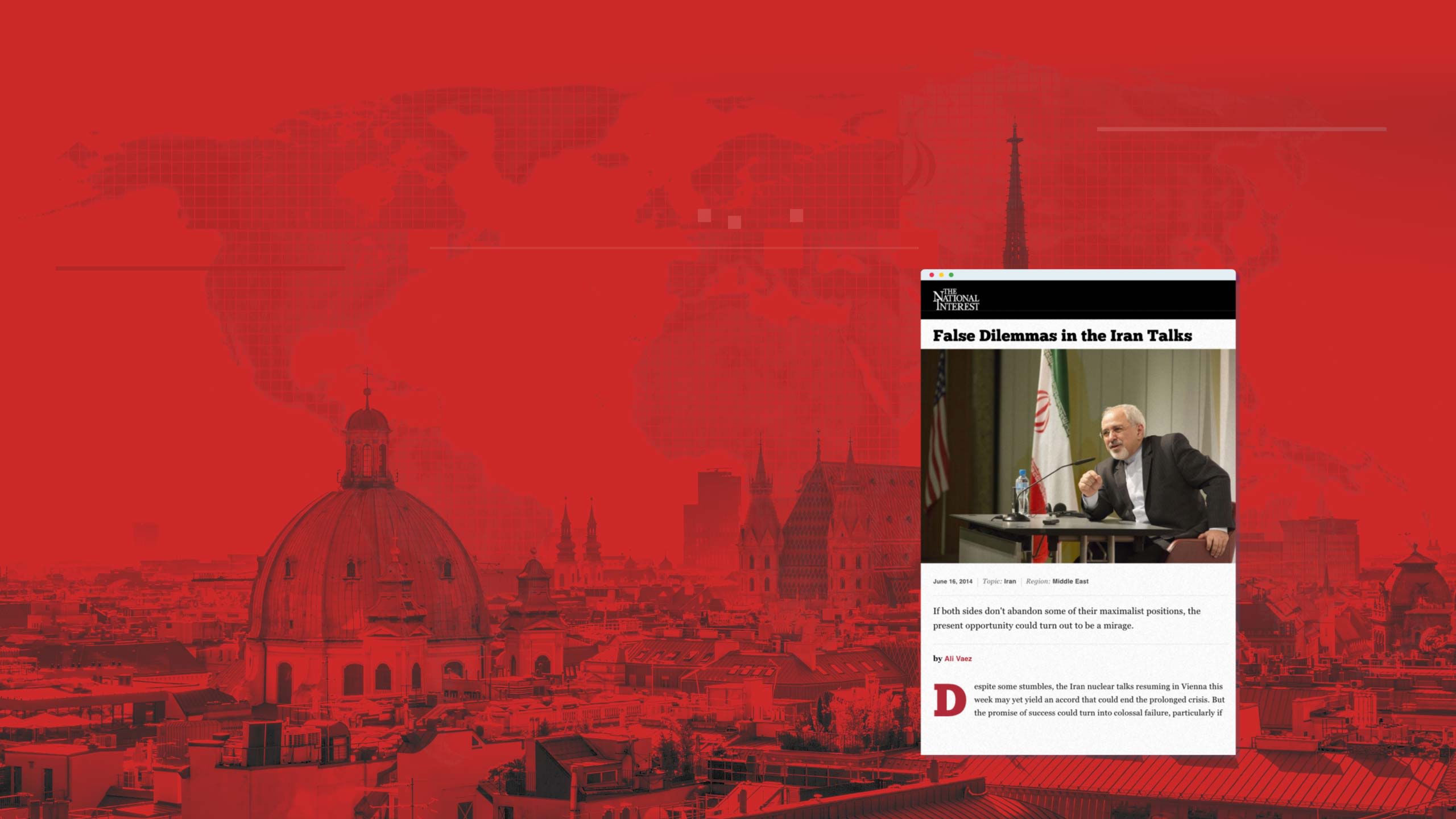
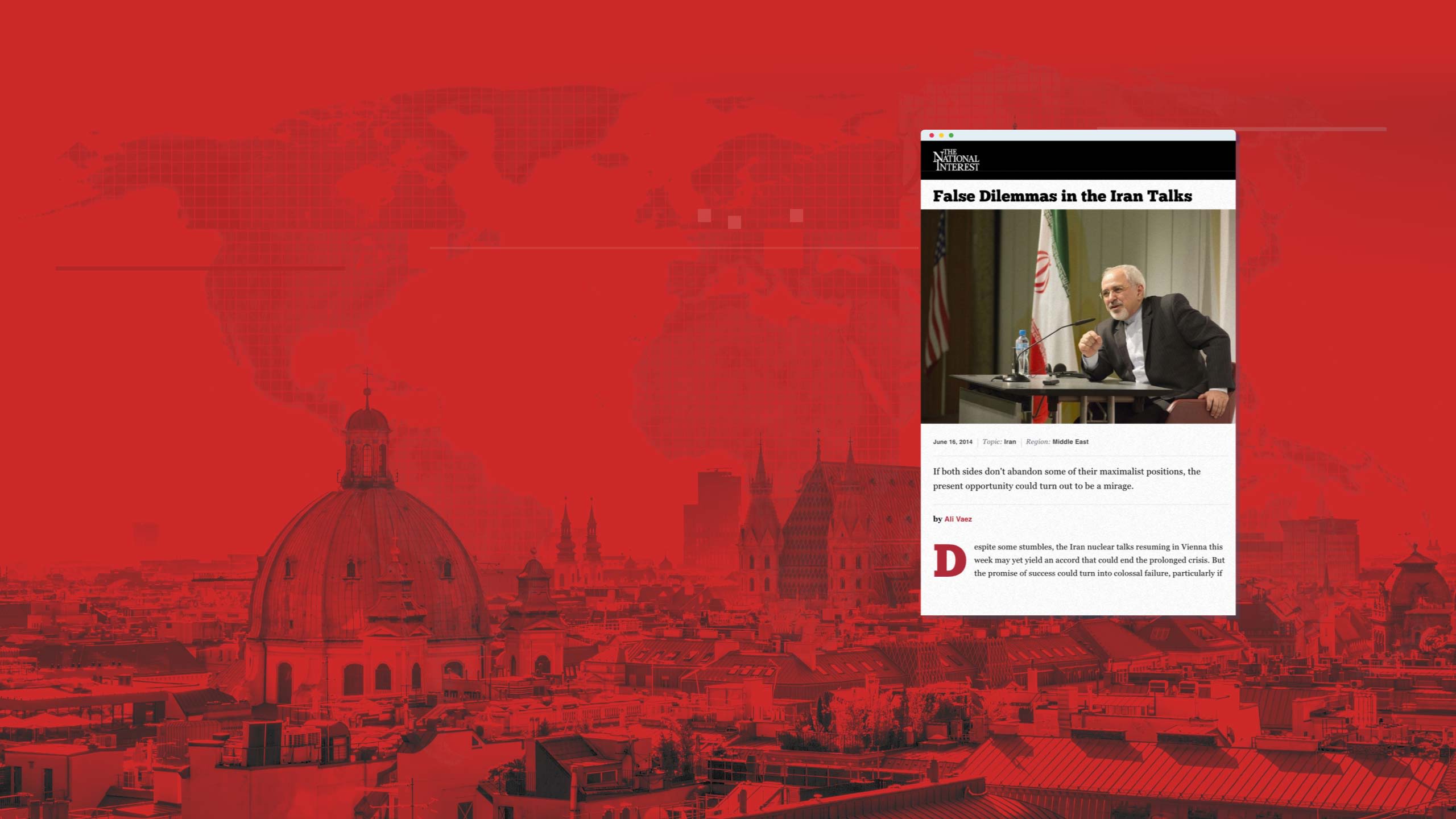
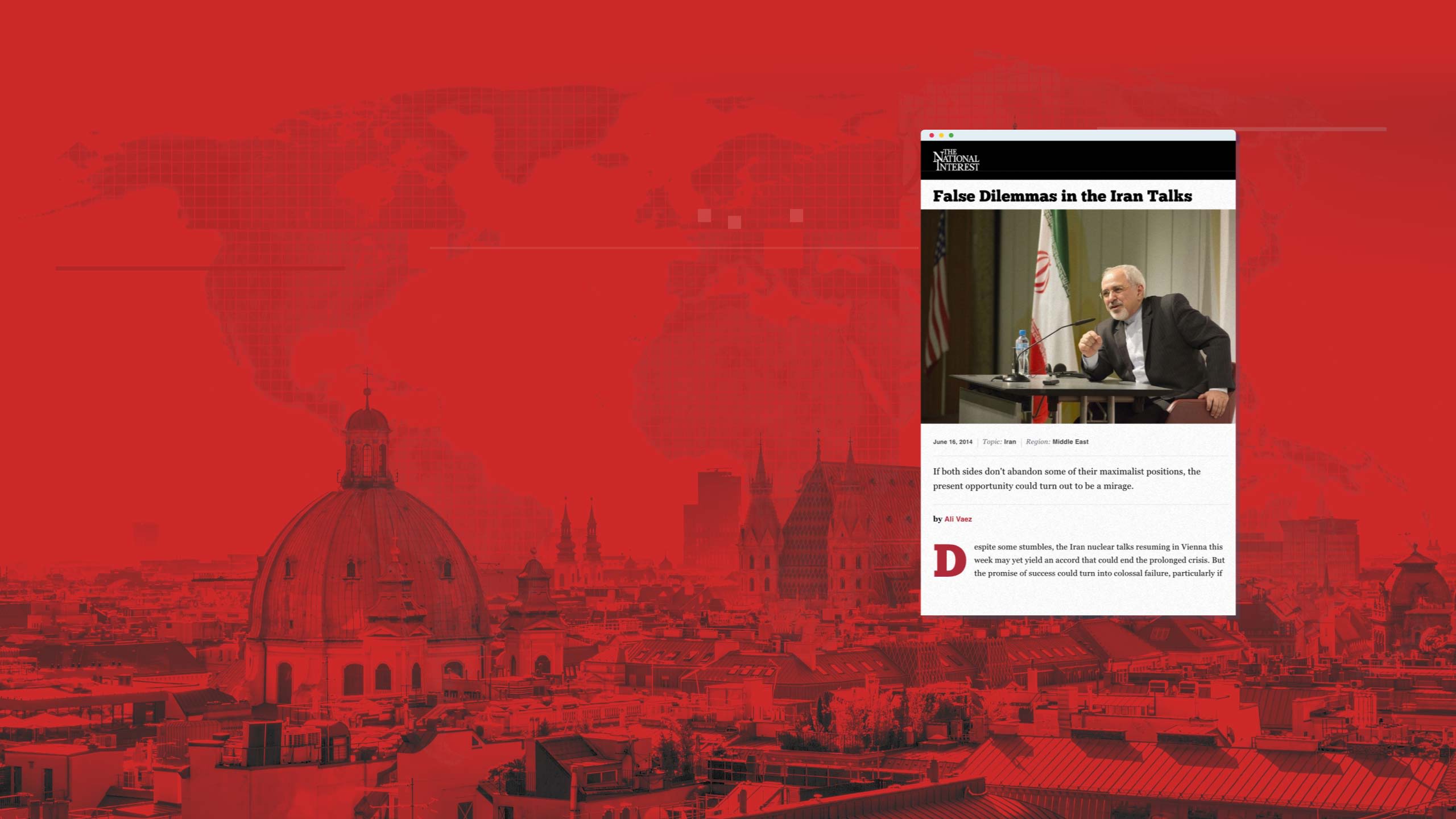
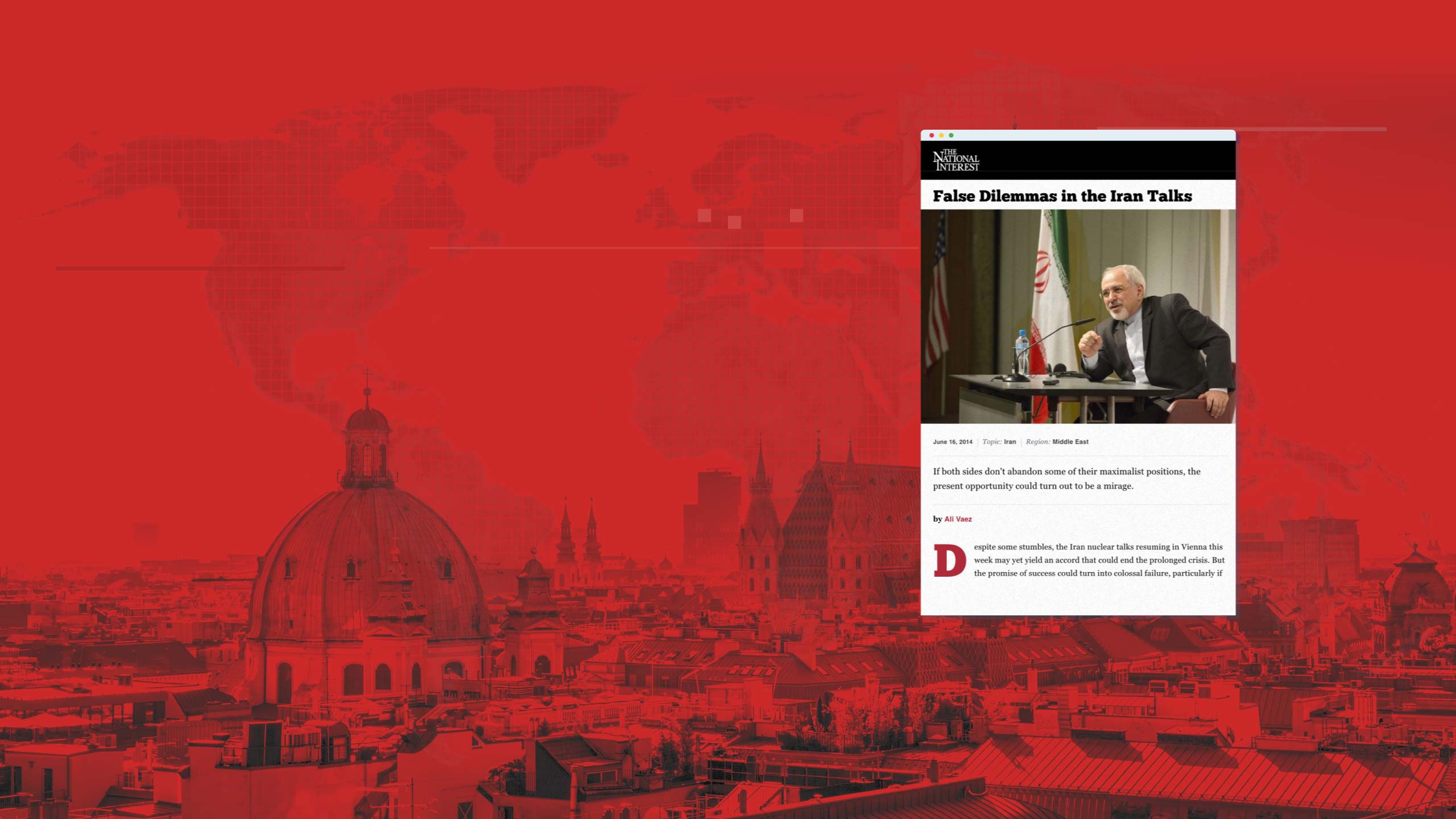
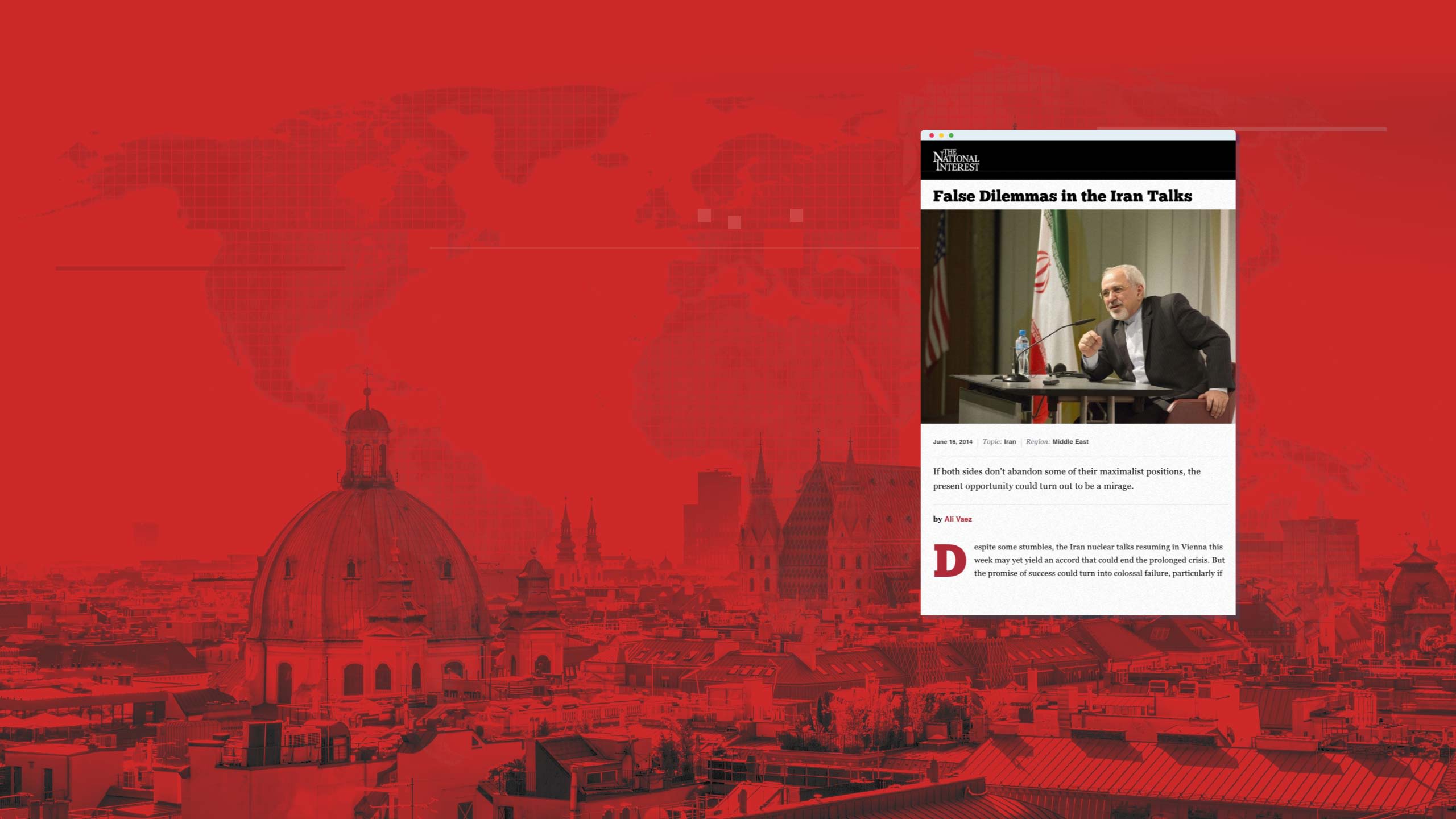
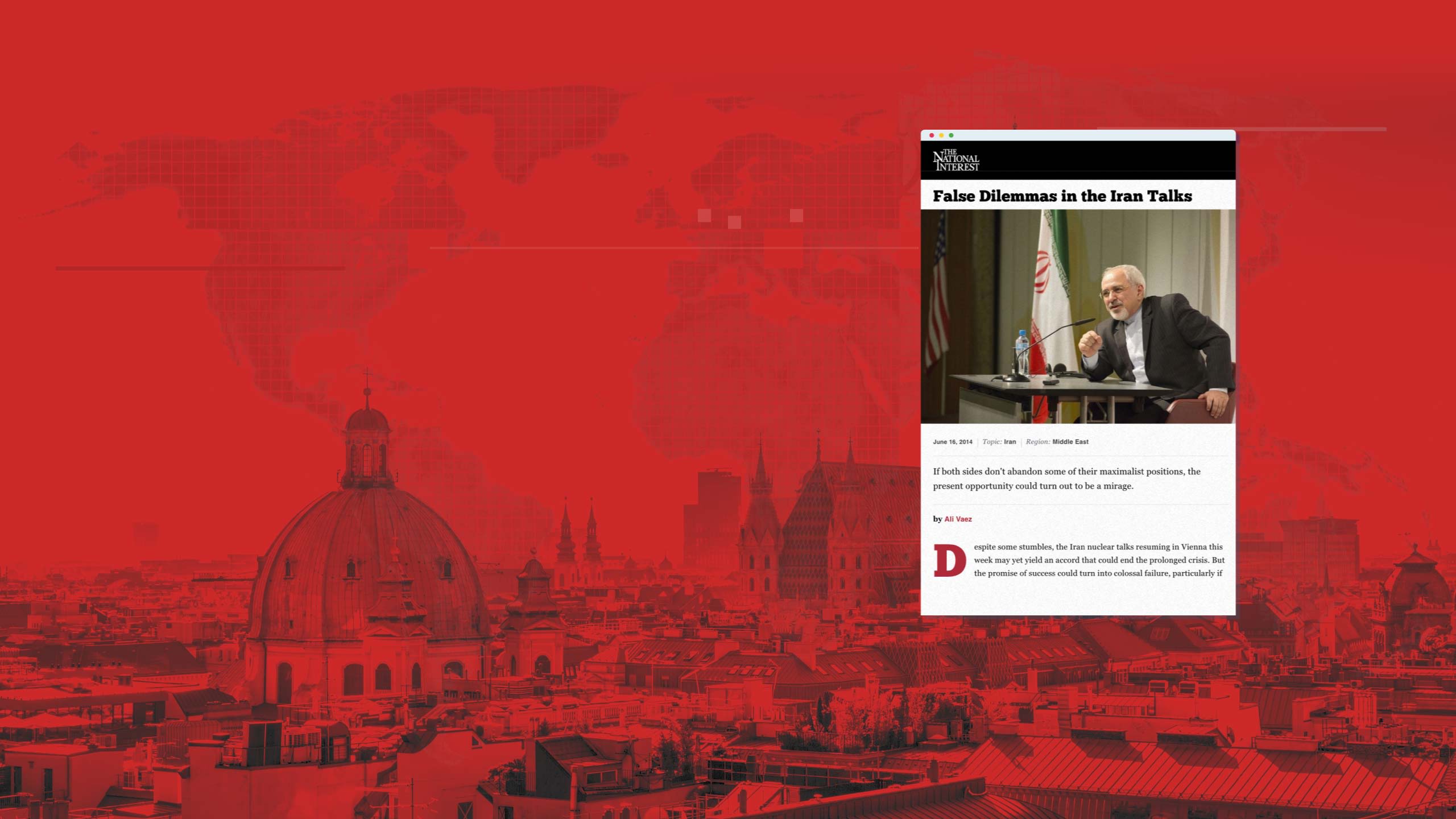
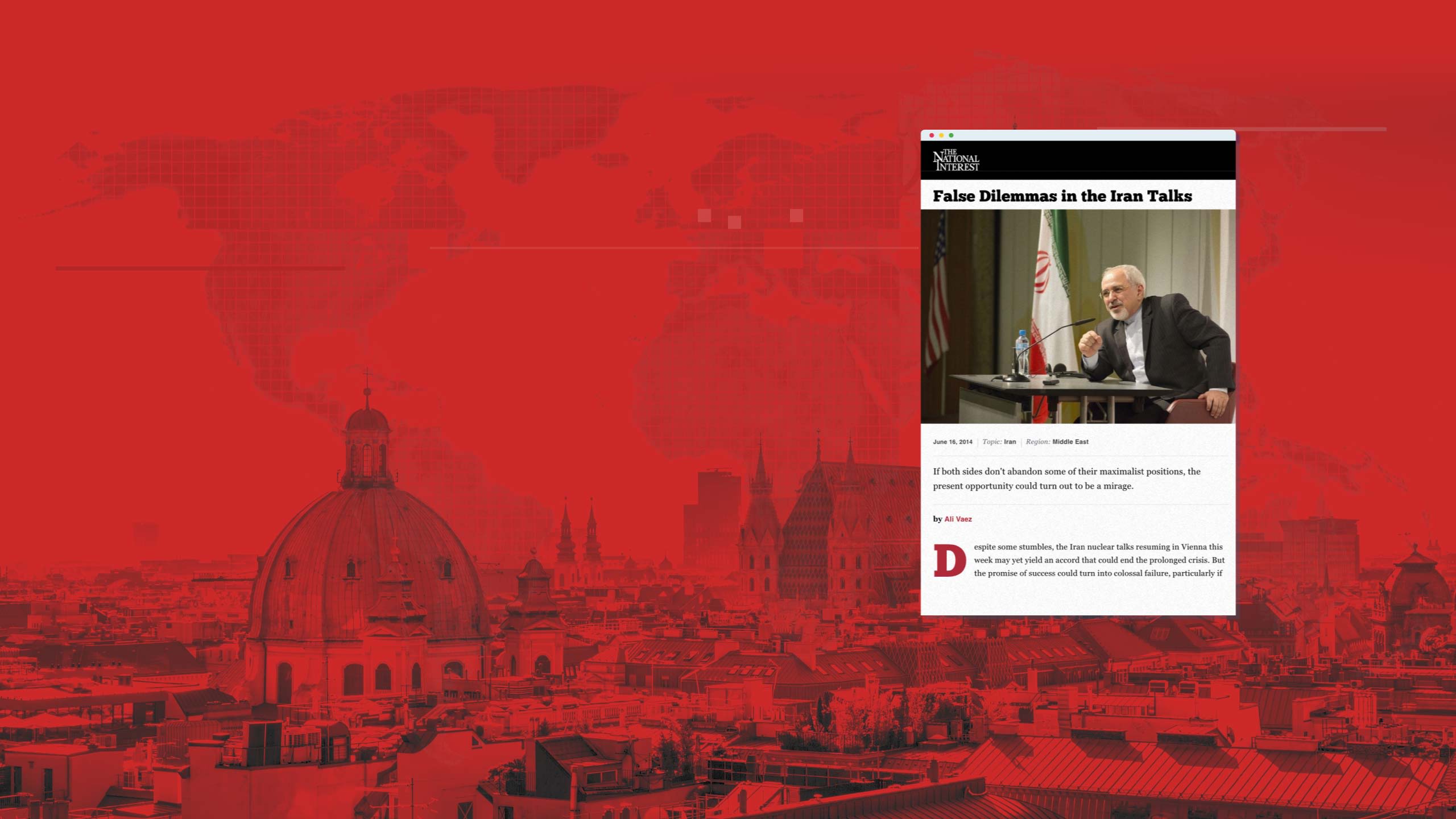
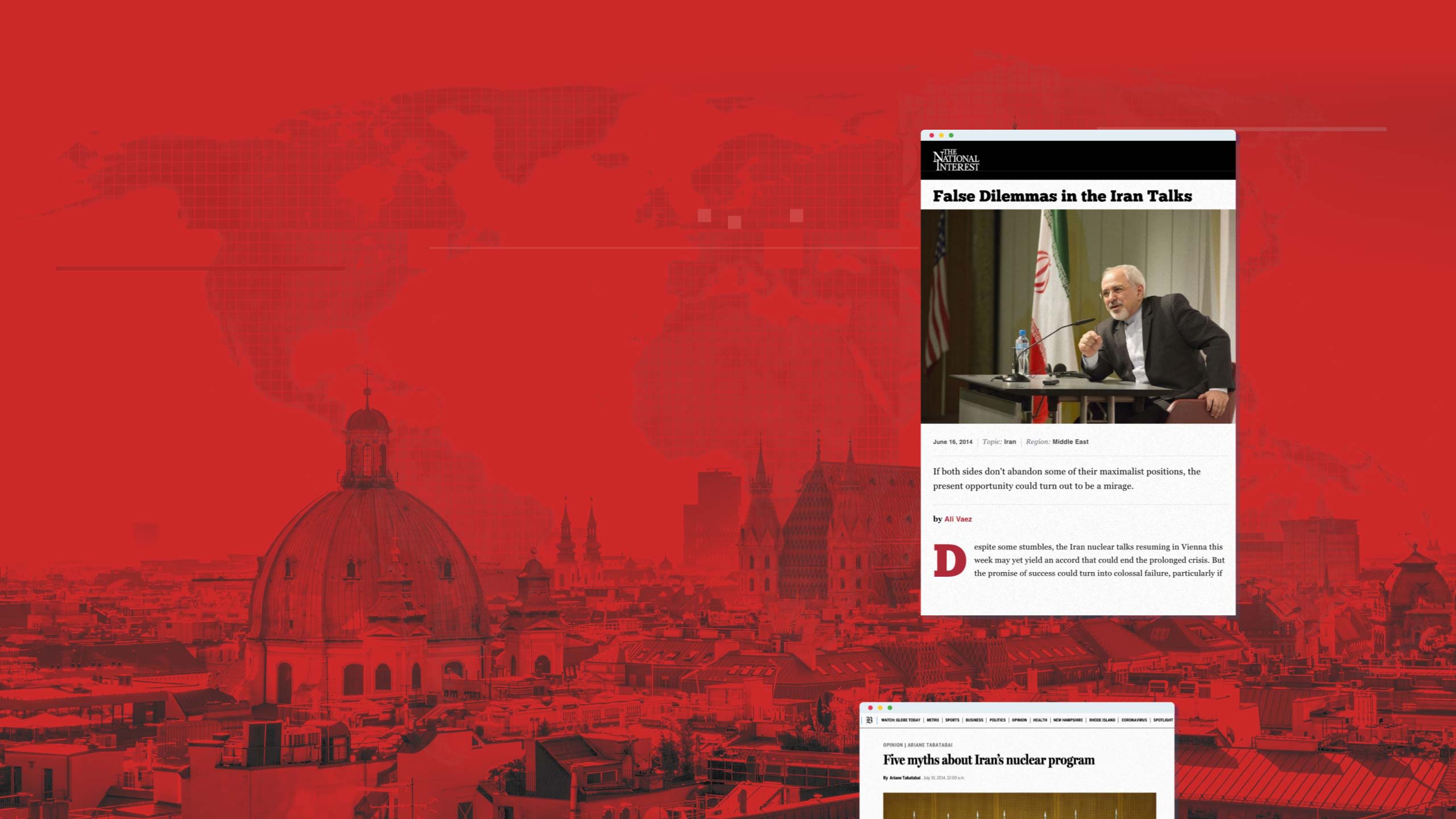
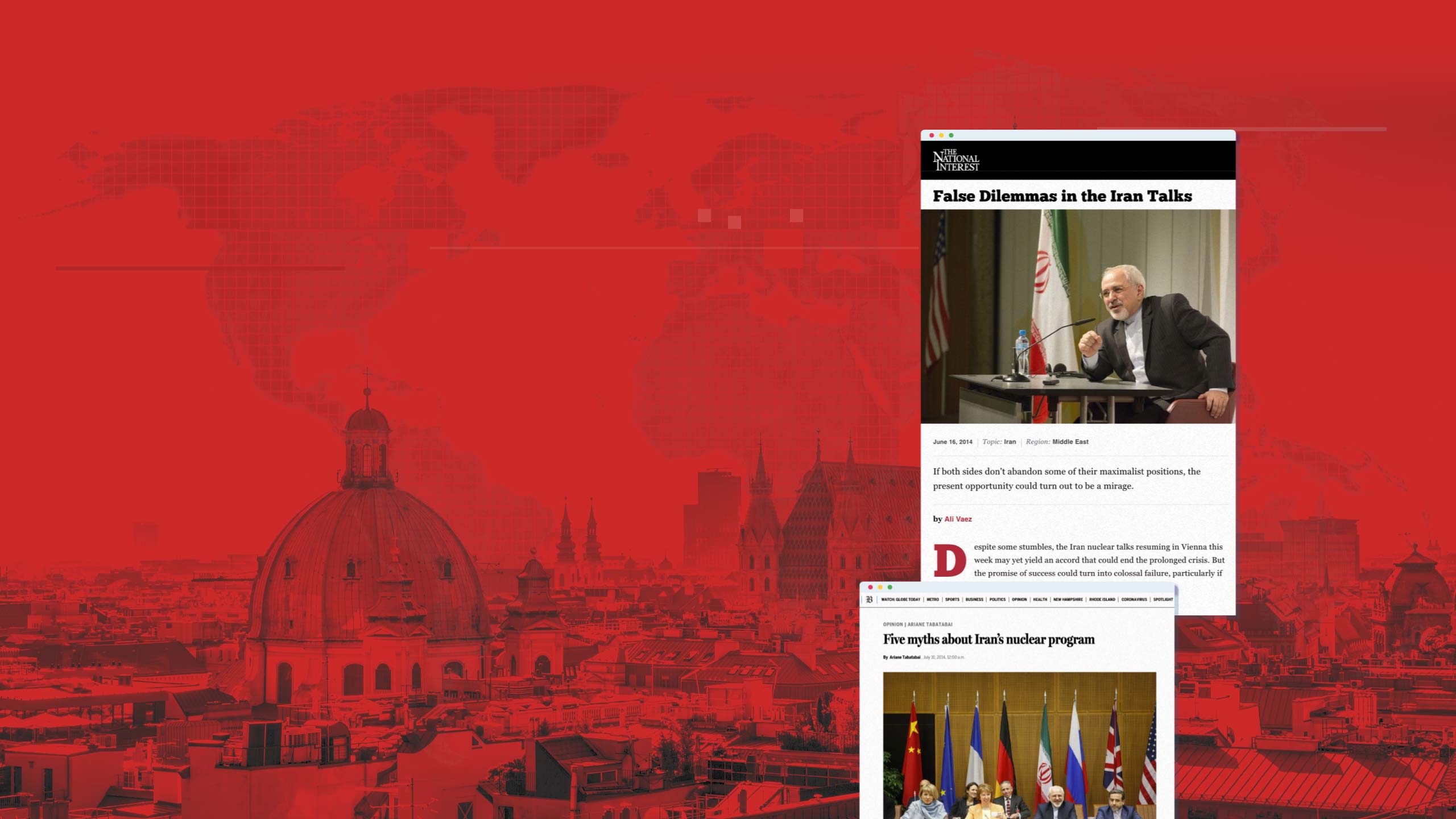
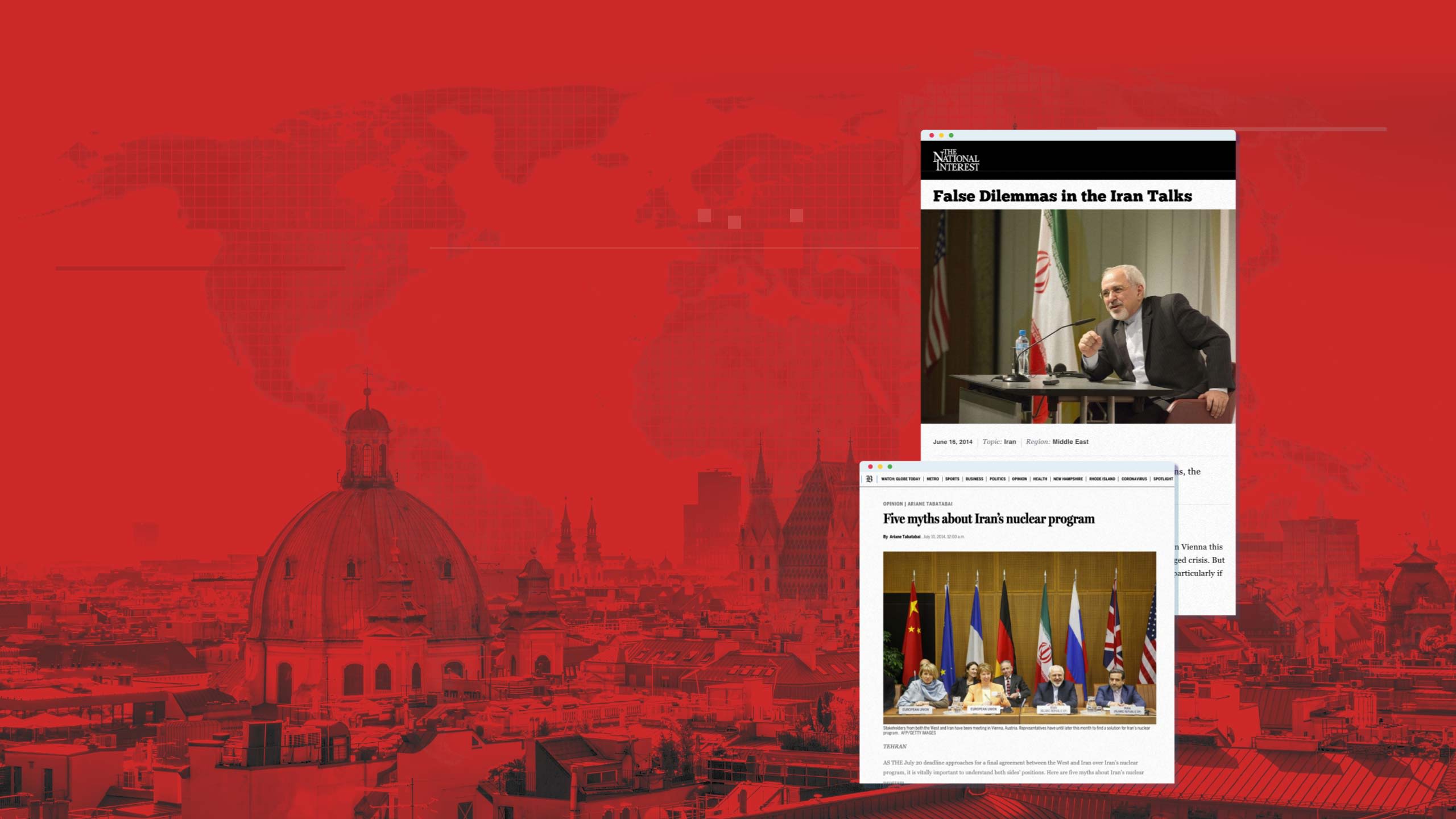
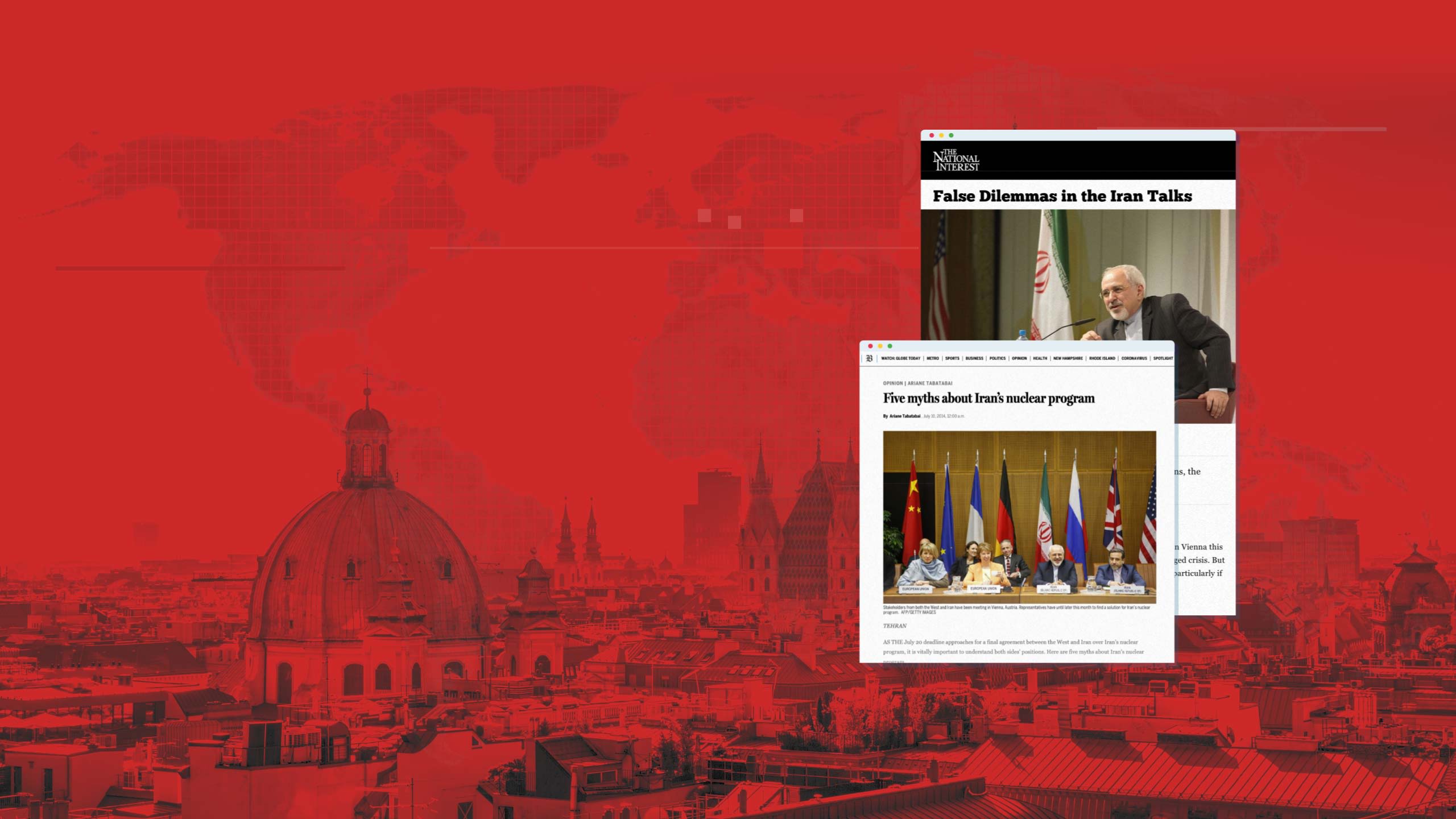
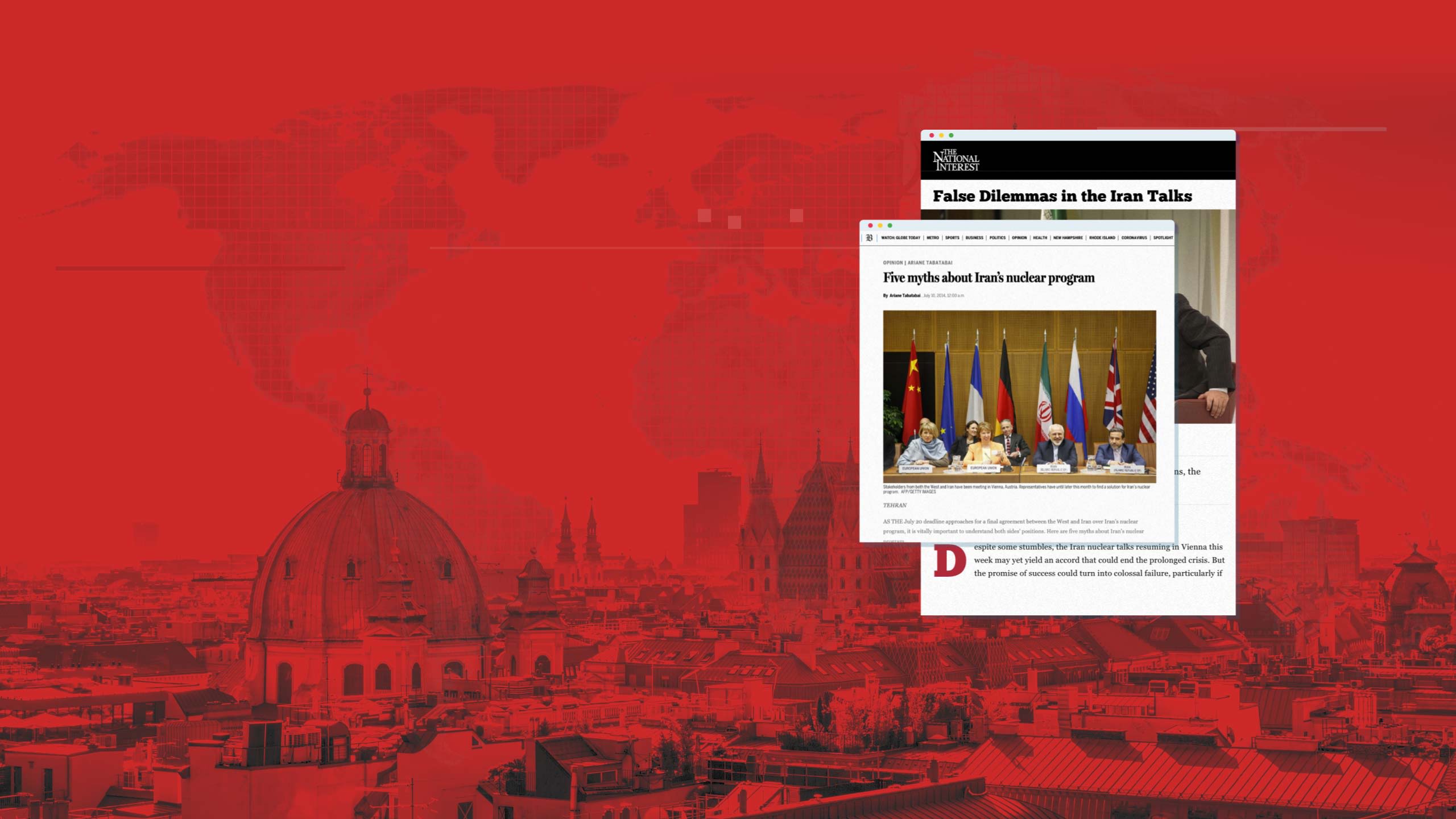
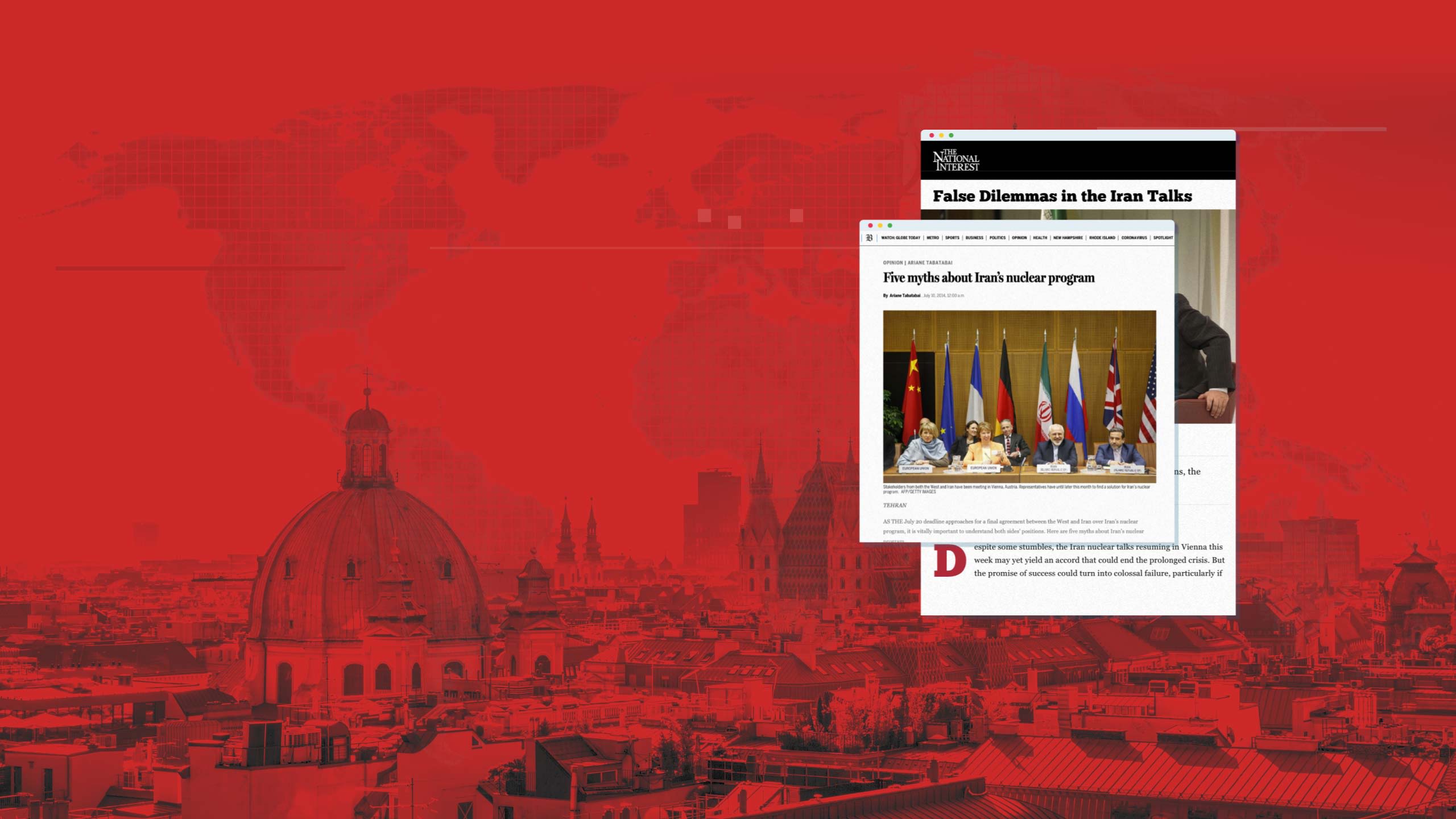
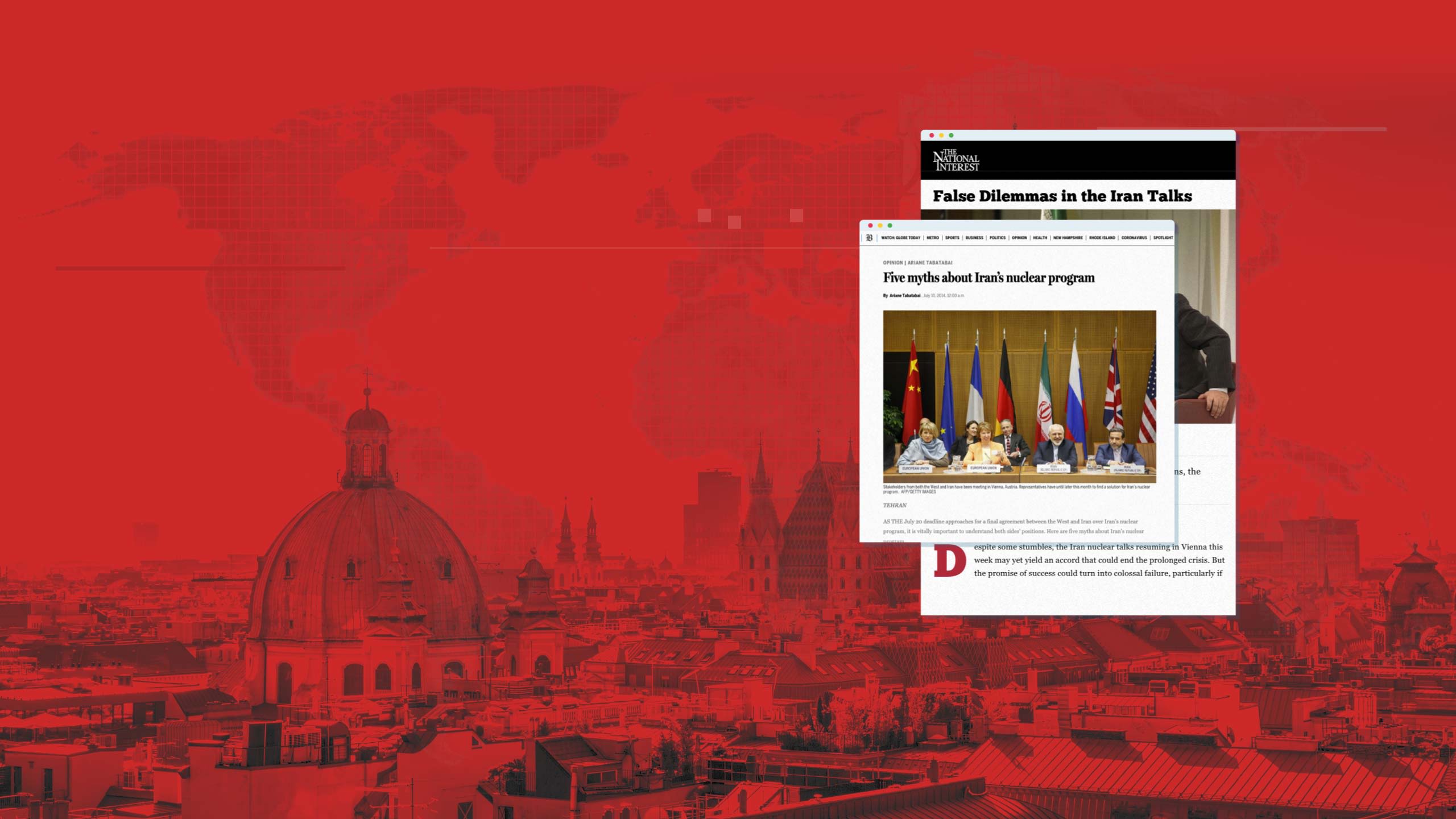
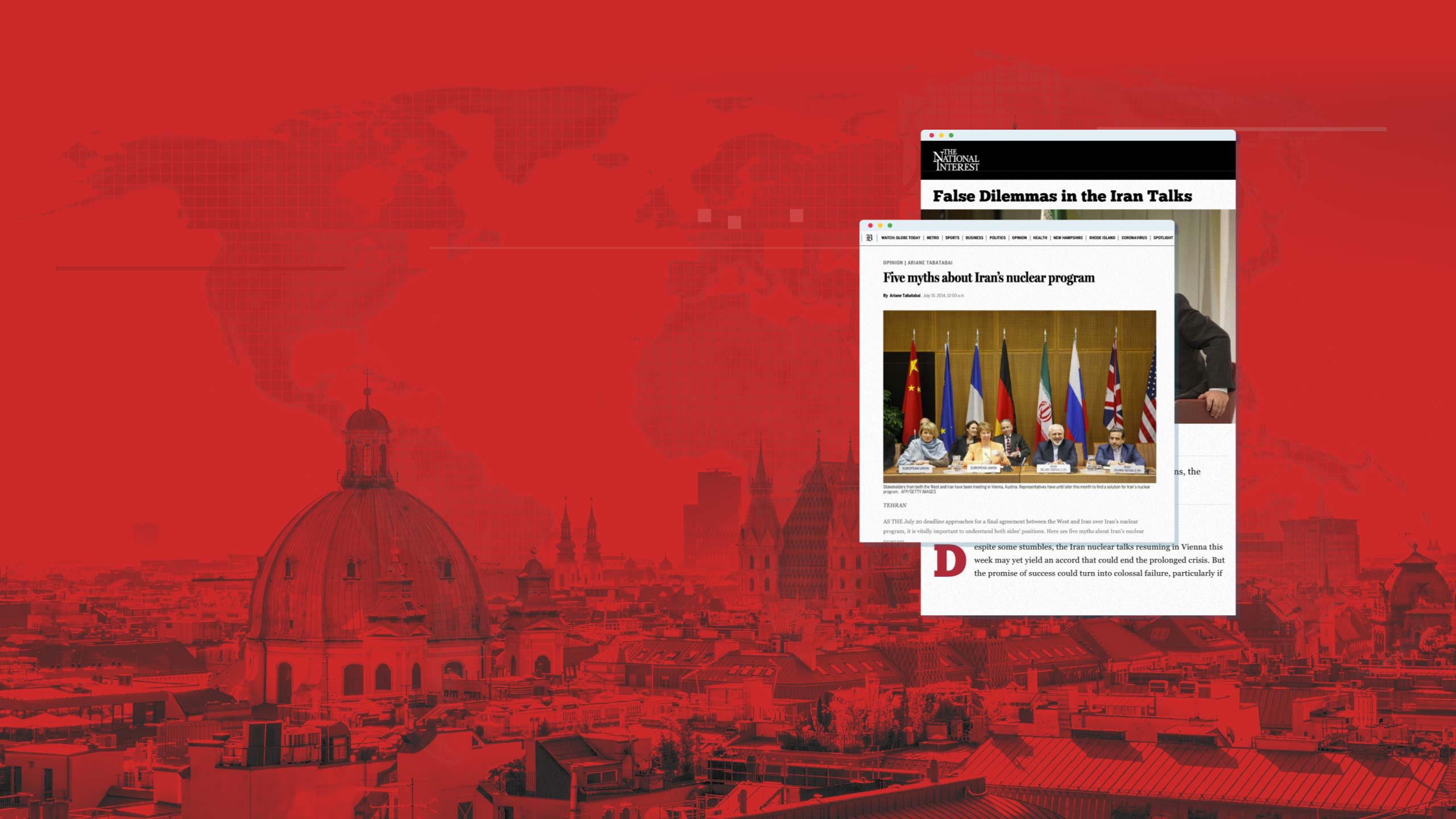
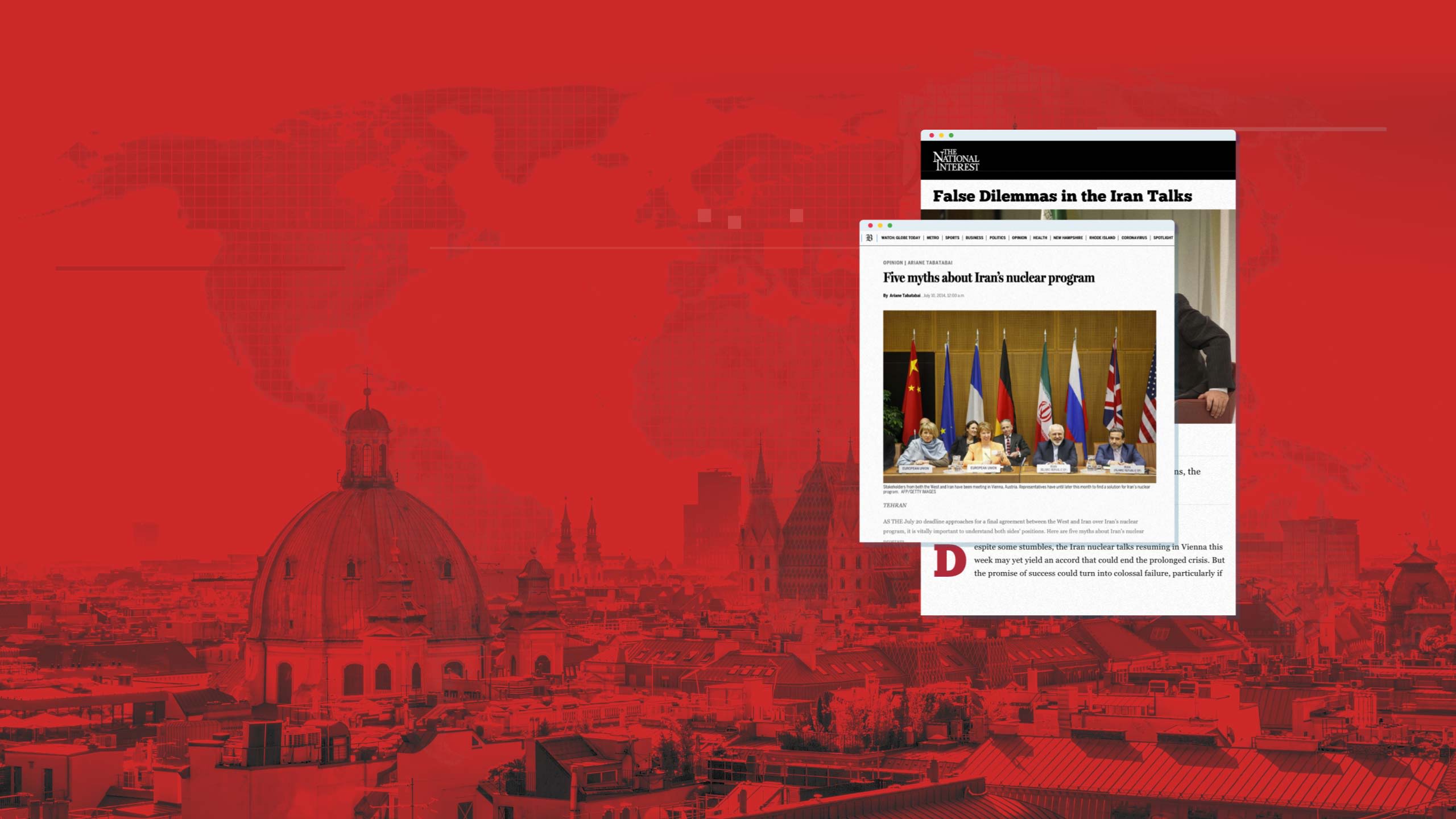
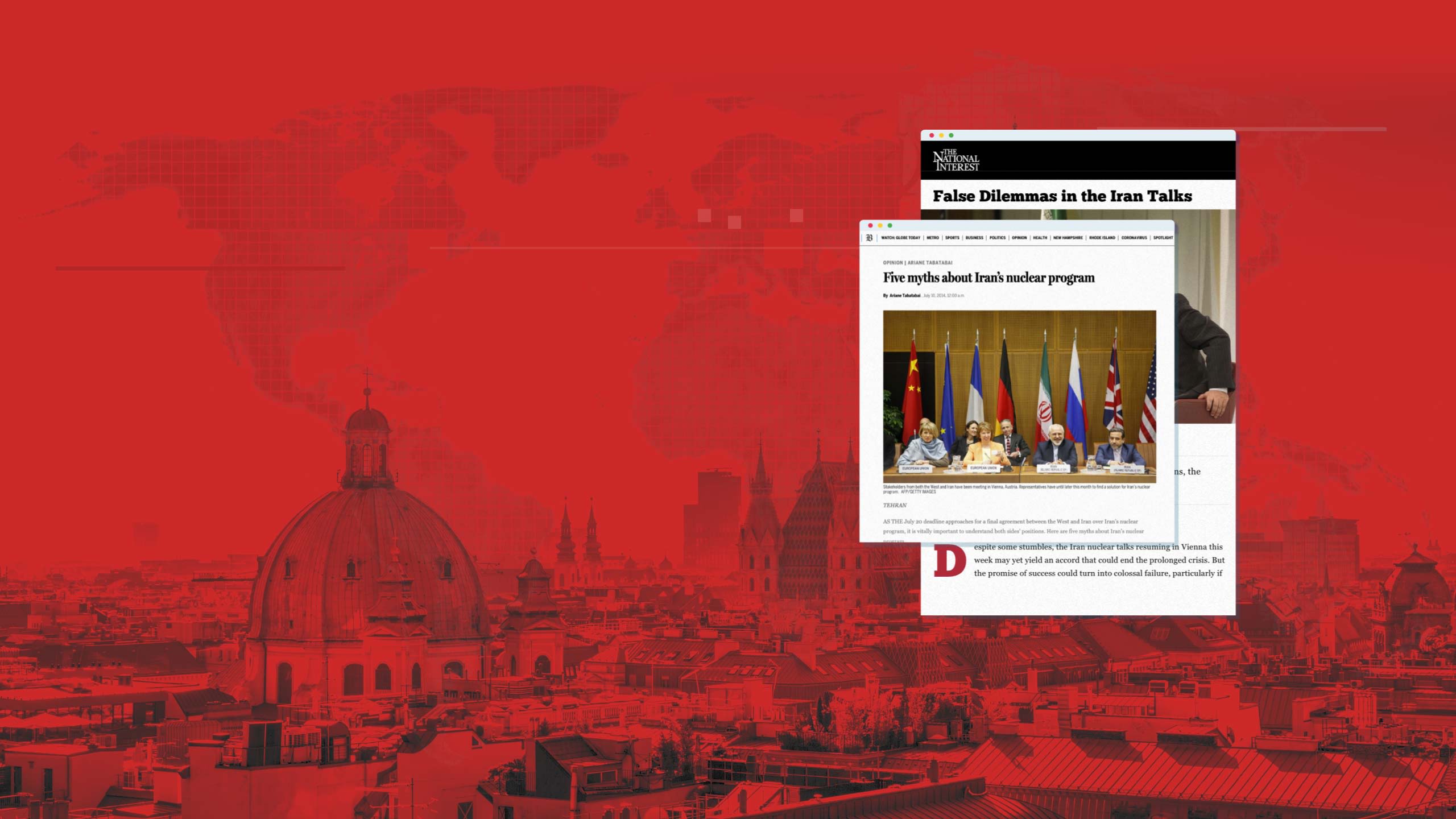
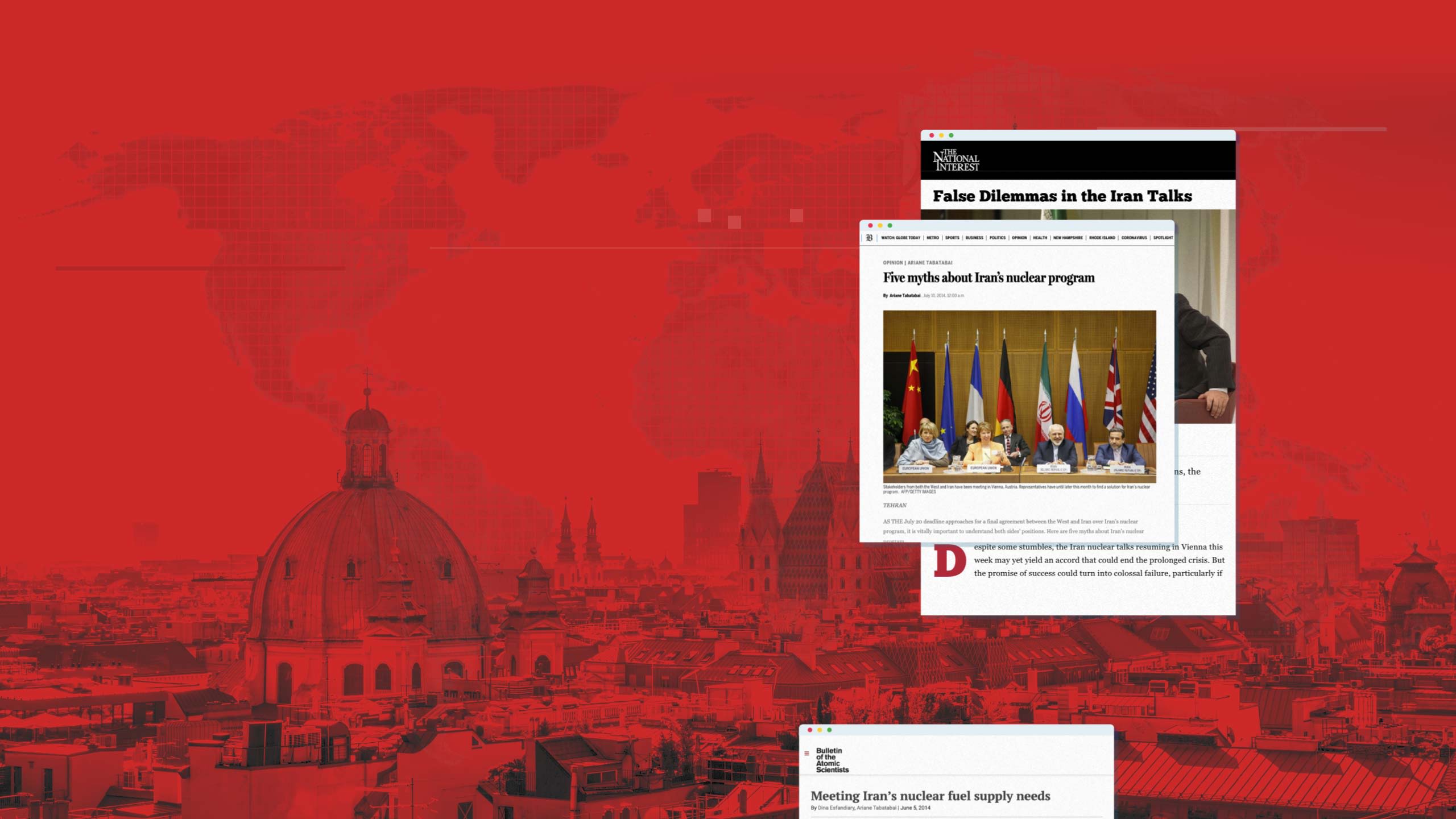
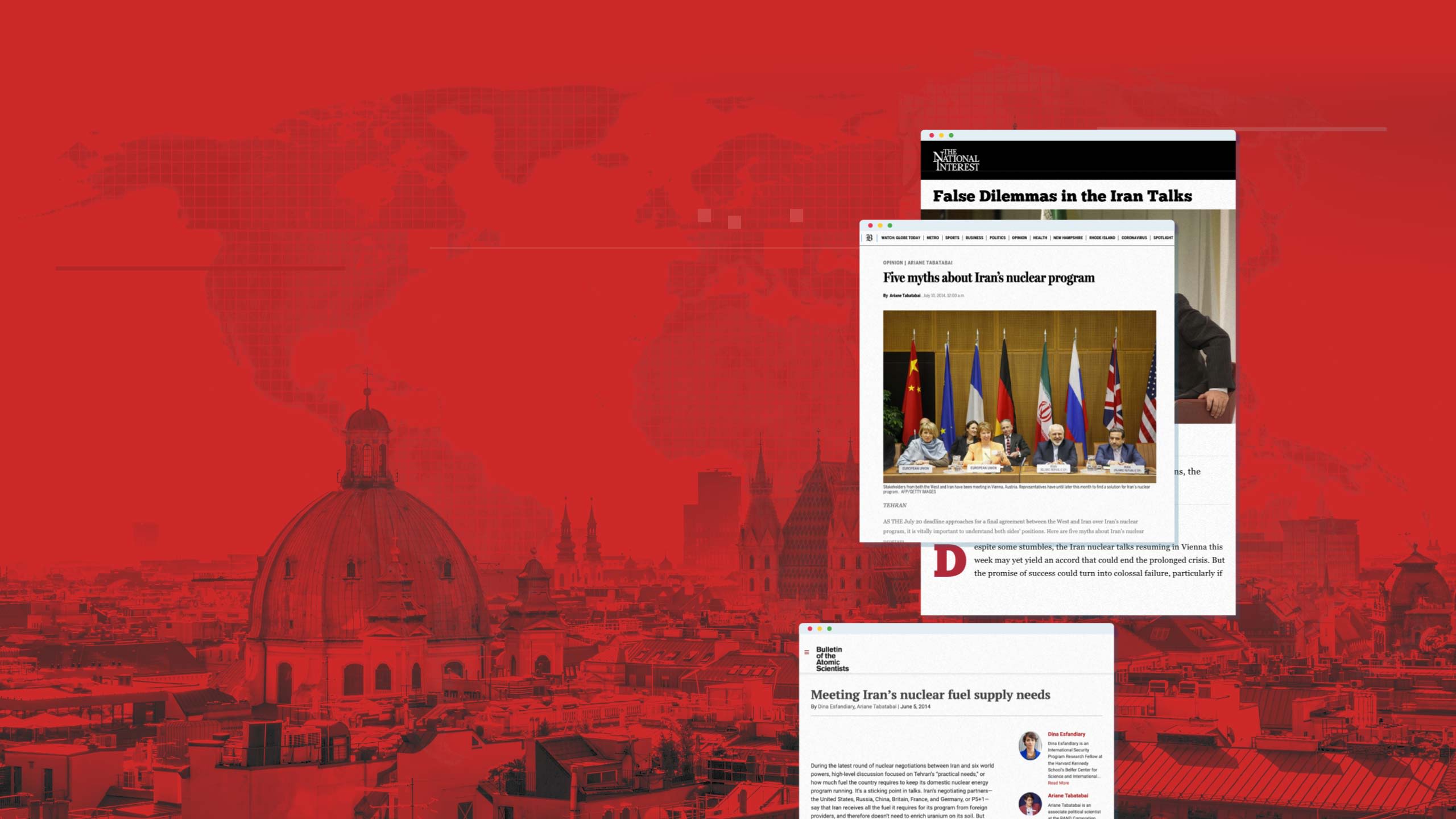
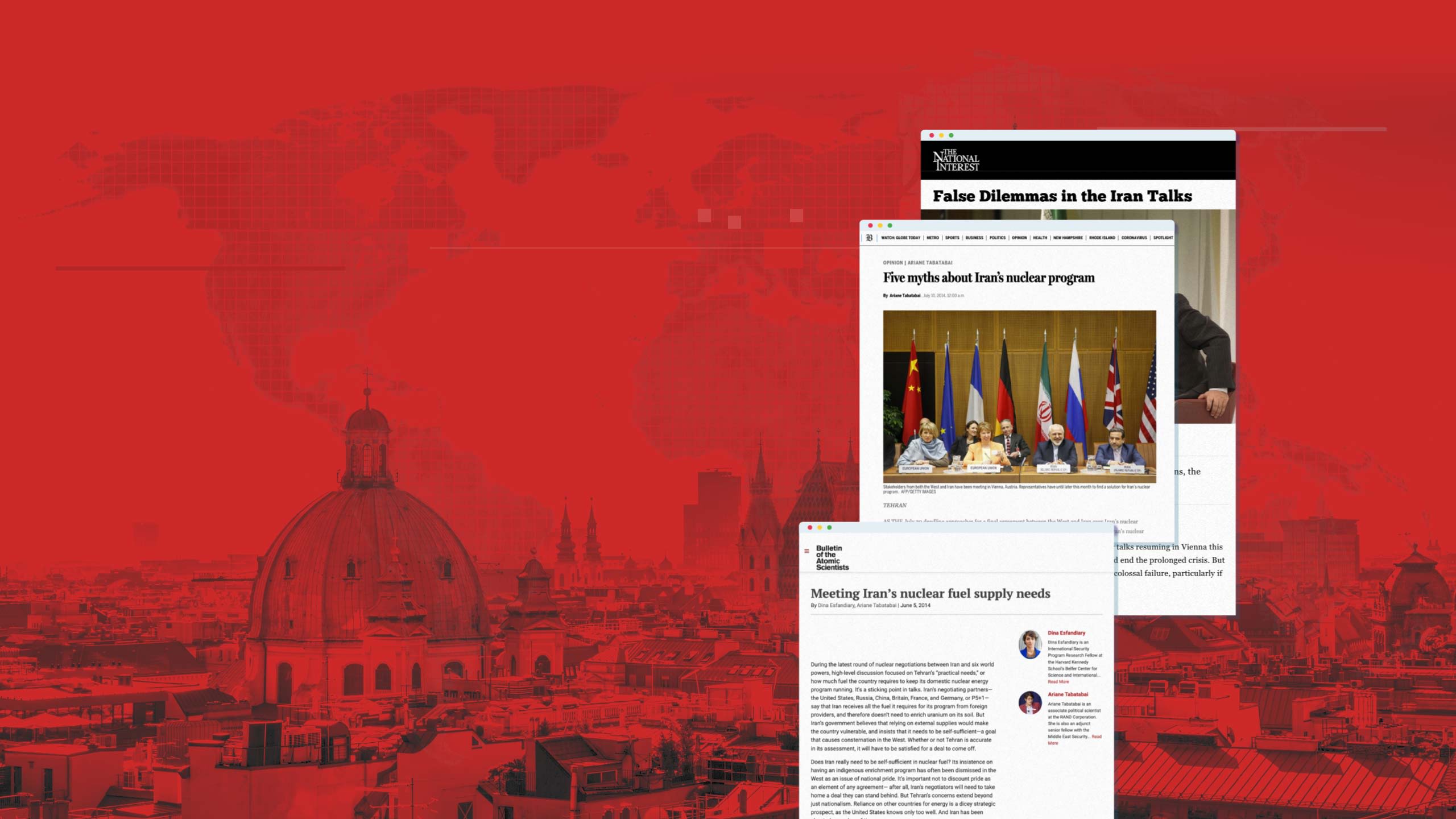
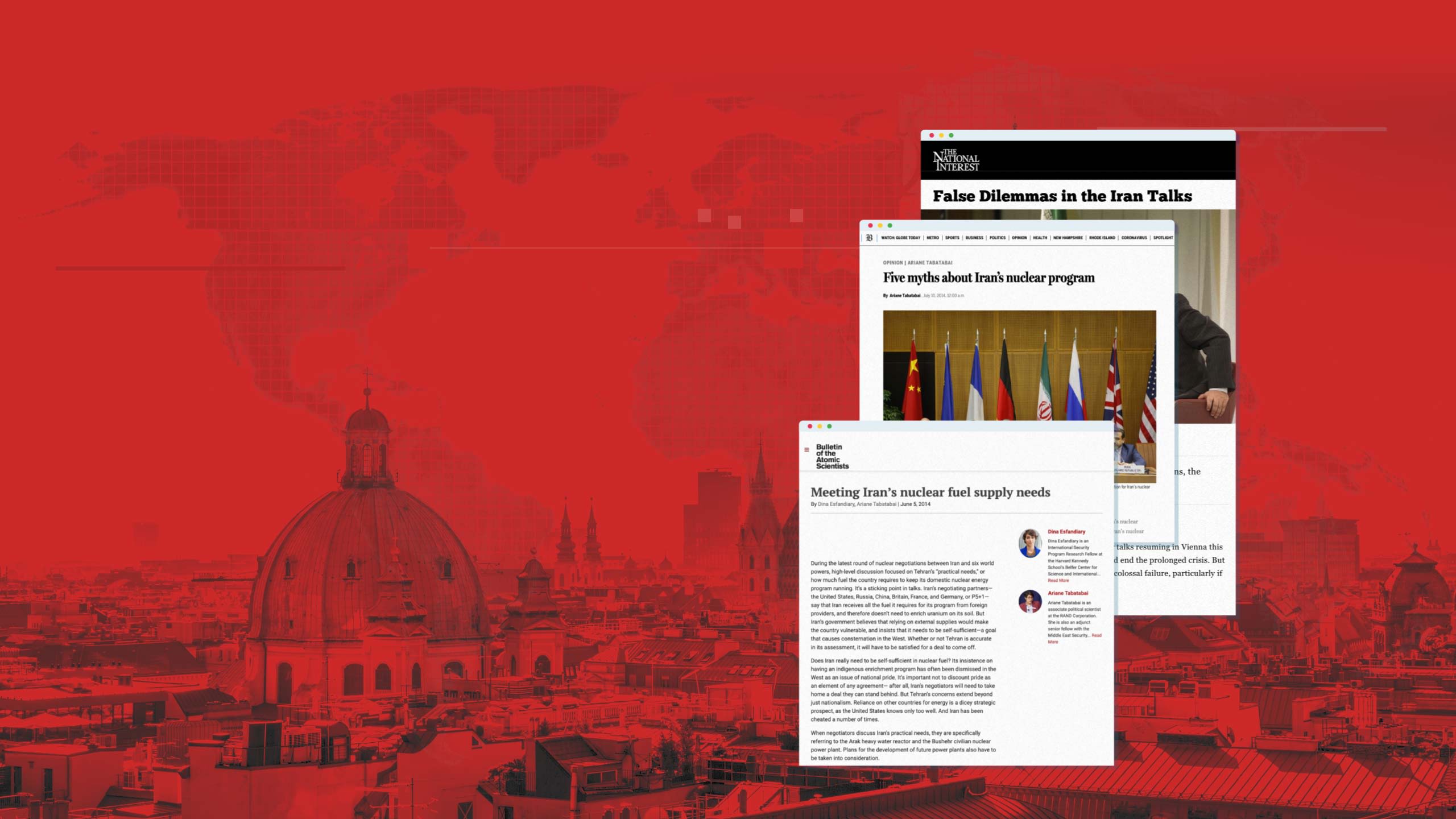
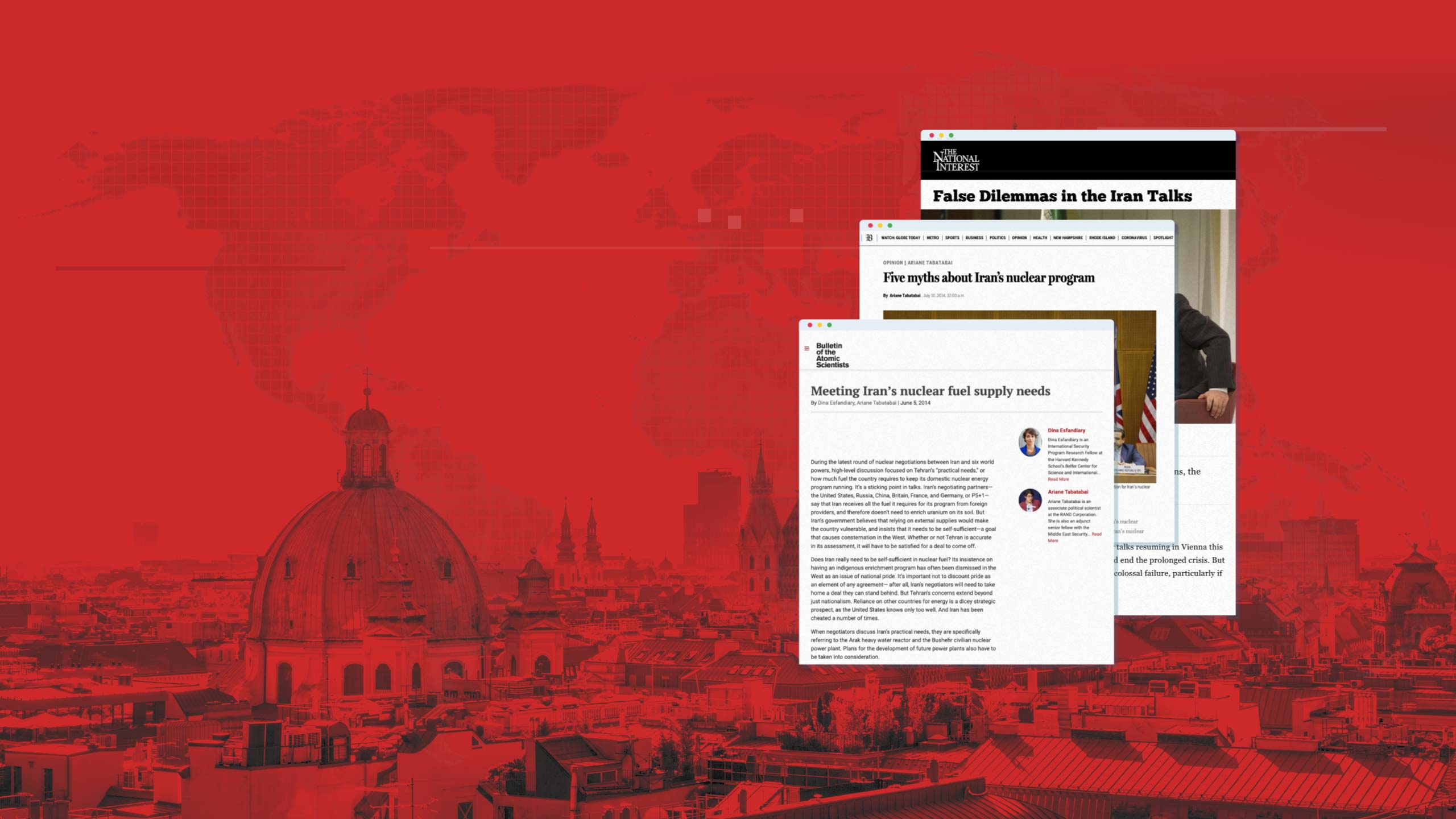
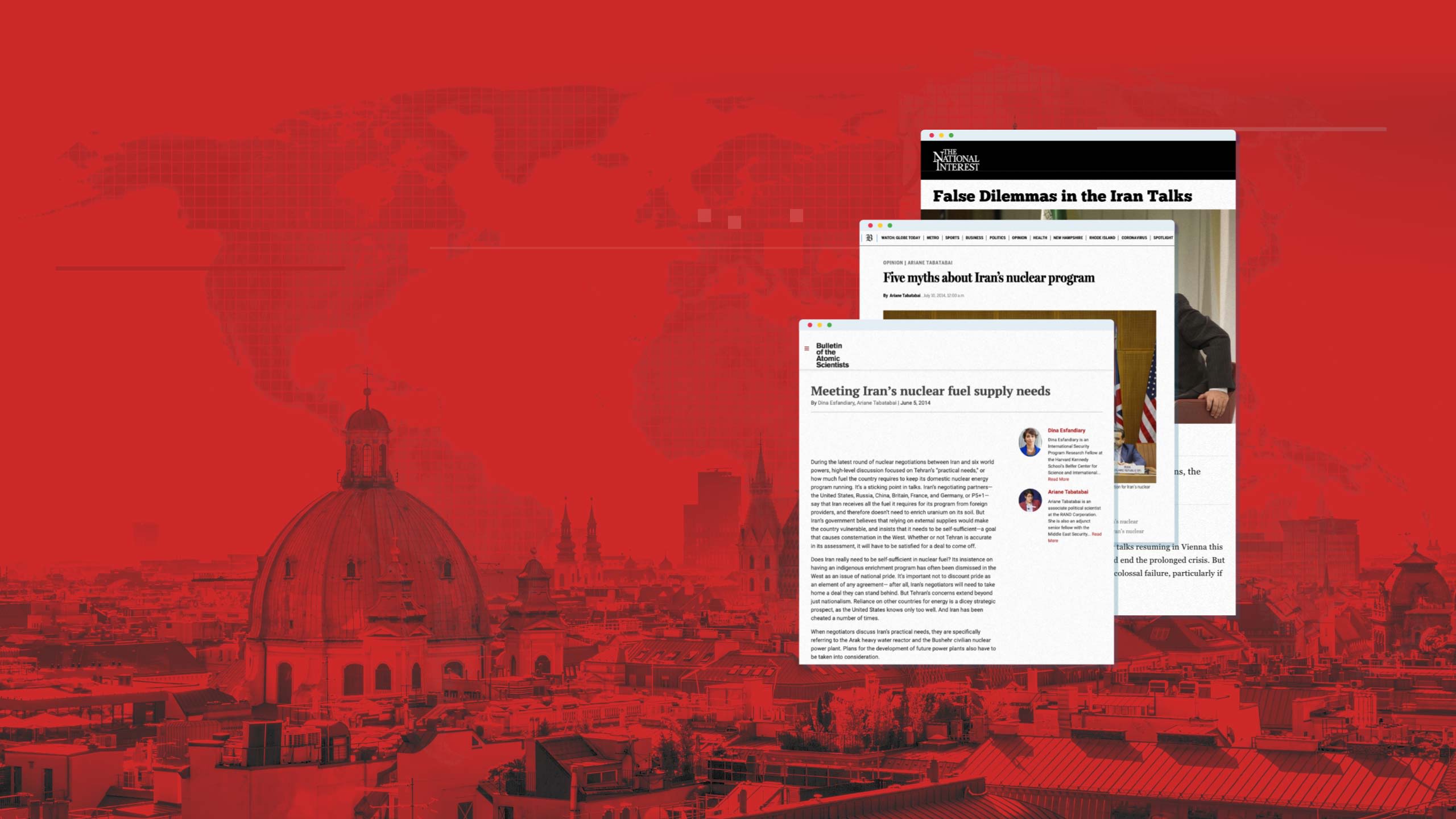
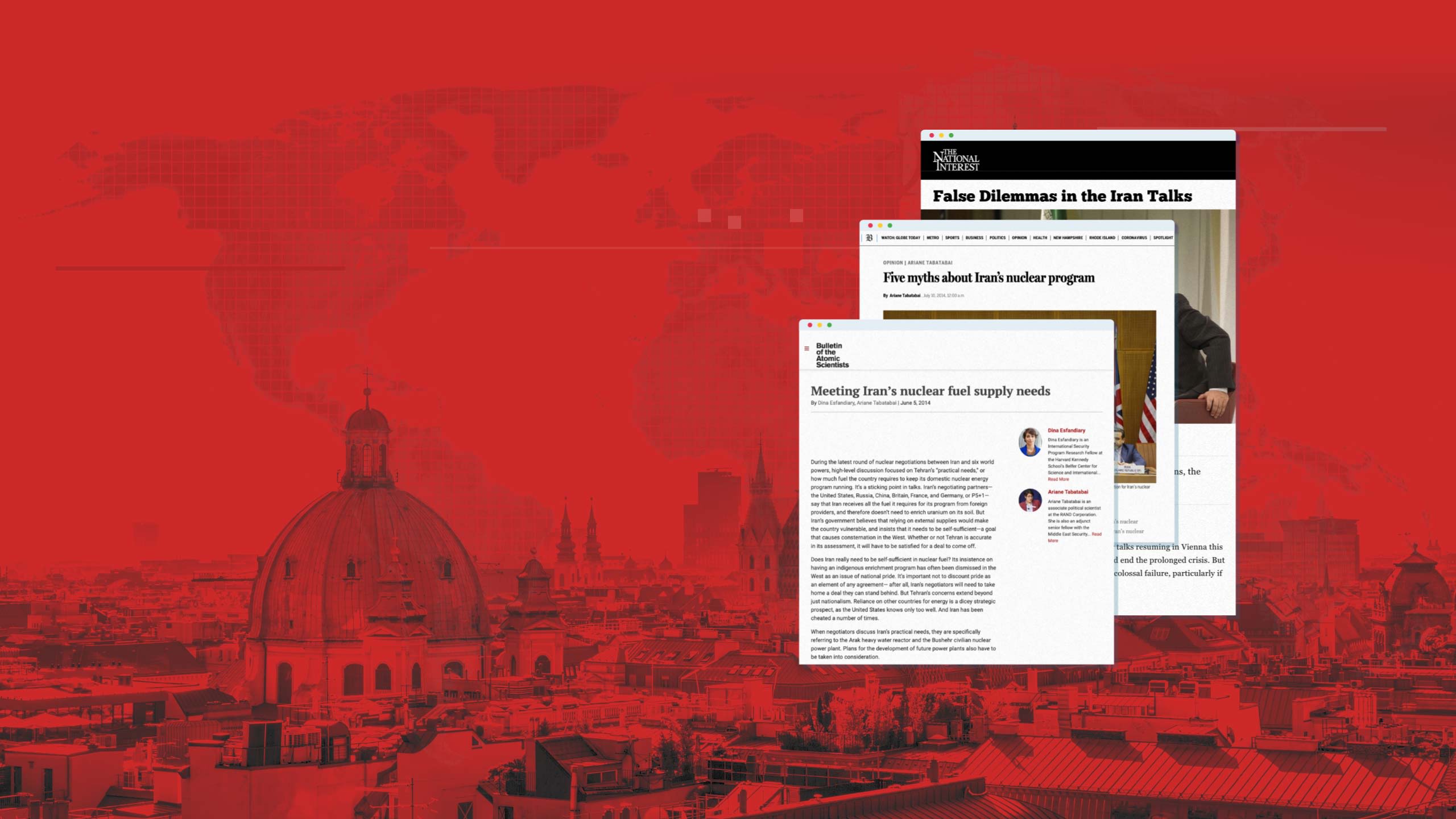
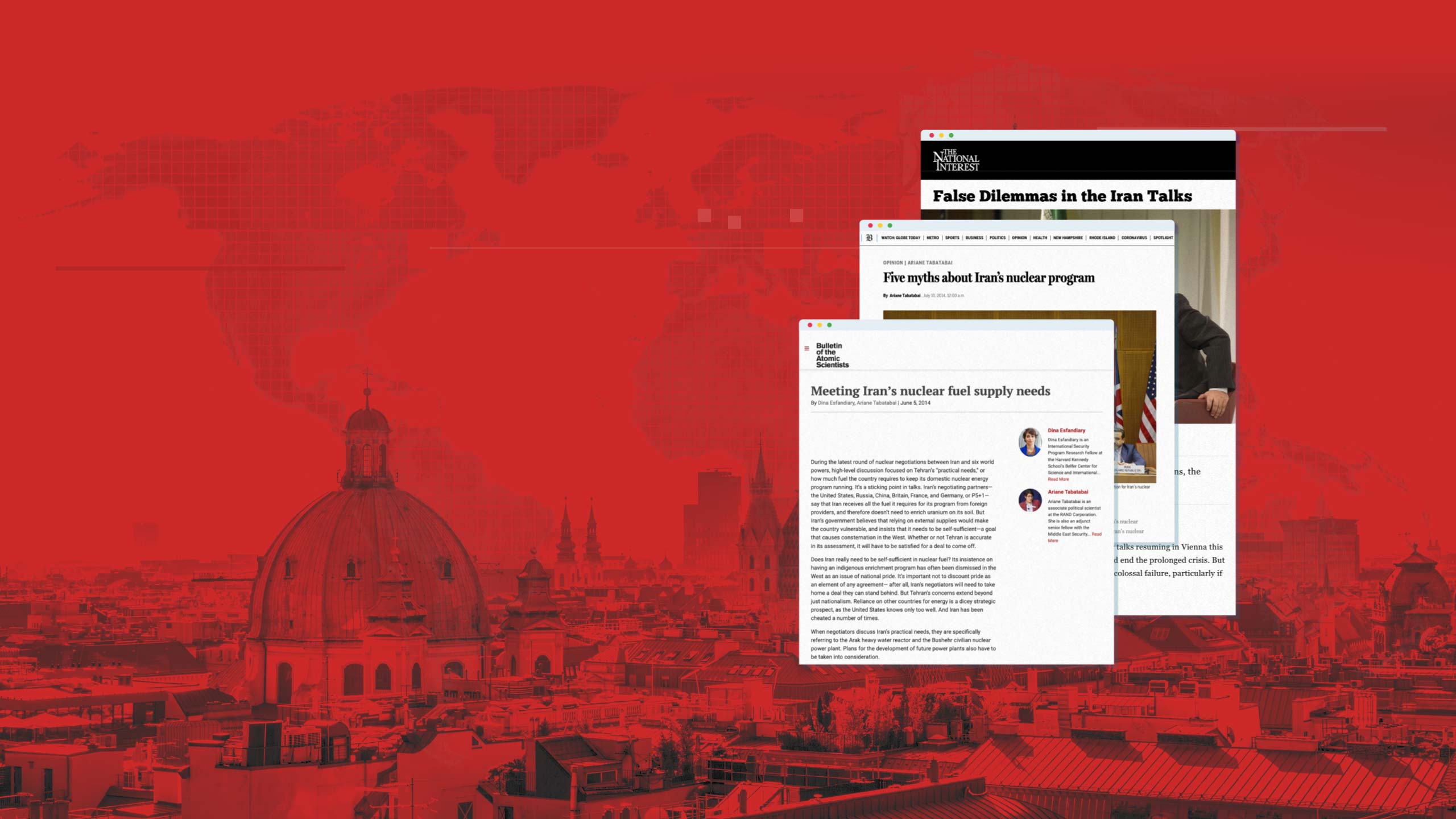
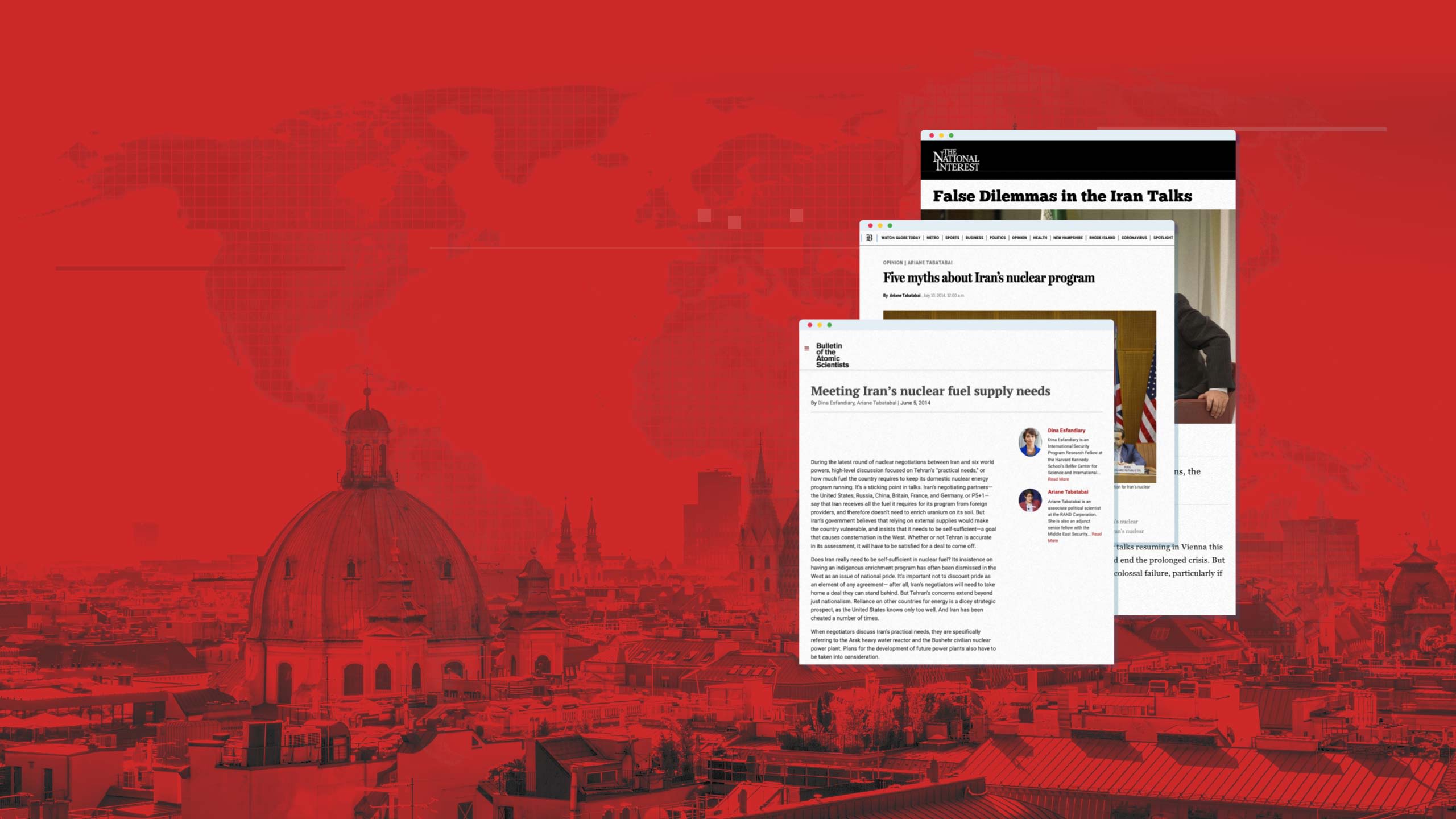
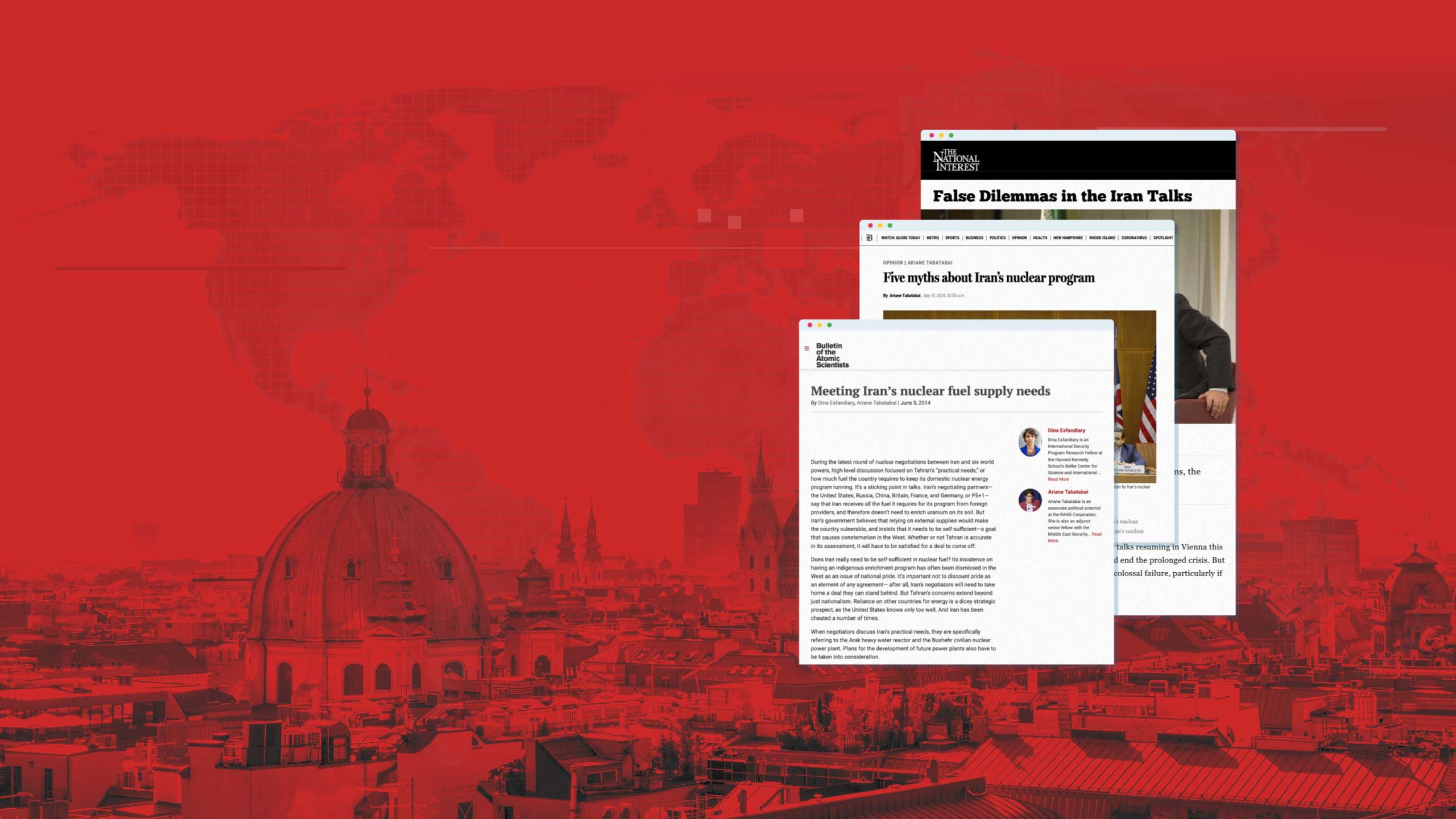
IEI and Nuclear Deal
The IEI’s activities accelerated in tandem with the intensification of the nuclear negotiations. On April 2, 2015, Iran and P5+1 reached a preliminary framework agreement for the nuclear deal, in Lausanne, Switzerland. The agreement was not yet concluded, and both parties still needed to advocate for the final terms, so the IEI network used all its resources to support Iran’s position and demands.
On April 14, 2015, Khatibzadeh emailed Zahrani a list of articles and interviews that members of the IEI had published “in the week after” the Lausanne agreement. He attached 10 separate Microsoft Word documents to the email each labeled with the name of an IEI member, including Ali Vaez, Ariane Tabatabai, Adnan Tabatabai, Dina Esfandiary, Ellie Geranmayeh, and Rouzbeh Parsi.
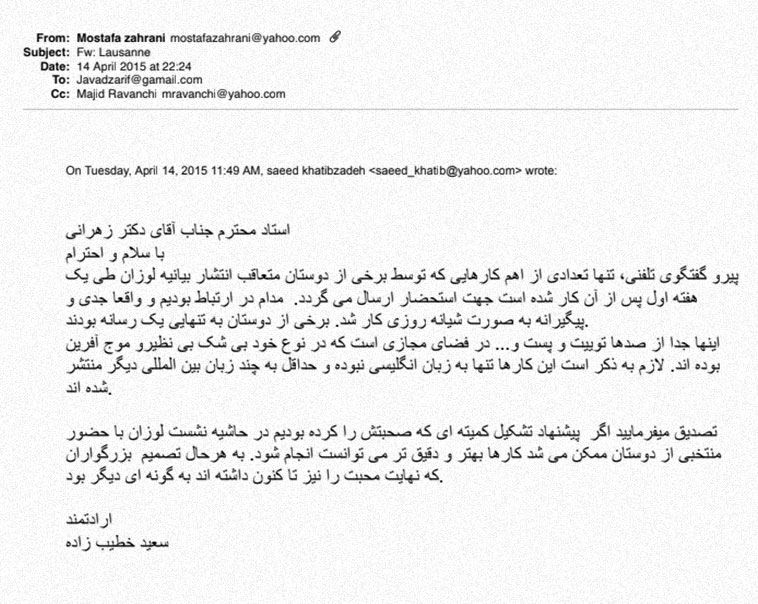
“I attached here for your review only a few of the most significant works some of our friends published during the week after the Lausanne framework agreement was reached. We were in constant contact and worked vigorously around the clock. Some friends performed as resourceful as a media outlet all by themselves,” Khatibzadeh told Zahrani in an email which was forwarded on the same day to Zarif and Takht-Ravanchi.
“These are in addition to hundreds of tweets, posts … on the internet that were definitely unique and trend-setting in their own right. It should be noted that these works were not only published in English, but also in several other international languages.”
Although Khatibzadeh claimed that the 10 individuals were collaborating with the foreign ministry to publish their articles and engage in debates, it is unclear if he was exaggerating the foreign ministry’s role.
The list compiled by Khatibzadeh showed that in almost a week, Ariane Tabatabai published four articles for outlets such as Foreign Policy, and gave interviews to the news website the Huffington Post and the Fars news agency, linked to the Islamic Revolutionary Guard Corps (IRGC), mostly supporting Iran's viewpoint.
In an article for the National Interest, co-written with Dina Esfandiary, they wrote that Iran was “too powerful” to be contained and that “Tehran doesn't need an agreement to be empowered and to strengthen its foothold in the region.”
Praising Zarif in an article for the Diplomat, Tabatabai referred to him and the IRGC Quds Force commander major-general Qassem Soleimani, who was killed in 2020 in a US airstrike in Baghdad, as “Iran’s most popular figures,” arguing they were “a sign of the flexibility and wide range of tools Iran has at its disposal.”
Soleimani was the architect of Iran’s interventions in the Middle East in recent decades, building proxy militias in Iraq, sending tens of thousands of fighters from Iran and other countries to Syria in support of Bashar al-Assad, expanding support for the Lebanese Hezbollah and preparing the Houthis in Yemen for a rebellion against the government at the time.
In the list compiled by Khatibzadeh to showcase how Ariane Tabatabai contributed to reinforcing Iran's position in the West, there are links to approximately a dozen interviews she gave to outlets, including NPR, BBC, France 24, and Al Jazeera. Khatibzadeh also mentioned she attended panels at Georgetown University and the Institut Prospective et Sécurité en Europe (IPSE).
Khatibzadeh compiled a separate sheet to demonstrate how instrumental Vaez was for the cause. This list contained quotes and interviews from nearly 20 outlets, such as Reuters, CBS, Bloomberg, the Atlantic, and the Financial Times, justifying Iran's position and its underlying rationale.
In the same email, Khatibzadeh said that the network's contribution could have been significantly greater if their work had been more centralized through a committee on the sidelines of Lausanne.
Tehran's Influence on Members

Western think tanks and universities embraced the newly opened channel of communication with Iranian officials through their young members. They organized joint workshops with the IPIS in Tehran, and their bustling events in Western capitals featured lectures and presentations from top Iranian officials, including Zahrani and Zarif.
However, some of the Iranian analysts, instead of acting as intermediaries, established undisclosed affiliations with Iranian officials and openly championed the Islamic Republic's standpoint in numerous events and debates.
In an email dated June 27, 2014, Ariane Tabatabai informed Zahrani that she had met in Turkey Saudi Prince Turki al Faisal - a former ambassador to the US - and he extended an invitation for her to visit Saudi Arabia and showed interest in collaborating. Tabatabai further inquired "I would like to know your opinion; would you be interested in this?”
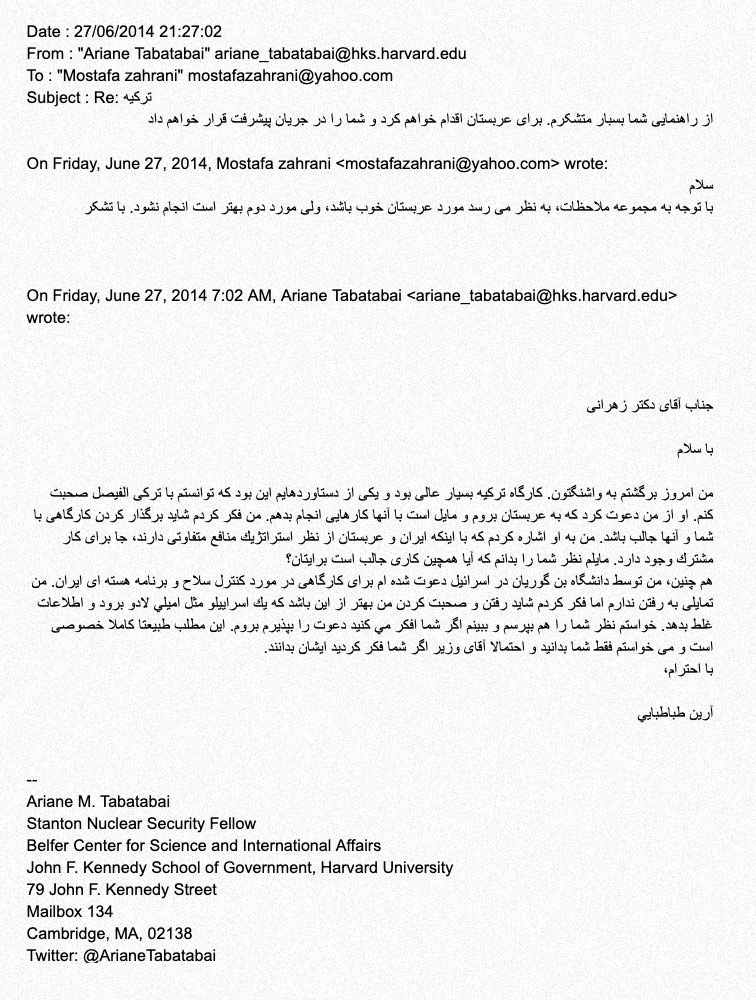
She also mentioned that Ben-Gurion University in Israel had invited her to a workshop on arms control and Iran's nuclear program. Ariane Tabatabai asked, " I would like to ask your opinion too and see if you think I should accept the invitation and go.”
Zahrani replied on the same day: “All things considered, it seems Saudi Arabia is a good case, but the second case [Israel] is better to be avoided.”
A few hours later Tabatabai replied “Thank you very much for your advice. I will take action regarding Saudi Arabia and will keep you updated on the progress.”
There’s no evidence Tabatabai went to the conference in Israel, though her books and research reports suggest she’s interviewed a number of senior Israeli officials. Ben-Gurion University did not reply to a request for comment.
Two weeks later, on July 10, 2014, Ariane Tabatabai received an email from Harvard University's Belfer Center, asking about her availability to attend a briefing for members of the Foreign Relations, Armed Services, and Intelligence Committees in Congress about the Iran nuclear deal alongside two Harvard academics – Gary Samore and William Tobey – whom she viewed as hawkish on Iran.
Tabatabai informed Zahrani on the same day about the event and asked for guidance: “I am scheduled to go to the Congress to give a talk about the nuclear program. I will bother you in the coming days. It will be a little difficult since both Will and Gary do not have favorable views on Iran.” Zahrani forwarded the email to Zarif two days later.
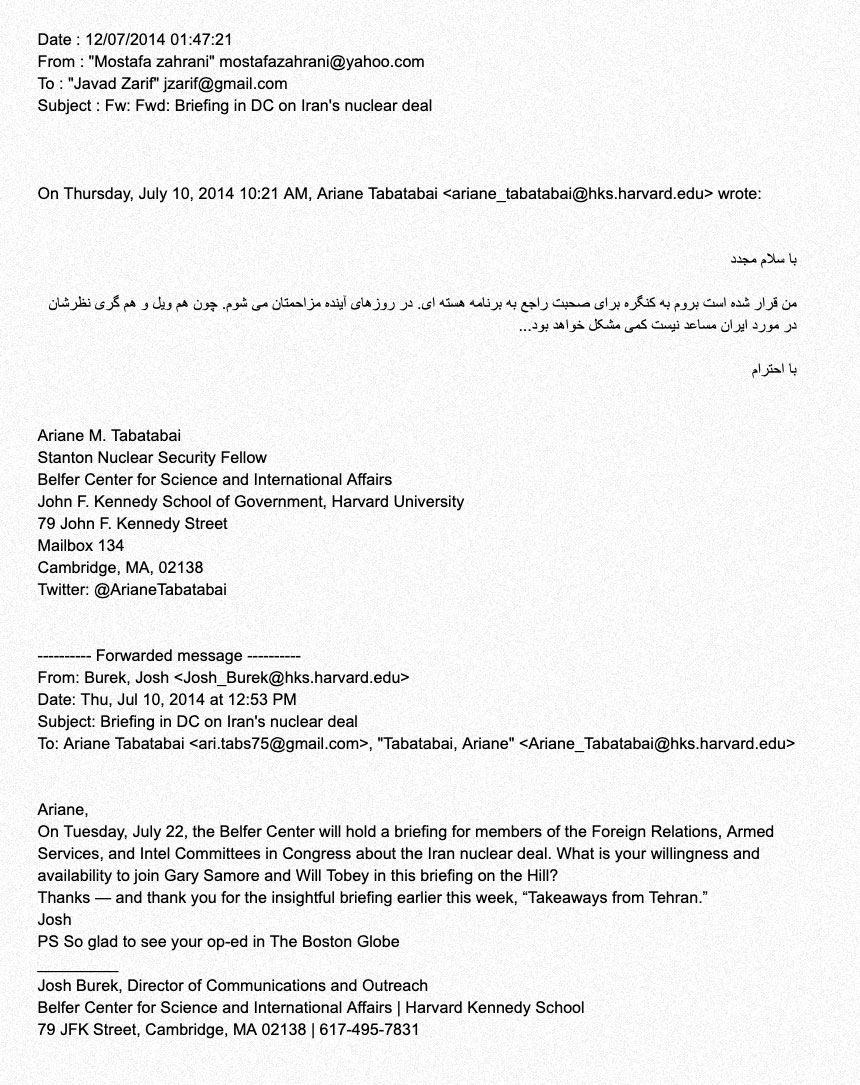
On June 2, 2014, Ariane Tabatabai attended a conference in Iran, her emails showed, and in the same trip discussed a project to work with the IPIS. It is not clear from the emails if this was an offer of paid or pro bono work.
“I would appreciate seeing you before meeting others to discuss your suggestion on proceeding with my project at the Institute for Studies," referring to the IPIS.
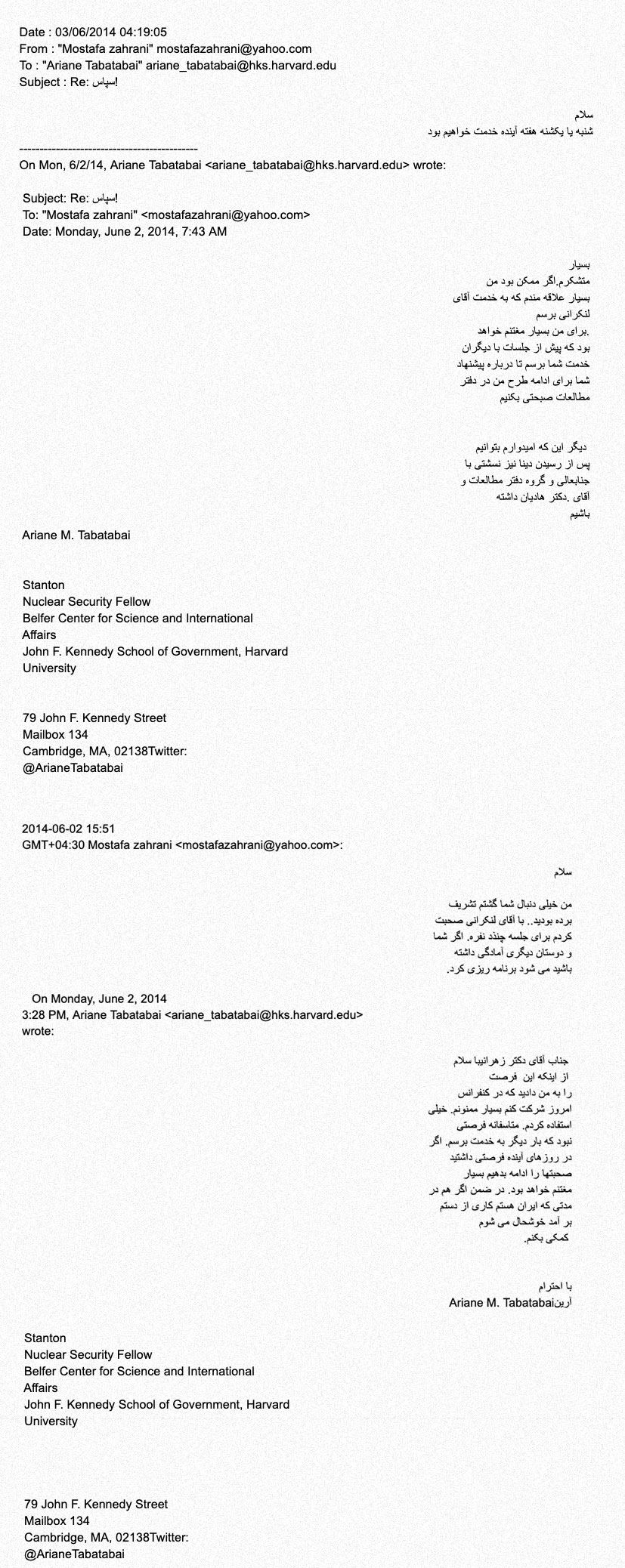
She has worked since 2022 for the United States Department of Defense and currently holds a clearance issued by the US government, but a former senior US official said a relationship of this nature between Ariane Tabatabai and a foreign government, especially Iran, should have precluded her from obtaining such a security clearance.
“Whether she registered as a foreign agent or not, she [shouldn’t] have been given a security clearance, because she was having these interactions with a hostile power in order to try to influence US policy,” he said.
Both the State Department and Pentagon declined to comment on the substance of the correspondence related to the IEI, but said they support Ariane Tabatabai and the vetting process involved in the approval of her security clearance. “Dr. Tabatabai was thoroughly and properly vetted as a condition of her employment with the Department of Defense,” the Pentagon said in a statement.
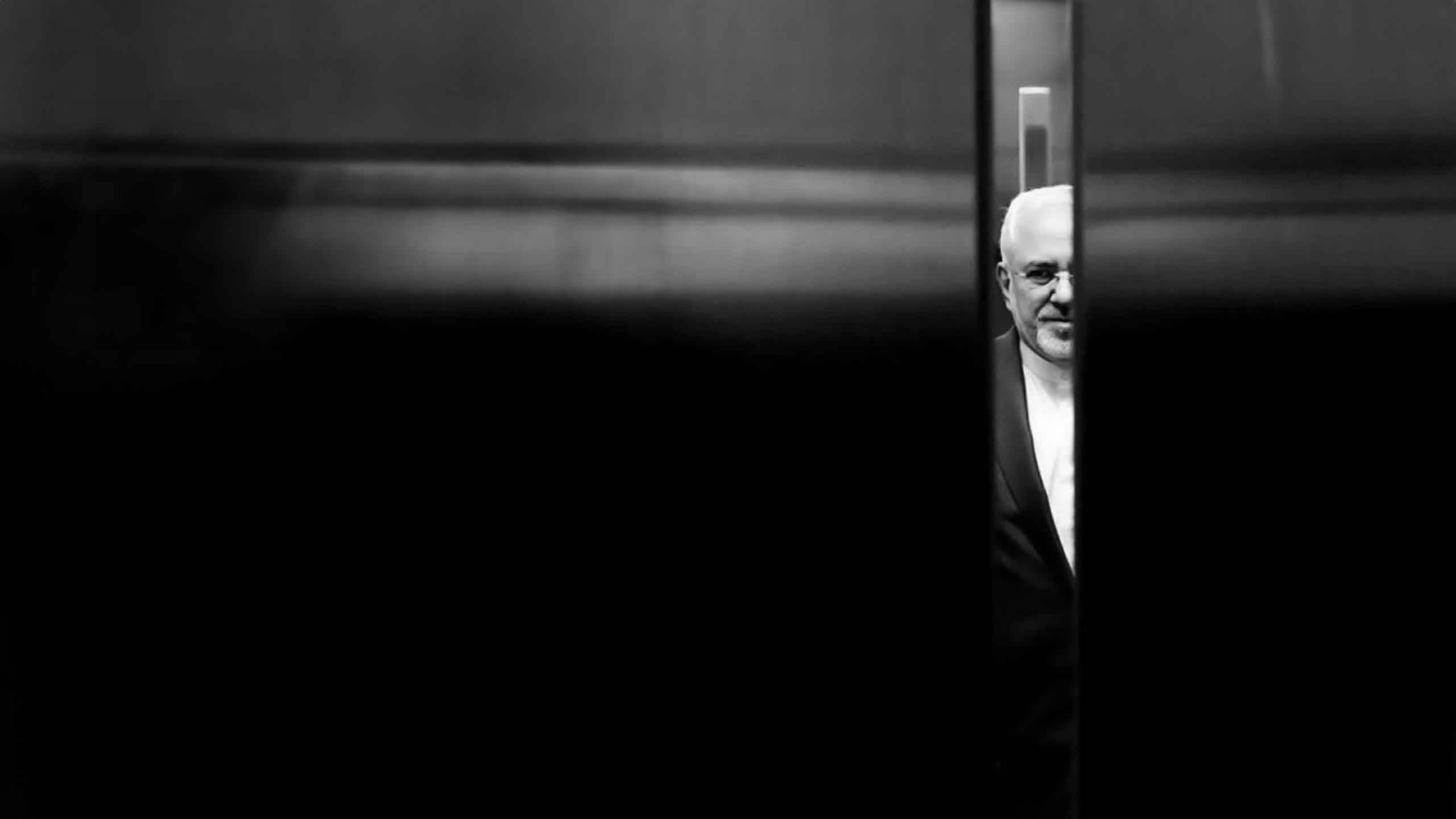
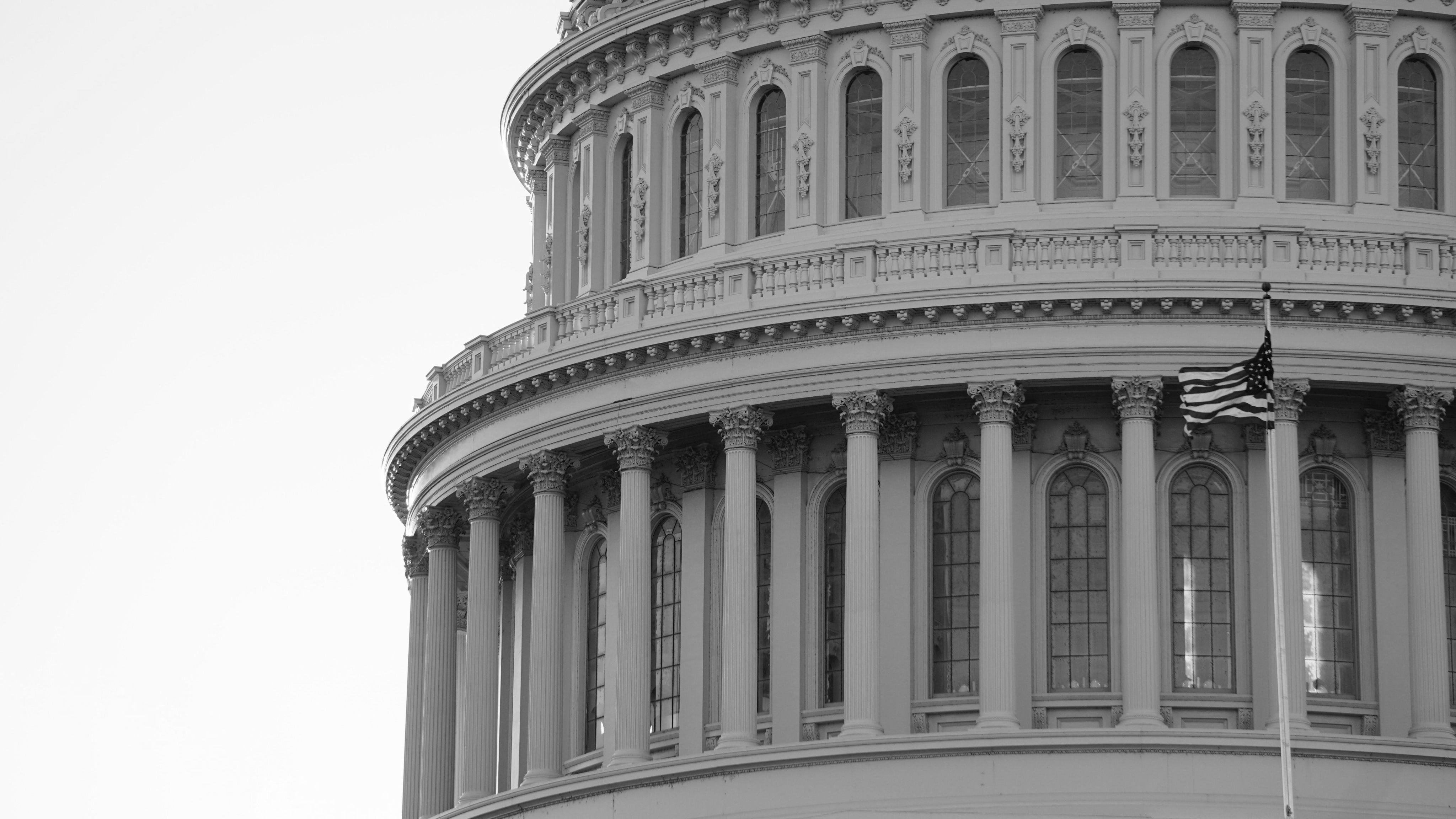
The Mastermind

American-educated diplomat Zahrani, or Torkzahrani, walked with a limp, a badge of pride that showed he had been injured in the war with Iraq in the 1980s when he joined the Revolutionary Guards, a force currently sanctioned as a foreign terrorist organization by the United States.
He worked at Iran's Permanent Mission in New York in 2001 and, according to a private speech to the IPIS members in 2020, a copy of which has been seen by Iran International, personally witnessed the collapse of the twin towers on September 11.
Zahrani campaigned against US foreign policy and its sanctions programs. His articles and speeches show he strongly believed that the perception of Iran as a fearsome danger, “created by American elites and media”, was illusory. He saw the establishment of the IEI as his best chance to challenge that narrative and even change it.
Running the IPIS also provided him with some opportunities. He used his friendship with analysts to get invited to top think tank events and tried to ask for publication of his papers in prestigious international outlets to raise his standing in Iranian universities.
On July 1, 2021, he sent one of his articles to Trita Parsi, brother of Rouzbeh, and executive vice president at Quincy Institute for Responsible Statecraft, and said he needed advice and help.
He wrote “The attached article written by me is to help me to become a full professor; if it is published in a journal with ISI ranking. Do you have any advise (sic) in this regard? My time is also short”.
Trita Parsi, former president of the National Iranian American Council (NIAC), a lobby group in the United States, asked for a Skype or Google Meet conversation to discuss the article and the “recent events”. Parsi did not respond to a request for comment.
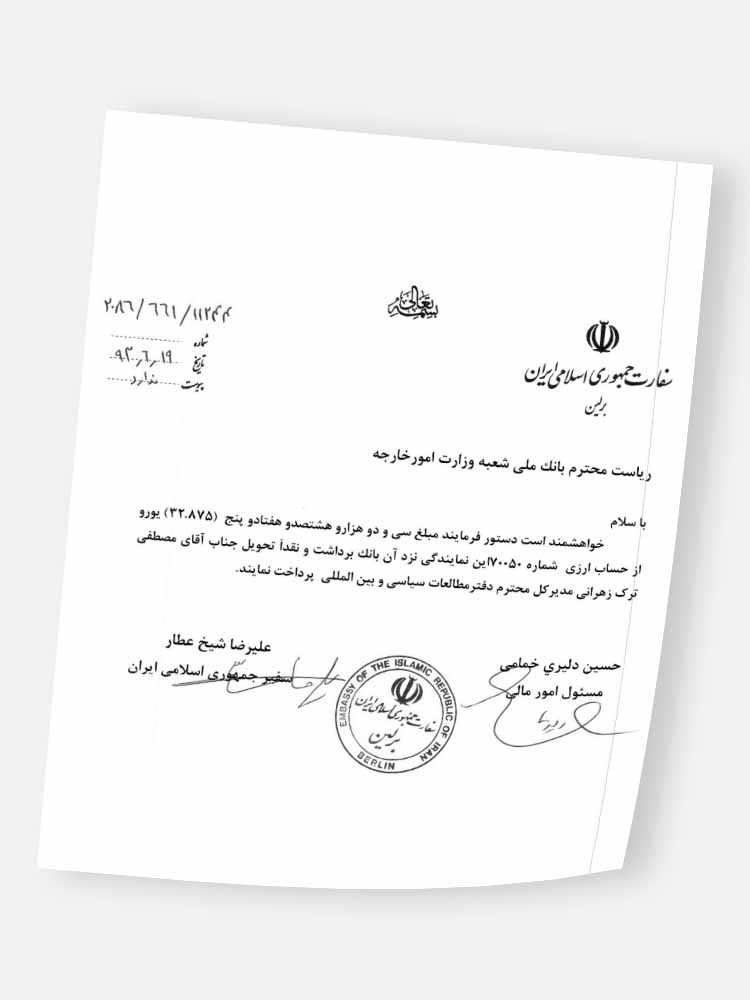
Current State
Zahrani’s high status and background afforded him the opportunity to recognize and appeal to the strong nationalistic inclinations among second-generation Iranians.
Iranian officials often use “nationalism” interchangeably to mean support for Islamic Republic’s policies. Otherwise, many Iranians, considering themselves as patriots, have argued that the nuclear program has been a disaster for the country, wasting billions of dollars and setting back development for decades.
Zahrani wrote in an email to Zarif on August 22, 2015 that he was amazed when Vaez, at the conference in Prague the night before “single-handedly” confronted a hawkish member of the US Congress, an Israeli official, and an Arab expert, and “shifted the atmosphere” with his “logical, courageous, … technical, professional and highly nationalistic” approach.
“I felt remorseful, telling myself, shame on me, as just a few hours ago, this person was begging me to return to his country, but I am afraid to fulfill his request."
However, for Zarif, this form of loyalty was not unfamiliar. A year earlier, on October 2, 2014, Vaez wrote to Zarif regarding his discontent with an ICG report on Iran, trying to clarify the situation and provide an explanation to him.
“As an Iranian, based on my national and patriotic duty, I have not hesitated to help you in any way; from proposing to Your Excellency a public campaign against the notion of [nuclear] breakout, to assisting your team in preparing reports on practical needs of Iran.”
Vaez then explained that the ICG’s reports were compiled through an organizational process and in a collaborative manner, implying that he did not have the final say in its publication.
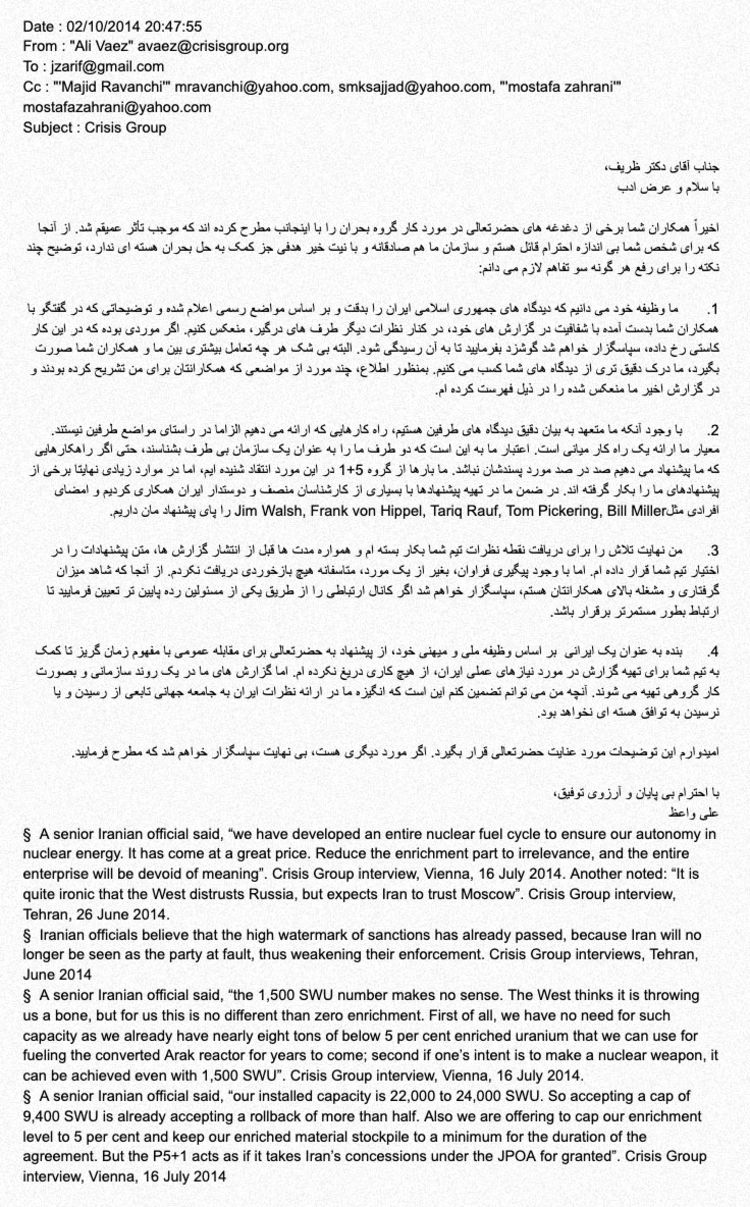
Adnan Tabatabai also wrote to Zarif on May 19, 2014, after the IEI meeting with him in Vienna: “As you will have noticed, we are all very much willing to dedicate our capacities and resources to jointly working on the improvement of Iran's foreign relations. Iran is our country, so we, too, feel the need and responsibility to contribute our share. When I say "we" I mean the very group you met.”
Zahrani called the IEI, “one of the fundamental initiatives of the IPIS”, while Khatibzadeh outlined his accomplishments in an email in 2016, emphasizing his endeavors to “build a network and … engage with think tanks, with a clear focus on the nuclear negotiations to advance Iran's foreign policy, at the highest level” and to “publish dozens of articles in line with” Iran’s foreign policy.
Khatibzadeh was appointed as the head of the IPIS in 2018, according to the foreign ministry’s website, and in 2020 as the ministry’s spokesman, serving under Zarif. He is currently Iran's ambassador to Croatia.
